November 27th 2023
Worse than the 1930s & Same Old Elite Arrogance In Charge.
Worse than the 1930s & Same Old Elite Arrogance In Charge by R J Cook.
During my time as a college lecturer and school teacher dealing with the subject of political history in the early 1980s, I was up against the Thatcherite and liberal feminist sensitivity readers and censors. Thatcher is history because Tony Blair took the police state to a much higher level.
I retired from the state education system when I became very aware that the politically correct headmaster was destroying the school which was borderline chaos. I had a quiet chat with the retiring headmaster in a farewell visit to his office, Welshman Ray Jones, who had seen army service, concerning his opinion of his school governor chosen replacement. He said : “ He has got all the jargon and will use it as a stepping stone for his next career move.”
This newcomer’s short reign ended with him doing a runner on health grounds a few years after my departure in 1996. The school was saved from special measures by some clever County Council footwork. A seconded governor and senior education officer informed me accordingly. This woman was well known to me. Among other things that upset bourgeois parents in the surrounding catchment area was putting Urdu on the curriculum – though since I was studying that language at the time to help my classroom teaching and so many Muslim pupils, I must confess to giving him that idea. I formed the impression that because the new head, from a failed Hillingdon school was Jewish, he went out of his way to please the ever expanding Muslim pupil population.
What the white liberal virtue signalling elite in the U.S, U.S and Europe cannot accept is that Islam is a pretty fanatical unreformed religion from another age, not a race. My history students were predominantly young middle class women. They did not want to hear hard talk and fact based analysis of the past. They wanted to teach me a lesson. I had the same experience teaching A level sociology which was basically feminist dogma by the time I became a small contra part of an oppressive education system. I had the same experience when I took a part time job as a journalist in the same town, Aylesbury Buckinghamshire.
I could relate many anecdotes from that era but must stick to the point. History and Sociology are dominant social engineering ideologies – and I so wish I had stuck to maths teaching which cannot be divorced from fact. So we are being brainwashed by government, their new media and educators. Related to this process are ever more laws and police officers on a globally agreed and integrated basis to control and punish ill fitting thoughts and actions.
This world wide global elite has the same mentality as their predecessors who brought us the last two official wars and this latest so far unnamed global carnage. The technology is ever more devastating, insidious and destructive. Imperialism is still a driving force, with elites welcoming what they package as ‘asylum seekers’ moving with entitlement into a rainbow world of multi cultures and equality. As Orwell might have said, if he were alive today, “Some cultures are more equal than others.”
This is why Tommy Robinson was arrested for attending the recent anti Semitism march and why the new elite left fear Geert Winders and Donald Trump because they care for their culture and its history. The elite have no interest in dealing with what is so horribly wrong with the way post imperial Africa is governed, why so may take their chances to get to the ‘easy life’ in U.S , Europe and U.S.
Cheap labour, profit and resources are what matters to them, along with blaming the helpless hopeless white working classes who have been broken by feminism and so called liberal dogma. Though their feudal and industrial revolution were no more than slaves, they must take the blame for slavery, not the likes of King Charles and their ancestors.
To argue is to be racist and we are not supposed to notice the rampant process of reverse colonialism leading to this so called far right protests in the Republic of Ireland where 20% of the population are foreign born and a recent mass knife attack on innocents is automatically labelled not terrorism. This sad situation makes a mockery of Ireland’s stupid centuries of religious bigotry and warfare. So as the third world influx of people with absolutely no interest in multi culture, with smug comfortable patronising smug virtue signalling idiots in charge, we are in a new world order where it is ‘Worse than the 1930s & With The Same Old White Elite Arrogance In Charge.’ World readers should note that this site is browser blocked beyond authority readers in the U.K. I am on a police watch list.
R J Cook.
| In depth: ‘Wilders is determined to go into government – but it’s not going to be easy’ |
 |
| For over two decades, Geert Wilders has been a notorious figure in Dutch politics. His extremist views on Islam, immigration and the EU have earned him a criminal conviction and pushed him to the fringes, but he has remained a consistent presence among Europe’s far right.Muslim organisations have expressed concern about Wilders’ victory: he has described Islam as the “ideology of a retarded culture” and a “backward religion”, and the Qur’an as “fascist”. Wilders also has a conviction for calling Moroccan people “scum”.Though Muslims make up about 5% of the population in the Netherlands, the PVV’s manifesto still includes a ban on mosques, the Qur’an and headscarves in government buildings. (In the run-up to the election, Wilders said that all policies will fall “within the law and constitution”.) Other policies he has promoted include holding a “Nexit” referendum to get the Netherlands out of the EU, and cutting financial and military support for Ukraine.After waiting in the wings for years, Wilders has found himself centre stage of political life in the Netherlands. Will he finally get his hands on power?Will Geert Wilders be the next prime minister?In short, probably not.The Netherlands has one of the most fragmented multiparty political systems in Europe. In this election alone, voters could choose from 26 political parties, 18 of which could enter parliament. No party has won a majority of seats in parliament in over a century.So what happens now? The leader of the largest party, in this case Wilders, has to see if he can form a majority coalition with other parties. The issue is that most of the major parties have already, unequivocally, ruled out forming a coalition with the PVV, particularly with Wilders as prime minister. “The last government took 271 days to form and that was relatively straightforward compared to what Wilders is up against, especially as he has been shut out of Dutch politics for so long”, Jon says. Wilders is not oblivious to these difficulties and has acknowledged the coalition challenge, saying: “I call on the parties … Now we will have to look for agreements with each other.”The only hope that remains for Wilders is the outgoing VVD party. During the campaign, the party’s leader, Dilan Yeşilgöz-Zegerius, said that she was keeping the door open to working with Wilders. Critics said that she was legitimising Wilders and the PVV. The plan to scoop some of the PVV’s voters backfired and many now view the refusal to condemn Wilders as a terrible strategic mistake, but even Yeşilgöz-Zegerius has said that she will not enter a coalition if Wilders is the prime minister. Either way, any coalition that includes the PVV will significantly dilute or completely abandon their most extreme policies.There have also been strong suggestions that the VVD could enter negotiations with Wilders, only to pull out after three to four months, collapsing the process and forcing another election. The other option is some kind of deal where the PVV is outside the coalition but provides parliamentary support in exchange for their policies being put on the agenda as well.And finally, there is, in theory, a possibility that all three major political parties, the VVD, the leftwing bloc, and the NSC, alongside other parties, could form a government. “So there are a few constellations that are theoretically possible, but they are all impractical”, Jon says.“Wilders is clearly determined this time to go into government and, with such a large victory, it is going to be hard to deny”, Jon says. “But that doesn’t mean that it’s going to be easy for him”.The far-right in EuropeFar-right parties across Europe have been “delighted” by the result, Jon says. Populist leaders have congratulated Wilders: Hungary’s far-right prime minister, Viktor Orbán, prematurely announced Wilders’ victory, adding that the results showed “the winds of change are here!”. France’s Marine Le Pen said that Wilders’ shock win “confirms the growing attachment to the defence of national identities”. And Belgian far-right leader Tom Van Grieken proclaimed that “parties like ours are coming all over Europe!”.Like Wilders, these leaders have managed to gain more support by diversifying their list of grievances: “For a long time the far-right hobby horse was immigration, Islam and the EU. They’ve added to that fears and concerns about the cost of living crisis, about the green transition and about the cost of the war in Ukraine”, Jon says. One person told the Guardian their reason for voting for the PVV was mainly about the cost of living: “While he said enough is enough he is right, enough is enough. We pay too much tax, too much for healthcare, too much for rent. We can’t take it any more.”Regardless of whether Wilders is able to form a coalition, his win confirms that “the far right is on an upward curve, with occasional setbacks”, Jon says. Despite recent losses in Spain and Poland, generally the far right has been gaining ground all over Europe: in Italy, Finland, Sweden, Austria and Greece. Many parties will look at this result as confirmation that the political winds are going in their favour. |
November 26th 2023
“We continue to count on the Netherlands’ strong participation in the European Union,” European Commission spokesperson Eric Mamer told reporters on Thursday. But as the bloc’s Euroskeptic wing sees it, Wilders’ victory has reinvigorated Europe’s populist right at a time when many believed it was losing support

For decades, the hard-right firebrand Geert Wilders has been shunned from mainstream Dutch politics. So when the results from the Netherlands’ snap election showed his Party for Freedom (PVV) emerging as the largest party, even he could hardly contain his shock. “35!” Wilders exclaimed in apparent disbelief, his arms outstretched, as the exit polls flashed the party’s projected seat count on the screen. (That forecast has since risen to 37 seats, putting the PVV well ahead of its main center-left and center-right rivals, which won 25 and 23 seats, respectively.)
While Wilders’ first-place performance puts him in a strong position as the parties enter into coalition talks, the prospect of him entering the Dutch government, let alone leading it as prime minister, is not a foregone conclusion. That will ultimately depend on whether any of the other 15 parties elected to Parliament are willing to enter into coalition with Wilders, which some parties, including the second-place Labor-Green alliance, have ruled out.
But regardless of whether the far-right leader wins power, or in what capacity, the outcome of the Dutch elections is particularly bad news for the European Union, which alongside Islam and immigration remains one of Wilders’ ideological bogeymen. In addition to campaigning for a Brexit style “Nexit” referendum, Wilders also advocates ending the free movement of labor within the E.U. and, perhaps most concerning of all for the bloc, cutting military aid to Ukraine. Nationalist leaders as far afield as Austria, Belgium, Italy, France, Germany, and Spain all rejoiced at the prospect of another nationalist, anti-establishment voice joining their ranks.
Analysts who spoke with TIME say that the prospect of the Netherlands ending its military aid to Ukraine outright remains unlikely, with or without Wilders in power. Indeed, the Dutch government recently allocated an additional 2 billion euros in military aid, bringing the Hague’s total support for Ukraine to roughly 7.5 billion euros. “I presume that probably won’t happen, depending on how the coalition works out,” Ben Coates, the author of Why the Dutch are Different, tells TIME in a phone call. “But I think that’s a dangerous moment for the E.U. and for Ukraine when that starts to become an election-winning issue.”
While observers credit Wilders’ campaigning on salient issues such as immigration and the cost of living as part of the reason he was able to command such unexpected support, the scale of his victory can also be attributed at least, in part, to the approach of his center-right rivals, who not only helped amplify his signature issue (outgoing Prime Minister Mark Rutte’s successor Dilan Yesilgöz, herself a former refugee, pledged to cut immigration if elected) but even opened the door to working alongside Wilders in coalition. In doing so, the center-right had perhaps hoped to outflank Wilders among right-wing voters. By treating Wilders as a viable coalition partner, however, they appear to have achieved just the opposite.
Should Wilders enter the Dutch government, “there will be a much tougher line on spending and the treaties that are agreed in the E.U. on immigration and asylum policy,” says Coates, noting that Brussels would almost certainly find itself with a much more difficult partner in the Netherlands than it’s had in the last 13 years under Rutte. But even if Wilders is excluded from government and the country ends up with a more left-leaning coalition, such as one led by former European Commissioner Frans Timmermans, Coates says he will still be able to “steer the debate and frame it in such a way that [makes] it tricky for Dutch politics to come out strongly pro-Europe at this point.”
What sway Wilders will ultimately have on the Netherlands—and, by extension, Europe—will ultimately be determined by the outcome of the coalition talks, which are expected to be a months-long affair. Sarah de Lange, a politics professor at the University of Amsterdam, tells TIME in a phone call that although the exclusion of the largest party from government is not without precedent, the scale of Wilders’ victory would make such a gambit extremely difficult. “It will mean that this coalition will very likely include four, if not five, parties,” she says, which would make the government vulnerable to division. It also risks creating a legitimacy crisis that Wilders could exploit. “Even though these parties might exclude him from government, that might mean that his voters become even more dissatisfied with democracy and its workings because they’re the largest party and they’re being excluded,” says de Lange, “which matches the populist narrative of the idea that there is a political elite that’s trying to keep him from power.”
If Brussels is worried about the hard-right’s rise in the Netherlands and what it portends for next year’s European elections, it isn’t showing it. “We continue to count on the Netherlands’ strong participation in the European Union,” European Commission spokesperson Eric Mamer told reporters on Thursday. But as the bloc’s Euroskeptic wing sees it, Wilders’ victory has reinvigorated Europe’s populist right at a time when many believed it was losing support.

“The winds of change are here!” Hungarian Prime Minister Viktor Orban said in a celebratory post. In response, one social media user said: “Let’s hope that the wind will blow all over Europe.”
More Must-Reads From TIME
- Introducing the TIME100 Climate List
- What Fuels Max Verstappen’s Formula One Success
- What My Family Taught Me About Loneliness
- U.S. Doctors Can’t Be Silent About Gaza: Column
- Inside COP28’s Big ‘Experiment’
- The Movie Wives Would Like a Word
- The 100 Must-Read Books of 2023
- Want Weekly Recs on What to Watch, Read, and More? Sign Up for Worth Your Time
November 20th 2023
Welcome to Balance of Power, bringing you the latest in global politics. If you haven’t yet, sign up here.The race for Argentina’s presidency was neck-and-neck, the polls suggested. But when it came down to it, a beleaguered electorate backed the change candidate in droves.In overwhelmingly voting for Javier Milei yesterday, Argentines not only delivered a snub to Economy Minister Sergio Massa, holder of the incumbent Peronist party torch who oversaw the crisis that has left the public shouldering one of the world’s most punishing inflation rates.They put their hopes in a libertarian radical and political novice whose solutions to the South American nation’s malaise are untested and may prove unworkable. Milei’s policy proposals are as drastic as they are striking: ditching the peso for the US dollar; closing the central bank; taking an axe — or in Milei’s case, a chainsaw — to public spending; shunning Brazil and China, Argentina’s two biggest trading partners.Yet the signal from a wearied public is unmistakable — anything is preferable to the current torture.It’s a message we’ve heard before, from the UK’s decision to quit the European Union to Chile’s election of a student activist as its youngest-ever president, as voters shrugged off establishment warnings of disaster in favor of pursuing extreme paths, even at the risk of harming their own interests.That kind of blow-it-all-up approach to democracy is worth bearing in mind as the world heads into the busiest electoral calendar in at least a decade next year, book-ended by votes in Taiwan in January and the US in November, with former President Donald Trump threatening to return to the White House.Those elections take place with a bleak economic outlook, contributing to widespread voter volatility.That means pricing in unexpected political outcomes — even if at face value they appear to make little sense.For if Argentina shows us anything, it’s that the taste for electoral upheaval is undiminished. — Alan CrawfordWATCH: Javier Milei speaks after winning Argentina’s presidency. Source: Bloomberg Milei’s policy proposals are as drastic as they are striking: ditching the peso for the US dollar; closing the central bank; taking an axe — or in Milei’s case, a chainsaw — to public spending; shunning Brazil and China, Argentina’s two biggest trading partners.Yet the signal from a wearied public is unmistakable — anything is preferable to the current torture.It’s a message we’ve heard before, from the UK’s decision to quit the European Union to Chile’s election of a student activist as its youngest-ever president, as voters shrugged off establishment warnings of disaster in favor of pursuing extreme paths, even at the risk of harming their own interests.That kind of blow-it-all-up approach to democracy is worth bearing in mind as the world heads into the busiest electoral calendar in at least a decade next year, book-ended by votes in Taiwan in January and the US in November, with former President Donald Trump threatening to return to the White House.Those elections take place with a bleak economic outlook, contributing to widespread voter volatility.That means pricing in unexpected political outcomes — even if at face value they appear to make little sense.For if Argentina shows us anything, it’s that the taste for electoral upheaval is undiminished. — Alan CrawfordWATCH: Javier Milei speaks after winning Argentina’s presidency. Source: Bloomberg |
| Global Must Reads |
The seizure of a Japanese-chartered vessel in the Red Sea by Iran-backed Houthi rebels in Yemen is raising fears that the Israel-Hamas war could lead to shipping disruptions in the region. A Houthi spokesperson said yesterday the group will continue to target Israeli ships until the military operation in Gaza ends, while Tehran denied any role in the attack. European natural gas prices jumped.Israeli forces engaged in heavy fighting with Hamas in the northern Gaza Strip overnight as the US said it was optimistic about a deal to free hostages held by the militant group. Top foreign policy officials from Saudi Arabia, Jordan, Egypt and the Palestinian Authority are visiting Beijing today and tomorrow for talks on deescalating the conflict. A woman tries to salvage personal items from a home hit by an Israeli bombardment in Rafah yesterday. Photographer: Said Khatib/AFP/Getty ImagesUS Defense Secretary Lloyd Austin arrived in Kyiv today pledging support for Ukraine’s battle against Russia “now and into the future.” With fighting continuing to rage along the front line, Ukrainian President Volodymyr Zelenskiy dismissed the head of the military’s medical support service and called for a “fundamentally new” level of care for wounded troops.South Korea warned Pyongyang to halt a rocket launch it sees violating United Nations Security Council resolutions. Officials in Seoul believe the launch could help North Korea refine its target lists as it rolls out new missiles designed to deliver nuclear strikes in South Korea and Japan, which host the bulk of the US’s military personnel in the region.Plans to cut Britain’s tax burden from a post-World War II high are set to be laid out by UK Chancellor of the Exchequer Jeremy Hunt in Wednesday’s Autumn Statement, a pivotal time for the struggling Conservatives before a general election expected next year. Hunt said yesterday he wants to “show there is a path to a lower-tax economy” while also safeguarding progress in reducing inflation.Taiwan’s presidential frontrunner named the island’s former envoy to the US as his running mate, a sign he aims to bolster ties with Washington if elected.Elon Musk railed against “bogus” media reports accusing him of antisemitism, issuing his strongest response yet after endorsing antisemitic content in a post on X that provoked outrage and alienated advertisers like Apple.Rosalynn Carter, who broke new ground as an activist US first lady by attending her husband Jimmy Carter’s cabinet meetings and leading a presidential effort to improve care for the mentally ill, died peacefully at her home in Plains, Georgia, at the age of 96. A woman tries to salvage personal items from a home hit by an Israeli bombardment in Rafah yesterday. Photographer: Said Khatib/AFP/Getty ImagesUS Defense Secretary Lloyd Austin arrived in Kyiv today pledging support for Ukraine’s battle against Russia “now and into the future.” With fighting continuing to rage along the front line, Ukrainian President Volodymyr Zelenskiy dismissed the head of the military’s medical support service and called for a “fundamentally new” level of care for wounded troops.South Korea warned Pyongyang to halt a rocket launch it sees violating United Nations Security Council resolutions. Officials in Seoul believe the launch could help North Korea refine its target lists as it rolls out new missiles designed to deliver nuclear strikes in South Korea and Japan, which host the bulk of the US’s military personnel in the region.Plans to cut Britain’s tax burden from a post-World War II high are set to be laid out by UK Chancellor of the Exchequer Jeremy Hunt in Wednesday’s Autumn Statement, a pivotal time for the struggling Conservatives before a general election expected next year. Hunt said yesterday he wants to “show there is a path to a lower-tax economy” while also safeguarding progress in reducing inflation.Taiwan’s presidential frontrunner named the island’s former envoy to the US as his running mate, a sign he aims to bolster ties with Washington if elected.Elon Musk railed against “bogus” media reports accusing him of antisemitism, issuing his strongest response yet after endorsing antisemitic content in a post on X that provoked outrage and alienated advertisers like Apple.Rosalynn Carter, who broke new ground as an activist US first lady by attending her husband Jimmy Carter’s cabinet meetings and leading a presidential effort to improve care for the mentally ill, died peacefully at her home in Plains, Georgia, at the age of 96. |
| Washington Dispatch |
| President Joe Biden turns 81 today, a celebration that will underscore how age has become his greatest liability as he pursues a reelection campaign that will involve a likely rematch with his predecessor, Trump.While the White House insists that Biden remains healthy enough to serve as commander in chief, recent polls show him trailing Trump in key swing states, with voters citing deep concerns about his health and acuity. A Bloomberg News/Morning Consult survey this month found voters in seven swing states are more likely to associate old age with Biden than any other topic. In an open-ended question asking what they had heard about the candidates lately, hundreds of respondents cited Biden’s age. Fewer than a dozen did the same for Trump, who is 77.Biden himself has taken to handling the topic of his age with a light touch. He makes regular quips suggesting he’s been in Washington since the days of the Founding Fathers.One person to watch today: Former United Nations Ambassador Nikki Haley, who has been rising in the polls of the Republican presidential race, holds town halls in New Hampshire.Sign up for the Washington Edition newsletter for more from the US capital and watch Balance of Power at 5pm ET weekdays on Bloomberg Television. |
| Chart of the Day |
 The crisis engulfing Europe’s wind industry is proving to be a wake-up call: things have to change radically to make progress on what’s a key part of the climate transition. A flood of negative headlines have dominated recently. The EU says “immediate action” is needed and plans to speed up permits for wind projects, the UK has bumped up the support price for new offshore farms and Germany will make it easier for green energy firms to get on the grid. The crisis engulfing Europe’s wind industry is proving to be a wake-up call: things have to change radically to make progress on what’s a key part of the climate transition. A flood of negative headlines have dominated recently. The EU says “immediate action” is needed and plans to speed up permits for wind projects, the UK has bumped up the support price for new offshore farms and Germany will make it easier for green energy firms to get on the grid. |
| And Finally |
African governments are scrambling for dollars. Amid a deepening shortage of hard currency on the continent, governments are turning to bartering, currency devaluations, central bank exchange controls, and help from the International Monetary Fund and Middle East to shore up their balance sheets. Investors are rewarding nations whose efforts to boost dollar liquidity are paying off and punishing those that can’t guarantee access to the greenback. A street currency dealer in Lagos, Nigeria. Photographer: Benson Ibeabuchi/BloombergThanks to the 28 people who answered the Friday quiz and congratulations to Tina Nolte for being the first to name Ukraine as the country former UK Prime Minister David Cameron chose for his first trip abroad since returning as foreign secretary. A street currency dealer in Lagos, Nigeria. Photographer: Benson Ibeabuchi/BloombergThanks to the 28 people who answered the Friday quiz and congratulations to Tina Nolte for being the first to name Ukraine as the country former UK Prime Minister David Cameron chose for his first trip abroad since returning as foreign secretary. |
| More from Bloomberg Check out our Bloomberg Investigates film series about untold stories and unraveled mysteries Bloomberg Opinion for a roundup of our most vital opinions on business, politics, economics, tech and more Cyber Bulletin for coverage of the shadow world of hackers and cyber-espionage Economics Daily for what the changing landscape means for policy makers, investors and you Green Daily for the latest in climate news, zero-emission tech and green finance Explore more newsletters at Bloomberg.com. |
Ukraine in maps: Tracking the war with Russia
By The Visual Journalism Team
BBC News
Ukraine’s counter-offensive has now been under way for more than four months and may have now achieved a breakthrough ahead of the usually harsh winter.
Here are the latest developments:
- Ukraine says its forces have gained a foothold on the eastern bank of the Dnipro river – potentially allowing it to transfer vital equipment across the river
- Russia has been focusing its efforts on eastern Ukraine with fighting continuing around Bakhmut and near Donetsk

Ukraine’s claims foothold across river
Ukrainian forces say they have gained a foothold on the eastern bank of the Dnipro river about 30km (19 miles) from the city of Kherson.
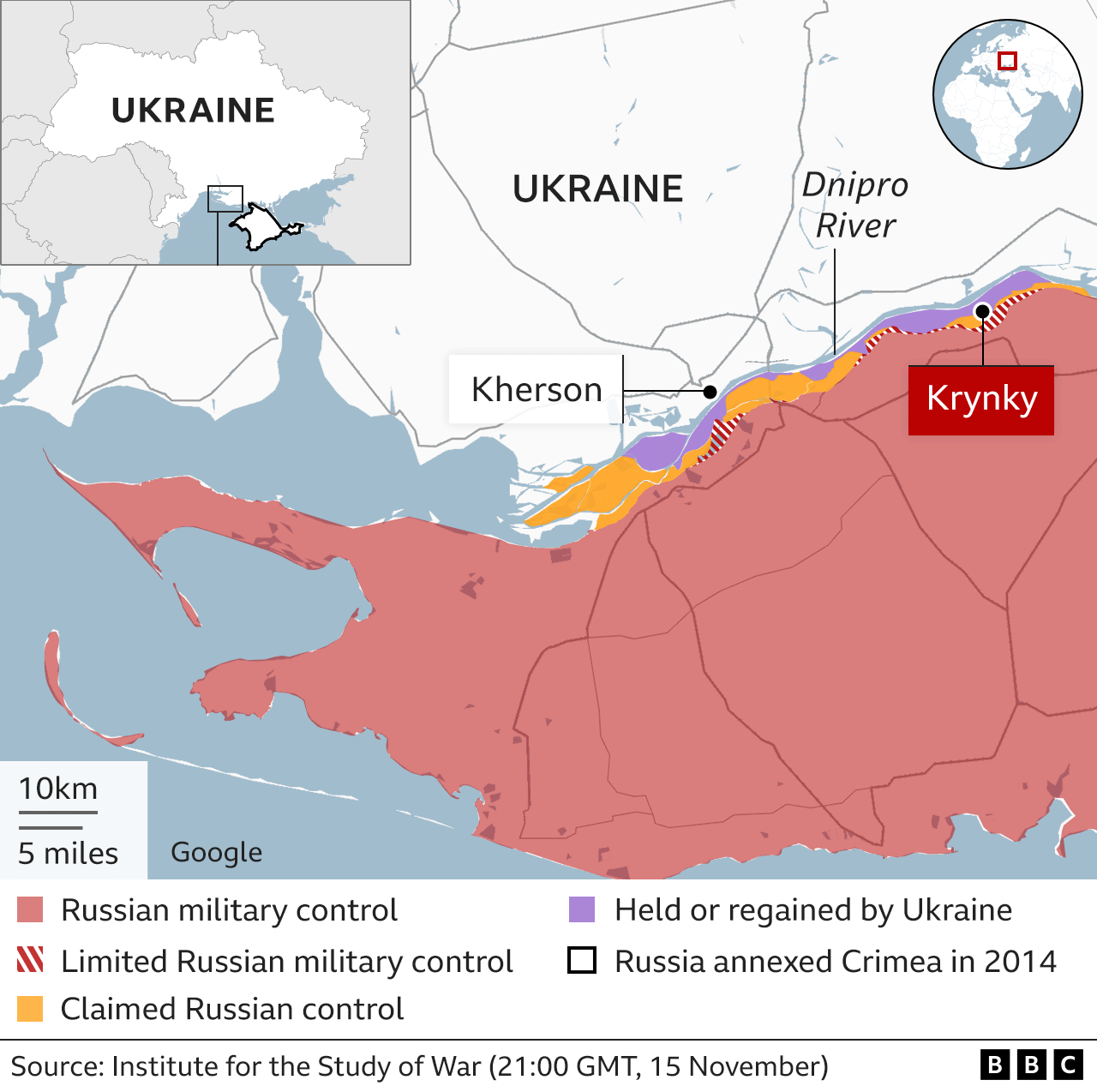
The river has separated Ukrainian and Russian forces since Moscow’s troops withdrew from Kherson a year ago.
If the area is held it would mean a significant advance for Ukraine as it may be able to begin transferring armoured vehicles and air defence systems across the river putting it a step closer to breaking through to Crimea, the peninsula illegally annexed by Russia in 2014.
The success was claimed by Ukrainian President Volodymyr Zelensky’s chief of staff Andriy Yermak shortly after US-based experts said that marginal advances had been made into the village of Krynky, 2km (1.25 miles) inland from the river.
Russia conceded on 15 November that “small groups” of Ukrainian forces had set up positions in the village but insisted they had sustained heavy losses and had no chance of breaking through.
Vladimir Saldo, the Russian-installed official in charge of the Russian-occupied areas of the Kherson region, said they faced a “fiery hell”, adding: “Our additional forces have now been brought in. The enemy is trapped in Krynky.”
His admission that Ukrainian forces had gained a foothold came two days after Russian state media published and then swiftly retracted news of a retreat from positions on the eastern bank.
Ukrainian forces have conducted several raids in small boats across the Dnipro, Ukraine’s longest river, during the spring and summer. However, Kyiv lacks air superiority, which made the task more difficult.
The battle for Bakhmut
Russia’s main effort has been focused on eastern Ukraine, according to analysts from the US-based Institute for the Study of War (ISW).
The city of Bakhmut, which has endured some of the heaviest fighting of the war, has been under Russian control for several months and, although Ukraine gained some ground in the surrounding areas over the summer, including the villages of Kupyansk and Andriivka, the battles continue.
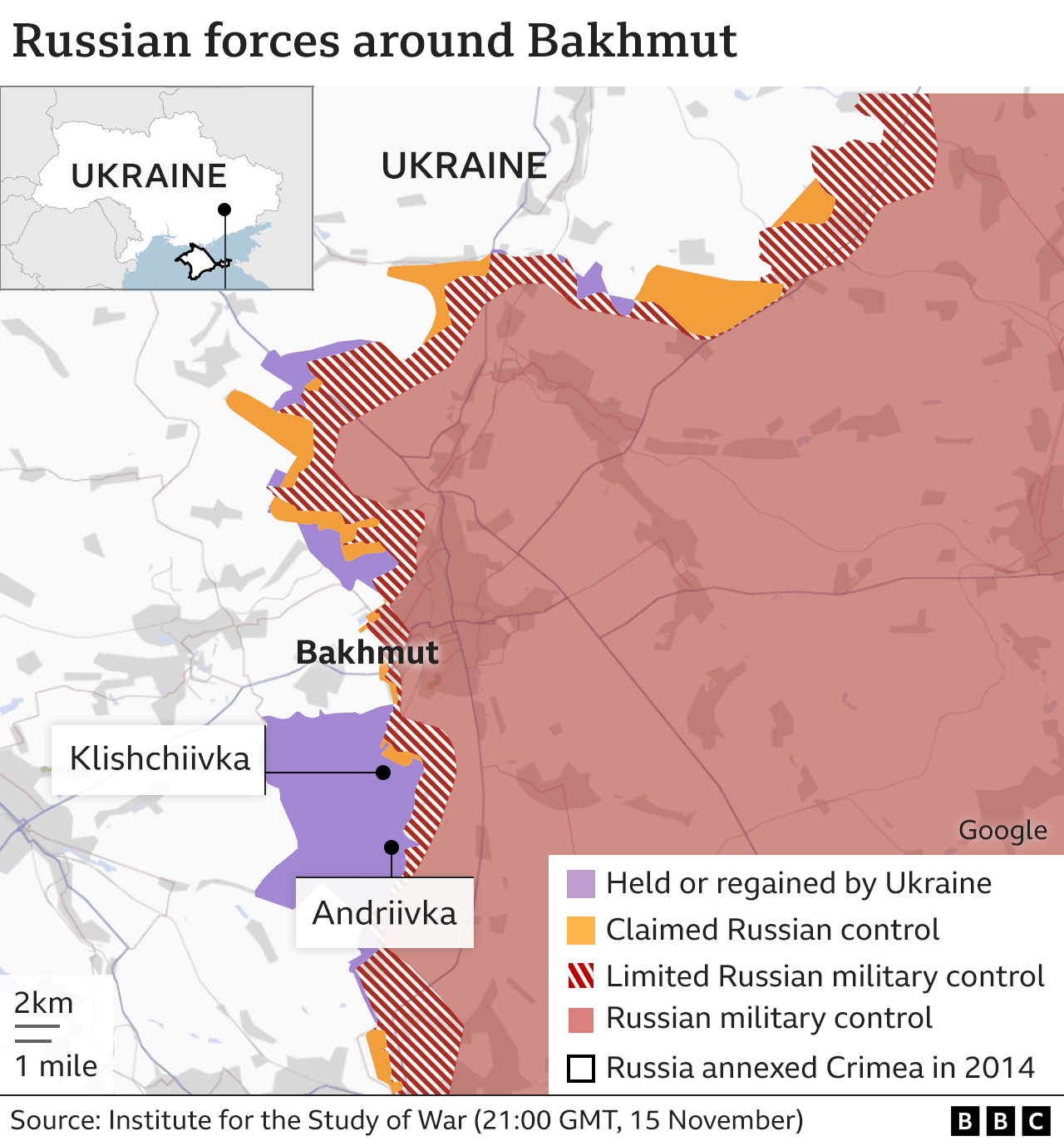
Russian forces are also claiming to have made advances around the town of Avdiivka near the city of Donetsk.
President Zelensky said on 14 November that fighting was escalating near the town but added that Russian forces were losing men and equipment trying to capture it.
The UK Ministry of Defence says Russia is “almost certainly attempting a pincer movement to encircle the town”, and notes its proximity to Donetsk means it holds political importance to Russia.
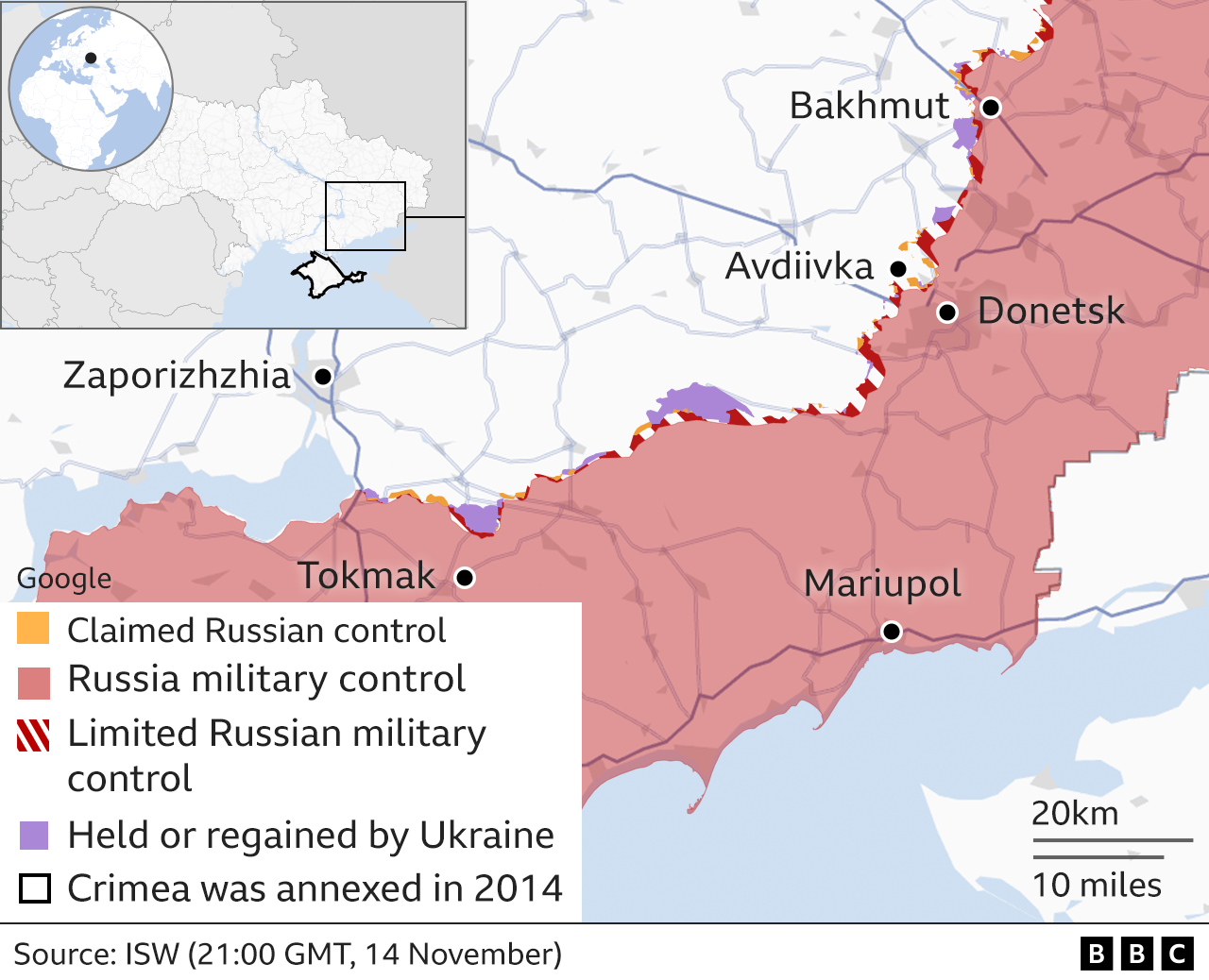
The MoD assessment is that recent advances suggest Russian forces are closing in on the coke and chemical plant to the north of the town, which is still held by Ukrainian forces and occupies a key tactical position.
The plant dominates the main road into Avdiivka and, the MoD believes if Russian forces were to secure it, resupplying the town would “become increasingly difficult for Ukraine”. However the building gives Ukraine a “localised defensive advantage” and the MoD says that Russian forces will probably suffer significant losses if they attempt to assault the facility.
Attacks on Crimea
As part of its counter-offensive Ukraine has also stepped up attacks on the Crimean peninsula – including a missile attack on the port of Sevastopol on 22 September which it says killed 34 Russian officers.
That attack came just over a week after another major attack on the same city, which is the headquarters of the fleet, that is thought to have destroyed a ship and a submarine.
It also caused significant damage to the dry docks, which are vital for maintenance of the entire Russian Black Sea fleet.
The next day Ukraine said it had succeeded in destroying a sophisticated Russian air defence system – the S-400 – on the peninsular.
Attacks in late August destroyed another S-400 and others knocked out Russian radar positions on offshore gas platforms.
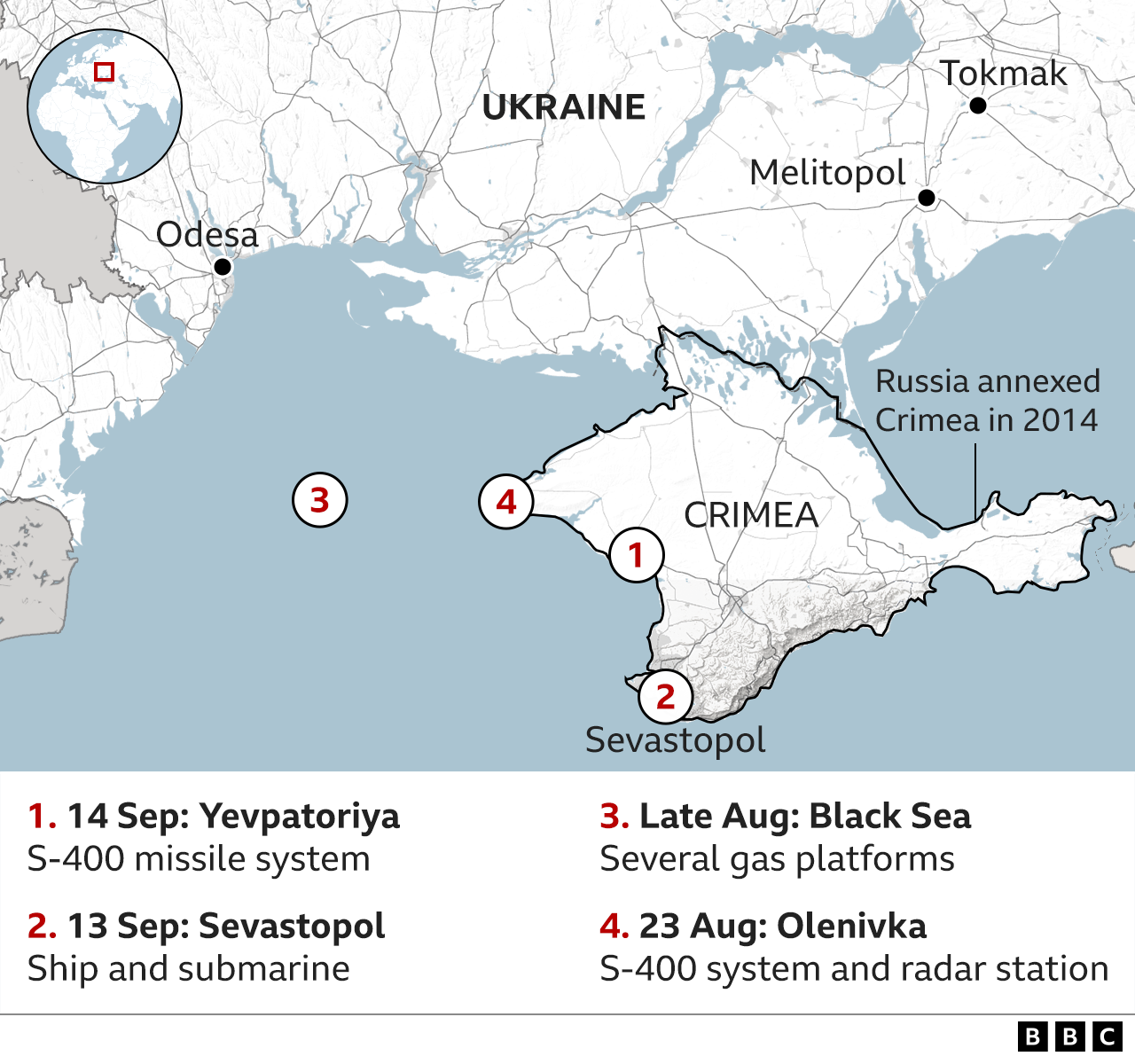
Russia’s Black Sea fleet is an important target for Kyiv – its ships have launched missiles at Ukraine causing devastating damage.
It has also been threatening to block the Black Sea shipping routes that Ukraine has been using to export grain – which is a particular sticking point for Kyiv currently.
Moscow pulled out of the internationally brokered Black Sea Grain Initiative in mid-July, which guaranteed safe passage of non-military vessels, arguing that Russia’s own agricultural exporters were being disadvantaged.
In its place Ukraine exported a limited amount of grain using ships that hugged the western coast of the Black Sea – through Romanian and Bulgarian territorial waters – to evade Russian attack. Ukraine has also been exporting an increasing amount of grain from Reni and Izmail, on the Danube river.
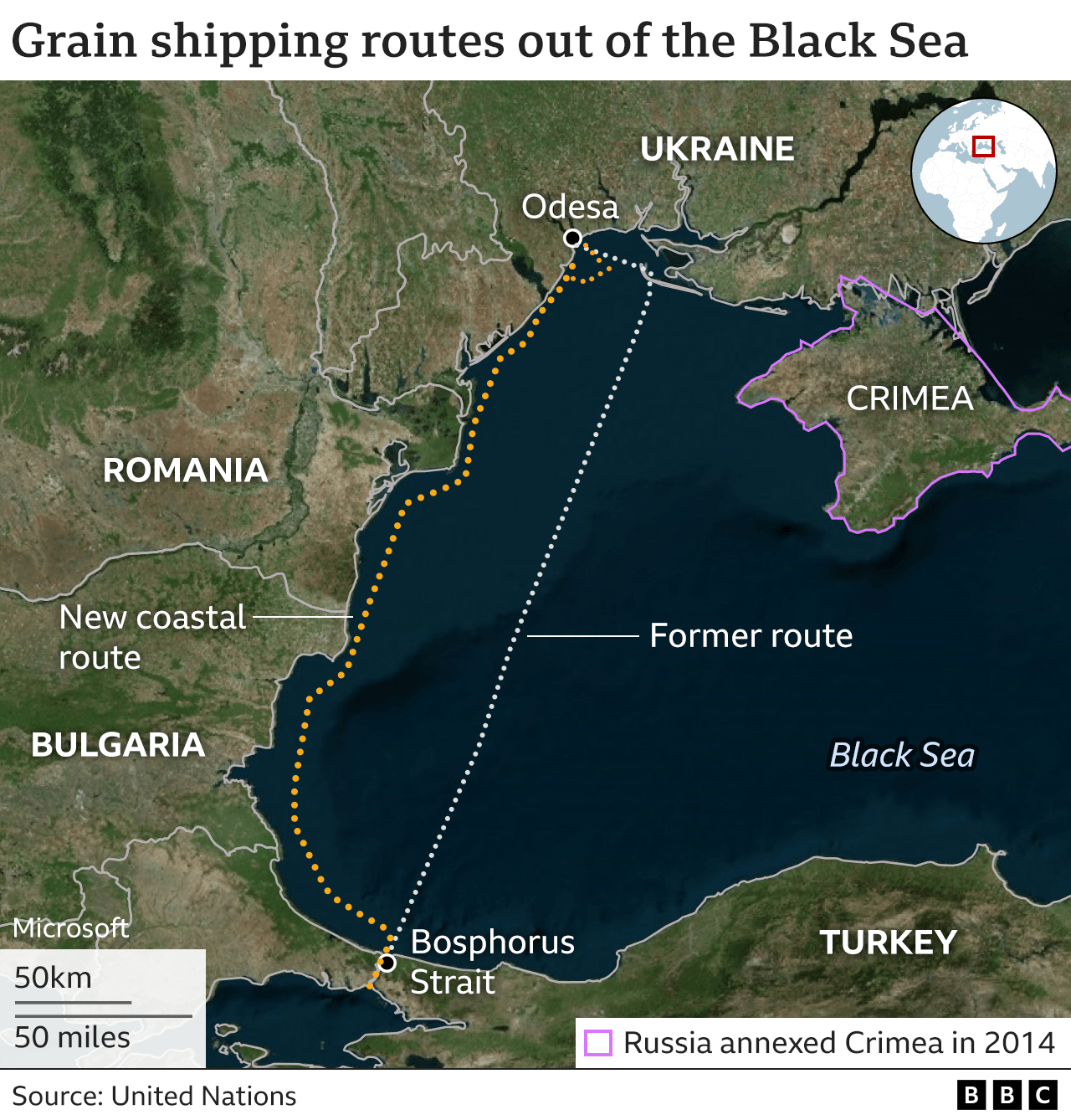
The Black Sea route was previously used as a humanitarian corridor, to allow passage for empty ships which had been trapped in Ukraine’s ports since the start of the conflict.
However, earlier in November Ukrainian officials said a harbour pilot had been killed and four other people injured after a Russian missile hit a civilian ship that was supposed to transport iron ore to China as it was entering Odesa.
More than a year of fighting
Russia’s invasion began with dozens of missile strikes on cities all over Ukraine before dawn on 24 February 2022.
Russian ground troops moved in quickly and within a few weeks were in control of large areas of Ukraine and had advanced to the suburbs of Kyiv.
Russian forces were bombarding Kharkiv, and they had taken territory in the east and south as far as Kherson, and surrounded the port city of Mariupol.
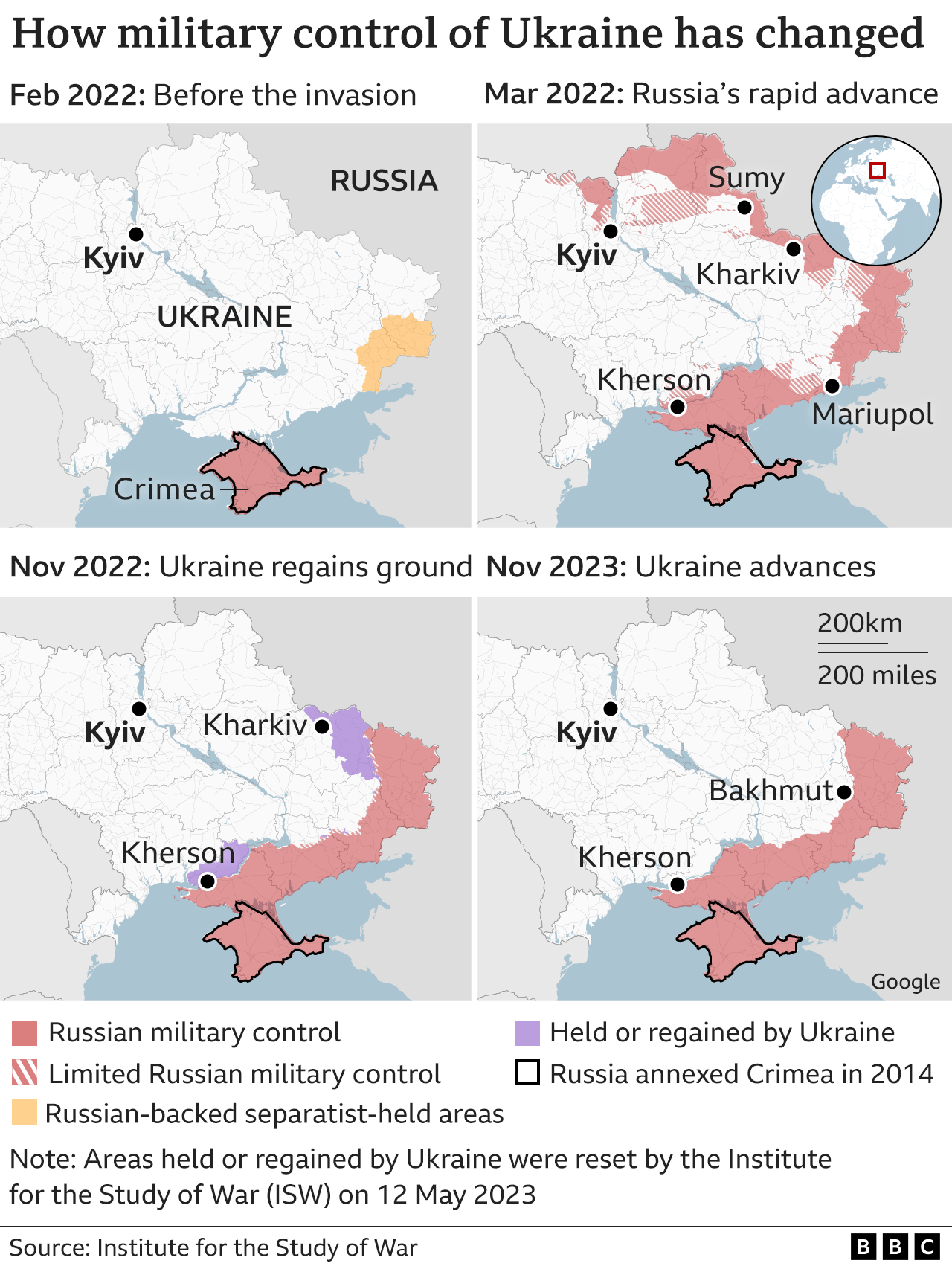
But they hit very strong Ukrainian resistance almost everywhere and faced serious logistical problems with poorly motivated Russian troops suffering shortages of food, water and ammunition.
Ukrainian forces were also quick to deploy Western supplied arms such as the Nlaw anti-tank system, which proved highly effective against the Russian advance.
By October, the picture had changed dramatically and having failed to take Kyiv, Russia withdrew completely from the north.
More than a year since the invasion, Ukraine is now hoping its latest counter-offensive can turn the war in its favour.
By David Brown, Bella Hurrell, Dominic Bailey, Mike Hills, Lucy Rodgers, Paul Sargeant, Alison Trowsdale, Tural Ahmedzade, Chris Clayton, Kady Wardell, Mark Bryson, Zoe Bartholomew, Sean Willmott, Sana Dionysiou, Joy Roxas, Gerry Fletcher, Jana Tauschinsk, Debie Loizou, Simon Martin and Prina Shah.

About these maps
To indicate which parts of Ukraine are under control by Russian troops we are using daily assessments published by the Institute for the Study of War with the American Enterprise Institute’s Critical Threats Project. To show key areas where advances are taking place we are also using updates from the UK Ministry of Defence and BBC research.
The situation in Ukraine is often fast moving and it is likely there will be times when there have been changes not reflected in the maps.
Related Topics
Far-right outsider Javier Milei wins Argentina presidential run-off election

By Katy Watson, South America correspondent, and Emily McGarvey in London
BBC News
Far-right libertarian outsider Javier Milei has won Argentina’s presidential run-off poll, according to provisional results.
Mr Milei’s rival, economy minister Sergio Massa, called him to concede.
Former US President Donald Trump congratulated Mr Milei on his victory, saying he would “Make Argentina Great Again!”.
The election comes at a difficult time for Argentina with rising inflation and an economy in crisis.
Mr Milei’s proposals, which included “blowing up” the central bank, won support with voters desperate for change.
He confounded pollsters by easily defeating the candidate of the governing Peronists by more than 10 points, provisional results suggest.
With almost 90% of votes counted, Mr Milei had nearly 56% of the vote compared with 44% for Mr Massa.
In his victory speech to supporters in Buenos Aires, Mr Milei said: “Today begins the reconstruction of Argentina. Today begins the end of Argentina’s decline.
“The model of decadence has come to an end. There is no way back.
“Argentina will return to its place in the world that it should never have lost. We are going to work shoulder-to-shoulder with all nations of the free world, to help build a better world.”
After his defeat, Mr Massa said: “Obviously the results are not what we expected. I have contacted Javier Milei to congratulate him.
“From tomorrow the responsibility of providing certainty belongs to Milei.”
- Argentines choose between polar opposites in run-off
- Chainsaw-wielding TikTok star leads polls in Argentina
It was a close race to the very end but the former pundit who at one point wielded a chainsaw on the campaign trail, won out.
Javier Milei has been likened to former US President Donald Trump and Brazilian ex-leader Jair Bolsonaro.
He has little political experience but the fact that he is a political outsider was part of his appeal for many voters.
His talk of introducing the US dollar as the country’s official currency was met with applause by his supporters. Many economists though say it may spell financial disaster.
In a country where annual inflation is now over 140% and two in five people live in poverty, his win proves that Argentines are fed up with traditional politics and economic disaster.
https://emp.bbc.co.uk/emp/SMPj/2.50.8/iframe.htmlMedia caption,
Why these Argentinians voted for Javier Milei
His victory means they are willing to try something new in an effort to make their lives better.
Reacting to the result, former President Trump posted on his Truth Social platform: “The whole world was watching! I am very proud of you.”
White House National Security Adviser Jake Sullivan congratulated Mr Milei on his election “and to the people of Argentina for holding free and fair elections”.
Posting on X, he said the US would “look forward to building on our strong bilateral relationship based on our shared commitment to human rights, democratic values, and transparency”.
South American leaders have also been commenting on Mr Milei’s victory, with Brazil’s President Luiz Inácio Lula da Silva posting: “I wish good luck and success to the new government. Argentina is a great country and deserves all our respect.”
“Brazil will always be available to work together with our Argentine brothers,” he posted on X, formerly Twitter.
On the campaign trail, Mr Milei publicly criticised Lula’s policies and branded him an “angry communist”.
Colombia’s left-wing president, Gustavo Petro, said the result of the election was “sad for Latin America”. “Neoliberalism no longer has a proposal for society, it cannot respond to humanity’s current problems,” he posted on X.
Chile’s President Gabriel Boric said he saluted Mr Milei “for his victory and Sergio Massa for his worthy recognition of defeat”.
He posted on X: “I wish the Argentine people the best and know that they will always have our respect and support.”

https://www.bbc.com/reel/video/p0gn8kps/the-butterfly-effect-what-is-chaos-theory-
November 19th 2023



Nick Beake
Reporting from Jerusalem
Israel believes it’s starting to build up a compelling case to justify its operation at al-Shifa hospital.
Its military has repeatedly said Hamas has a large HQ right underneath the medical centre, and that was the justification for its intense military operation, even while thousands of civilians remained there.
The word from the Israel Defense Forces (IDF) today was that more evidence was coming – it seems they’re keen to shown what their operation has found.
To quote them, they believe what they’ve discovered so far – some of which is shown in the latest footage – “clearly proves that numerous buildings in the hospital’s complex are used by Hamas as cover for terrorist infrastructure and activities”.
Posted at 17:0817:08
IDF releases footage it says shows Hamas tunnel under al-Shifa
In the last few minutes, the Israeli military has released footage which it says shows a “55m-long terror tunnel, 10m deep underneath the Shifa hospital”.
In the video, a deep staircase is shown at ground level, among rubble in the al-Shifa complex.
Once at the bottom, troops appear to walk along a well-constructed tunnel shaft that leads to a heavy door.
“This type of door is used by the Hamas terrorist organisation to block Israeli forces from entering the command centres and the underground assets belonging to Hamas,” the Israel Defense Forces (DF) say in a statement, adding that investigations “are continuing to uncover the route of the tunnel”.
The Israeli forces have claimed for weeks that Hamas has a command and control centre underneath al-Shifa – allegations the group and medical staff at the hospital deny.
Last week, the US said its intelligence similarly suggested Hamas has a network underneath al-Shifa.
Israel approves plans for continuation of war
The Israeli military has posted on X saying plans were approved last night for “the continuation of ground combat and manoeuvring in the Gaza Strip”.
It’s unclear whether this means the Israeli ground operation will expand to Gaza’s south.
Earlier this week, leaflets were distributed to residents in Khan Younis in the south, warning them to evacuate ahead of Israeli military activity there.
Posted at 16:3416:34
Israeli advisor says command room under al-Shifa hospital
Mark Regev, a senior advisor to the Israeli prime minister, Benjamin Netanyahu, says the IDF has located a command and control room in the al-Shifa hospital complex.
“We found a command and control room on the minus 2 floor (of the hospital) but once again we have to show – and we still will, it’s just a matter of time – the connection between the tunnel network and the hospital,” he told the Weekend programme on the BBC World Service.
Regev said there were fears of booby traps awaiting IDF forces in the tunnels underground, and that the IDF would have conclusive evidence in the next few days.
Israeli defence forces descended on al-Shifa hospital late last week, accusing Hamas of running the “beating heart” of its operations from beneath the hospital. The US says its intelligence suggests there is a “command and control node” in the hospital complex.
November 18th 2023



November 15th 2023
Currently Under Martial Law : Ukraine The Very Modern Model For Future NATO, EU, And Blueprint For Western Style Democracy. So Well Worth Its Young Men Dying For – R J Cook
Ukraine is one of the most corrupt countries in Europe if not the World. The war with Russia hasn’t changed that. Ukraine is a perfect mate for U.K & U.S Elite Hypocrits where faking Democracy is The Name Of The Game.
Ukraine is fighting two wars, one is against corruption. It has now launched a campaign to tackle the entrenched problem. But are dismissing ministers and raids on high-profile figures enough?
Isha Mehrotra February 02, 2023 18:26:16 IST
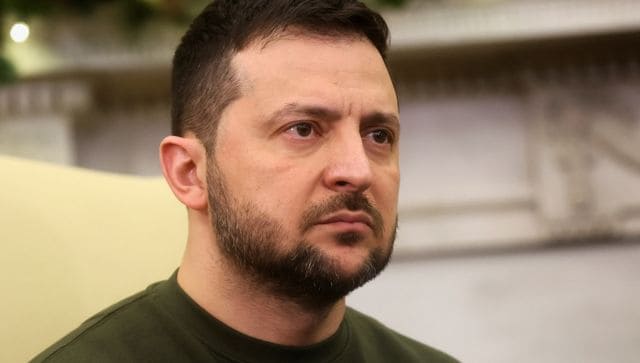
Volodymyr Zelenskyy said his government is preparing new reforms to make Ukraine more ‘human, transparent and effective’. Reuters File Photo
Ukraine has launched a major crackdown on corruption ahead of a summit with the European Union (EU) in Kyiv this week.
Under the anti-corruption drive, Ukraine is investigating current and former top officials in the defence and energy ministries as well as the tax office, reported The Washington Post.
On Wednesday (1 February), the Ukrainian authorities also raided the house of an influential billionaire, Ihor Kolomoisky. Former interior minister Arsen Avakov’s home was also searched.
Related Articles
Time ticks fast for Zelenskyy amid Ukraine war stalemate, West’s shaky belief
‘Russia sending Ukrainian POWs on frontline to fight their own country’
The raids come as President Volodymyr Zelenskyy announced his government was “preparing new reforms” that will make the country “more human, transparent and effective”, reported BBC.
Let’s take a closer look at the recent anti-graft raids and Ukraine’s long fight against corruption.
Ukraine’s anti-corruption purge
Ukrainian authorities recovered a large amount of cash, luxury watches and cars during the raid carried out tax chief’s residence, reported CNN.
Several purported photographs of Kolomoiskiy, one of the country’s richest men, looking on as his home in the south-eastern city of Dnipro was searched were published. Reuters reported citing media outlets that the probe was into possible financial crimes.
The business magnate served as the governor of the wider Dnipropetrovsk region in 2014 and had backed Zelenskyy’s bid for the presidency in 2019.
The Security Service of Ukraine (SBU) has accused the “former management” of oil producer Ukrnafta and oil refining company Ukrtatnafta of “misappropriation” of $1.1 billion. Notably, Kolomoiskiy used to partly own these two biggest oil firms in Ukraine, as per Reuters.
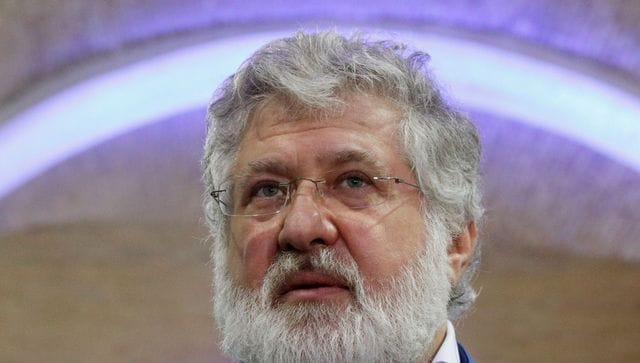
Raids were carried out at Ihor Kolomoisky’s house. Reuters File Photo
Former Ukrainian minister Avakov told the media that his home was searched in connection with a probe into the January 18 helicopter crash that left 14 people dead.
Avakov was the interior minister in 2018 when ‘Super Puma’ ES-225 helicopter – which was involved in the crash – was purchased from France.
Avakov claimed nothing was found during the searches and all contracts were approved at the time of the deal, reported BBC.
David Arakhamia, a member of Zelenskyy’s Servant of the People party, informed the leaders of the customs service have been sacked.
“The country will change during the war. If someone is not ready for change, then the state itself will come and help them change,” Arakhamia wrote on Telegram, as per Reuters.
Political shake-up
Last week, 15 Ukrainian officials were dismissed or had to resign amid allegations of corruption.
This included Ukraine’s deputy minister of infrastructure, Vasyl Lozinskyi, who was removed from his post after he was accused by prosecutors of inflating the price of winter equipment and “siphoning off $4,00,000”, as per The Guardian. He has been arrested.
Another official who was let go was Vyacheslav Shapovalov – the deputy minister of defence – who was responsible for overseeing supplies and food for Ukrainian troops. It was under him that the alleged inflated food contracts were signed, a charge he has denied.
The other high-profile exit was of Kyrylo Tymoshenko, the deputy head of Ukraine’s presidential administration. Reports claimed that he had “improperly” used an SUV donated for humanitarian missions.
Oleksiy Symonenko, the deputy prosecutor general of Ukraine, was also removed. Last December, he went to Spain for a 10–day holiday in a Mercedes owned by a prominent Ukrainian businessman, reported The Guardian.
In January, Zelenskyy banned all government officials from leaving the country other than for official business.
Ukraine’s long battle with corruption
Widespread systemic corruption is steeped in Ukraine long before Russia’s invasion last February.
Since Ukraine declared independence from the Soviet Union in 1991, the country has continued to combat corruption, “free itself from the influence of Russian oligarchs and establish a democratic political system”, noted Time.
A 2016 report by the watchdog group Transparency International found that between 38 per cent to 42 per cent of Ukrainian households said they paid bribes to access basic public services such as education or healthcare, reported Time.
During his campaign for the presidency, Zelenskyy had pledged to tackle corruption.
On 20 May 2019, Zelenskyy had said his election victory proved Ukrainians were tired of experienced politicians who over decades had created a country of opportunities – “opportunities to steal, bribe and loot”, reported Al Jazeera.
Ukraine ranked 117th out of 180 countries in Transparency International’s 2020 Corruption Perceptions Index, while Russia was at 129th place.
The 2021 Corruption Perceptions Index placed Ukraine at 122nd position out of 180 countries.
Al Jazeera noted that year Ukraine was the second most corrupt nation in Europe, with Russia being the most corrupt at 136.
Ukraine performed slightly better and was placed in 116th position out of 180 nations in the 2022 Corruption Perceptions Index released on Tuesday (31 January). Russia was ranked 137th on the index.
“Unfortunately, this type of widespread systemic corruption is complicated to tackle and requires sustained efforts for at least a generation or even more,” Cristian Nitoiu, a lecturer in diplomacy and international governance at Loughborough University, told Al Jazeera in June last year.
“The legacy of the Soviet Union plays an important role, as citizens had to learn how to navigate a system of informal relations and rules, where everyone had equal rights on paper, but in practice, some people were more ‘equal’ than others”.
“These developments are not unique to Ukraine, as most post-Soviet and Communist countries experienced them, including Russia, but Ukraine, alongside Moldova, were extreme cases,” Nitoiu explained further.
Ukraine has taken steps to counter corruption in the past years.
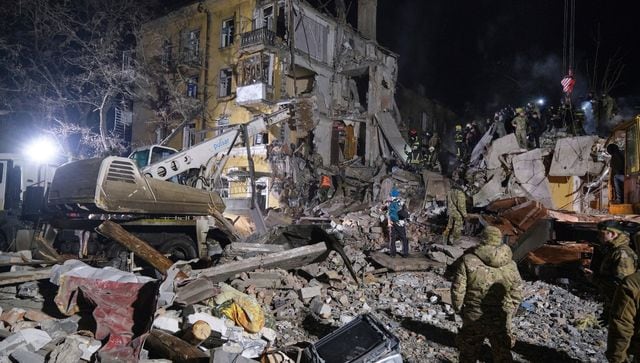
Corruption has plagued Ukraine even during the war with Russia. AP File Photo
The government has set up two anti-corruption bodies – the Corruption Prevention Agency and the National Anti-Corruption Bureau since the ouster of former president Viktor Yanukovych in 2014 following major protests.
Zelenskyy’s government has passed a law that ended the immunity granted to lawmakers from prosecution.
While Zelenskyy has been praised for some reforms, his efforts to weed out corruption have also been questioned.
Why Ukraine has sped up efforts now
Russian President Vladimir Putin has used corruption in Ukraine to justify Moscow’s invasion.
The United States and European allies have pressured Ukraine to clean up its house amid widespread corruption concerns.
On Tuesday, America’s treasury department said there were no indications that Ukraine misused US funds, adding that it would work with Ukrainian authorities to “ensure appropriate safeguards are in place so that US assistance reaches those for whom it is intended”.
Ukraine, which is seeking to become a full member of the European Union, is hoping the recent anti-corruption measures would advance its candidacy, as per The Washington Post.
Anti-corruption measures are “an important dimension of the EU accession process,” Ana Pisonero, a spokesperson for the European Commission, had said earlier in January, reported CNN.
With inputs from agencies
Read all the Latest News, Trending News, Cricket News, Bollywood News,
India News and Entertainment News here. Follow us on Facebook, Twitter and Instagram.
Putin will win unless the West finally commits to Ukrainian victory
By Ivan Verstyuk
Filter Results
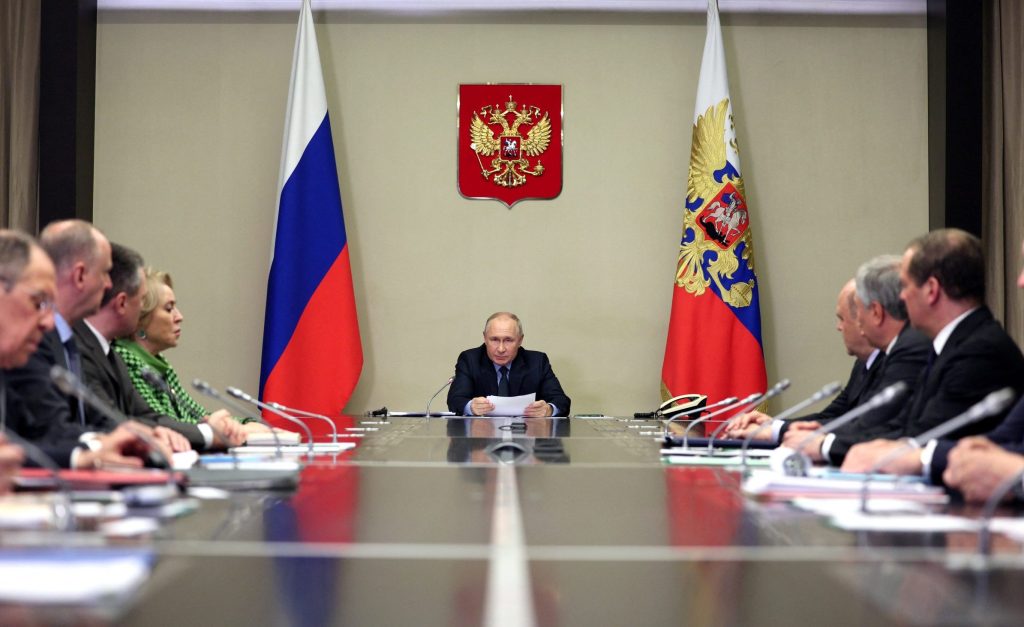
As the full-scale Russian invasion of Ukraine moves toward the two-year mark, Vladimir Putin is still far from achieving his original goal of extinguishing Ukrainian independence and subjugating the entire country. Nevertheless, there are no indications that the Russian dictator is looking to end the war. On the contrary, Putin evidently believes time is on his side in Ukraine, and appears more confident than ever that he can ultimately outlast the West.
Putin’s preparations for a long war are perhaps most immediately apparent in Russia’s 2024 budget, which includes an unprecedented increase in military spending to around double the figure for the current year. He is putting the entire Russian economy on a war footing, and is undeterred by the cuts this will necessitate in other areas such as social spending, healthcare, and education.
Putin is also counting on favorable changes in the global geopolitical landscape. Russia has openly welcomed the recent shift in international attention toward the Israel-Hamas conflict; there is good reason to expect this trend to continue in 2024 as global audiences and Western leaders grow increasingly tired of the war in Ukraine.
With the US entering an election year, many in Moscow anticipate that the current Western focus on Ukraine will diminish in the coming months. Putin would no doubt welcome a call from US President Joe Biden proposing some kind of grand bargain to end the war, but he is just as happy to wait until next November’s presidential ballot to see whether a potential new American leader may be prepared to offer even more favorable terms.
Based on his own extensive experience gained during more than two decades on the global stage, Putin also fully expects his less seasoned Ukrainian adversaries to make mistakes that will further undermine international support for their country. In particular, he is confident Ukrainian President Volodymyr Zelenskyy’s frequent requests for military aid will eventually lead to friction in the relationship between Kyiv and the West.
Subscribe to UkraineAlert
As the world watches the Russian invasion of Ukraine unfold, UkraineAlert delivers the best Atlantic Council expert insight and analysis on Ukraine twice a week directly to your inbox.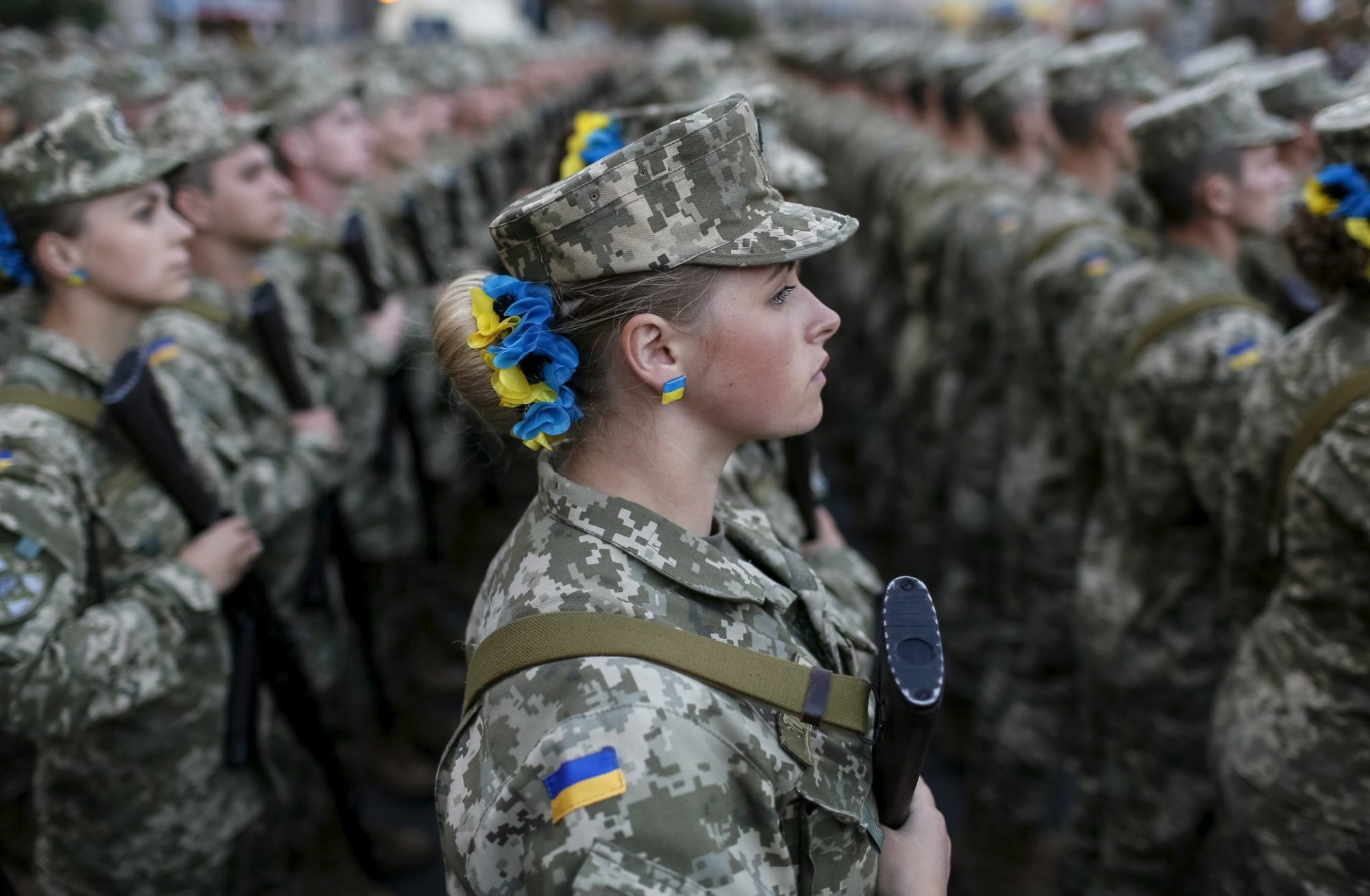
- Name First Last
- Email*
- CommentsThis field is for validation purposes and should be left unchanged.
There is no question that the invasion of Ukraine has proved extremely costly for Russia, both in military losses and in terms of the damage done to the country’s international standing. At the same time, Putin has done much to prepare Russia for the realities of today’s international isolation. He has made the Russian economy surprisingly sanctions-resistant, and has achieved a degree of self-sufficiency in the military-industrial sector.
Nor is there any particular concern in the Kremlin over the possibility of internal unrest. While the short-lived Wagner mutiny hinted at the fragility of Putin’s grip on Russia, it is hard to see where any future threats to the country’s current leadership could come from. All domestic political opposition has been crushed, while the last vestiges of an independent media have been silenced. Meanwhile, Putin has been careful to prevent the emergence of any potential rivals from within the ranks of the Russian army, and has kept loyalists like Sergei Shoigu and Valeriy Gerasimov in top military positions despite their many blunders.
These factors mean there is currently little incentive for Putin to end the war. Indeed, any outcome other than an unambiguous Russian military victory would likely lead to uncomfortable questions being asked regarding the sacrifices Russians have made since the start of the invasion. From Putin’s point of view, it is far better to maintain a long-term conflict in Ukraine with the prospect of increasingly favorable circumstances.
Eurasia Center events
Clearly, Ukrainian and Western leaders have so far failed to convince Putin that time is not on his side. Achieving this goal will be no easy task, but it can be achieved through a combination of enhanced military support and resolute geopolitical unity.
At present, Ukraine’s military strategy is focused on attempts to exhaust the Russian army via attrition tactics. This could succeed in weakening Russia’s offensive capabilities, but it will not produce the kind of military victory that most Ukrainians believe their country needs if it is to remove the threat of a repeat Russian invasion in the coming years. In order to defeat Russia decisively on the battlefield, Ukraine needs to receive far greater volumes of military aid along with unhindered access to the latest military technologies.
The West certainly has the resources to provide Ukraine with the tools it needs to defeat Russia. The combined GDP of all NATO member countries is more than twenty times the size of Russia’s GDP. However, the hesitancy and uncertainty displayed by Western leaders throughout the war has helped persuade Putin that the democratic world lacks his own political will and is ultimately too weak to challenge him.
If Western leaders are serious about preventing a Russian victory, they should demonstrate their resolve via long-term commitments to Ukraine with the clearly stated objective of a decisive Ukrainian military victory. This would do much to counter expectations in Moscow of an eventual collapse in Western support for Ukraine. Even Putin understands that there is no way Russia could hope to compete if the West finally chooses to deploy anything like the full weight its vastly superior financial, military, and technological resources.
Western leaders often speak about the high stakes of the war in Ukraine. In the coming months, they must match these words with actions. If they fail to do so, the price of Russian victory will be far higher than the cost of increasing support for Ukraine. This is an inescapable geopolitical reality that transcends all election cycles and will shape the international security climate for decades to come.
Ivan Verstyuk is a Ukrainian analyst and commentator based in Kyiv.
Further reading
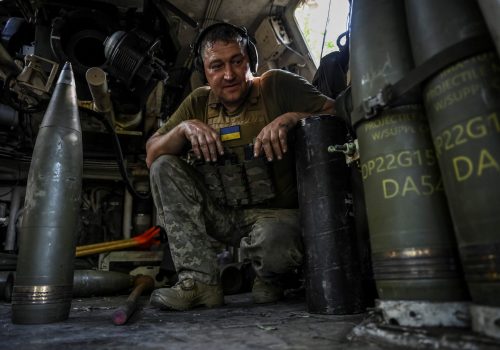
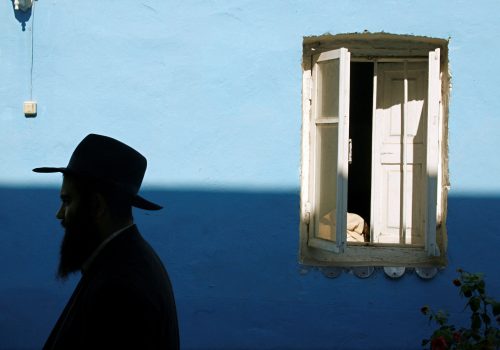
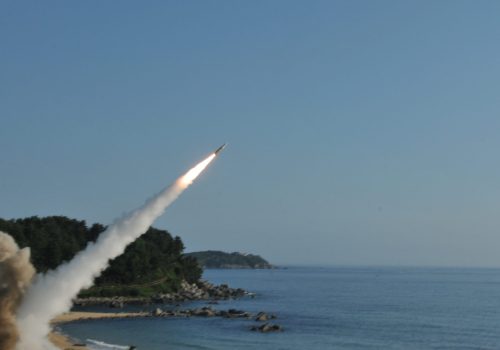
November 13th 2023
Ukraine war: Russian state media retract report of Russian retreat
Related Topics
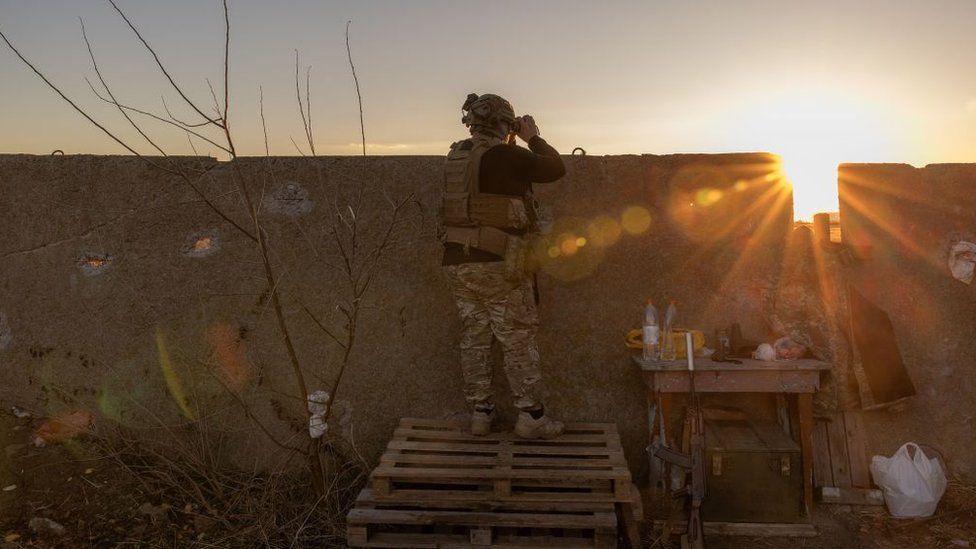
By Ido Vock
BBC News
Russian state media on Monday published and swiftly retracted reports of a withdrawal of forces from the right (western) bank of the Dnipro River.
The reports quoted Russia’s defence ministry announcing troops were being transferred “to more favourable positions” on the Russian-occupied left – or eastern – side.
The stories were quickly retracted.
The Russian defence ministry blamed the publication of the “false report” on a “fake account” linked to Ukraine.
Ukraine claimed the announcement was a Russian disinformation operation being carried out against it.
Monday’s hasty reversal took place almost exactly a year after Russian forces withdrew their troops from the left bank, including from the city of Kherson. The river largely continues to separate Ukrainian and Russian forces.
In the now-retracted reports, state news agencies Tass and RIA-Novosti said Russia had repositioned troops to positions east of the Dnipro river, in order to “free up some of its forces, which will be used for offensive operations in other areas”.
They reflected similar language to those used in previous announcements of Russian retreats.
The Kremlin declined to comment on the incident, saying it was a matter for the military.
Ukrainian forces have escalated raids targeting Russian forces across the Dnipro in recent weeks – a key aim of its counter-offensive, which aims to slice through Russian occupied territory, severing a land corridor to the Crimean peninsula which Moscow annexed illegally in 2014.
On Friday, Russia claimed to have repelled a Ukrainian attempt to establish a beachhead – a landing position on a beach – which could have been used to bring heavy armour into the fight and would have represented a significant advance.
Still, the Institute for the Study of War (ISW), a US-based think tank, reported last week that Russian efforts to repel Ukrainian forces from the east bank had “not prevented Ukrainian forces from transferring additional personnel and materiel to positions on the east bank” of the river.
Separately, an explosion which killed at least three Russian officers in the occupied city of Melitopol on Saturday was claimed by Ukrainian military intelligence. Kyiv said the blast was “an act of revenge” carried out by local resistance forces.
Ukrainian-linked fighters have claimed to have killed a number of Russian officials and local collaborators with car bombs and explosions. Last week, Mikhail Filiponenko, a former head of a separatist militia, was killed in the occupied city of Luhansk in an attack claimed by Ukraine.
Related Topics
November 10th 2023
‘I’m calling from Israeli intelligence. We have the order to bomb. You have two hours’
Related Topics
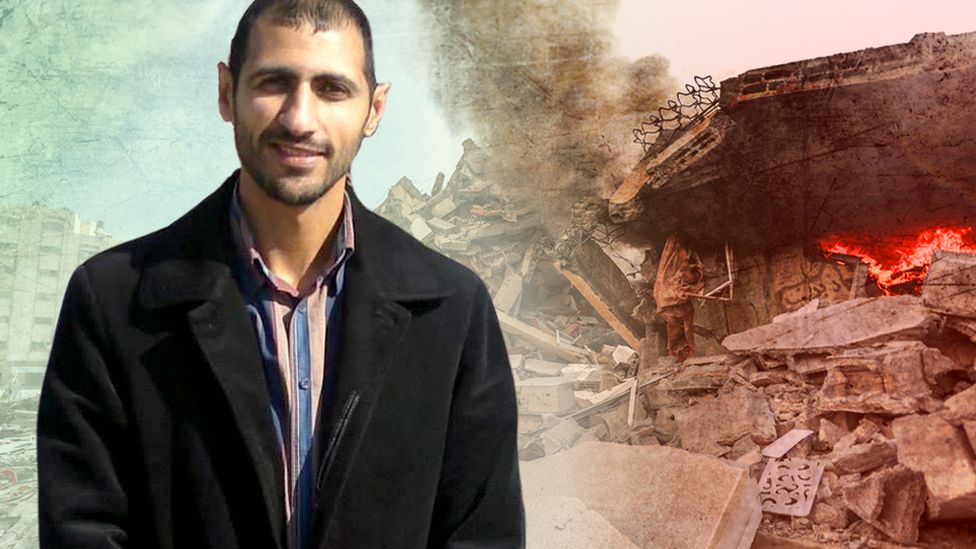
By Alice Cuddy
BBC News, Jerusalem
The call to Mahmoud Shaheen came at dawn.
It was Thursday 19 October at about 06:30, and Israel had been bombing Gaza for 12 days straight.
He’d been in his third-floor, three-bedroom flat in al-Zahra, a middle-class area in the north of the Gaza Strip. Until now, it had been largely untouched by air strikes.
He’d heard a rising clamour outside. People were screaming. “You need to escape,” somebody in the street shouted, “because they will bomb the towers”.
As he left his building and crossed the road, looking for a safe place, his phone lit up.
It was a call from a private number.
“I’m speaking with you from Israeli intelligence,” a man said down the line, according to Mahmoud.
That call would last more than an hour – and it would be the most terrifying call of his life.

‘We will bomb three towers’
The voice addressed Mahmoud by his full name and spoke in flawless Arabic.
“He told me he wanted to bomb three towers… and ordered me to evacuate the surrounding area.”
Mahmoud’s tower was not directly under threat – but he was suddenly responsible for evacuating hundreds of people. “I had the lives of people in my hands,” he says.
He gathered his thoughts and told the man, who identified himself as Abu Khaled, not to hang up the phone.
As a 40-year-old dentist, Mahmoud says he has no idea why he was chosen for this task. But that day, he did everything he could to keep his community safe.
Directed by the voices of strangers, who always seemed to know how to reach him even when his battery ran out, he pleaded for the bombing to stop and screamed until his throat hurt for people to run away.
He led a mass evacuation of his neighbours – and then watched his neighbourhood explode in front of his eyes.
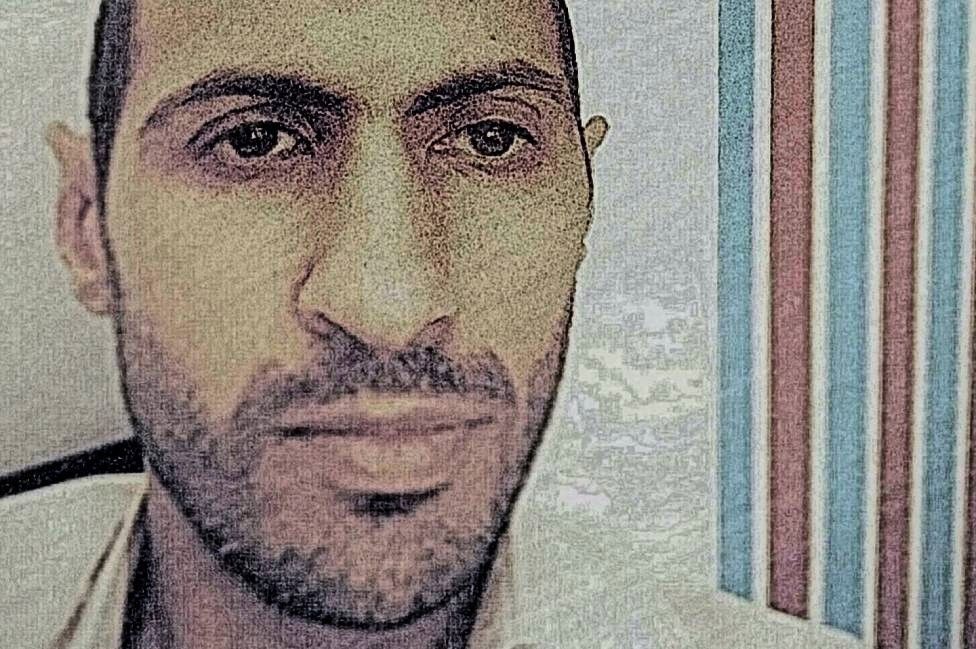
During this conflict, the Israeli military has phoned Gazans sometimes to warn them ahead of air strikes – Mahmoud’s account gives an insight into one such phone call in an unprecedented level of detail.
The BBC contacted Mahmoud after multiple al-Zahra residents identified him as the man who received the warning call.
We cannot independently verify the contents of the call, which he recounted roughly three weeks after the event. The details, however, match those on a community Facebook group from the day as well as satellite images before and after the bombing.
We know that day many hundreds of people were left homeless as the Israeli army bombed at least 25 residential blocks housing hundreds of apartments, destroying an entire neighbourhood. These people were forced to flee with what few belongings they could take, and were eventually dispersed across Gaza.
The IDF says it strikes military targets and these actions are subject to the “relevant provisions of international law”.

‘Fire a warning shot to prove this is real’
Mahmoud could not believe it when the man began speaking, he recalls.
People around him warned that the call may be fake. Since the war had begun, messages had been circulating in the community Facebook group warning of hoax calls and offering tips on identifying real Israeli evacuation orders.
Mahmoud asked the voice on the phone to fire a warning shot to prove this was real. If those still sleeping did not hear the screams from the streets then they would hear the shot, he thought.
A warning shot seemingly from nowhere, but perhaps from a drone, hit one of the apartment blocks under threat, he says.
“I asked him to ‘shoot another warning shot before you bomb’,” Mahmoud says. One more rang out.
Now that Mahmoud knew it was real he tried to stall, asking the man to be patient. “I told him: ‘Don’t betray us and bomb while people are still evacuating.'”
The man said he would give Mahmoud time – he said he did not want anyone to die, the dentist recalls.
Mahmoud responded that he didn’t want anyone to even be injured.
He kept the call going as he rushed around the neighbourhood, urging people to evacuate. One neighbour remembers the dentist “just shouting”, then others joined in.
“I didn’t want to know that there’s someone I could have saved and I didn’t,” Mahmoud says.
Hundreds of people poured into the streets that morning. Residents of this usually peaceful city were screaming and running, some of them wearing their pyjamas or prayer clothes.
The area – just north of the Wadi Gaza river, a point that Israel has been ordering civilians to move south of since the early days of the war – was made up of modern blocks of flats as well as shops, cafes, universities, schools, and parks. It was in these parks that people began to gather.
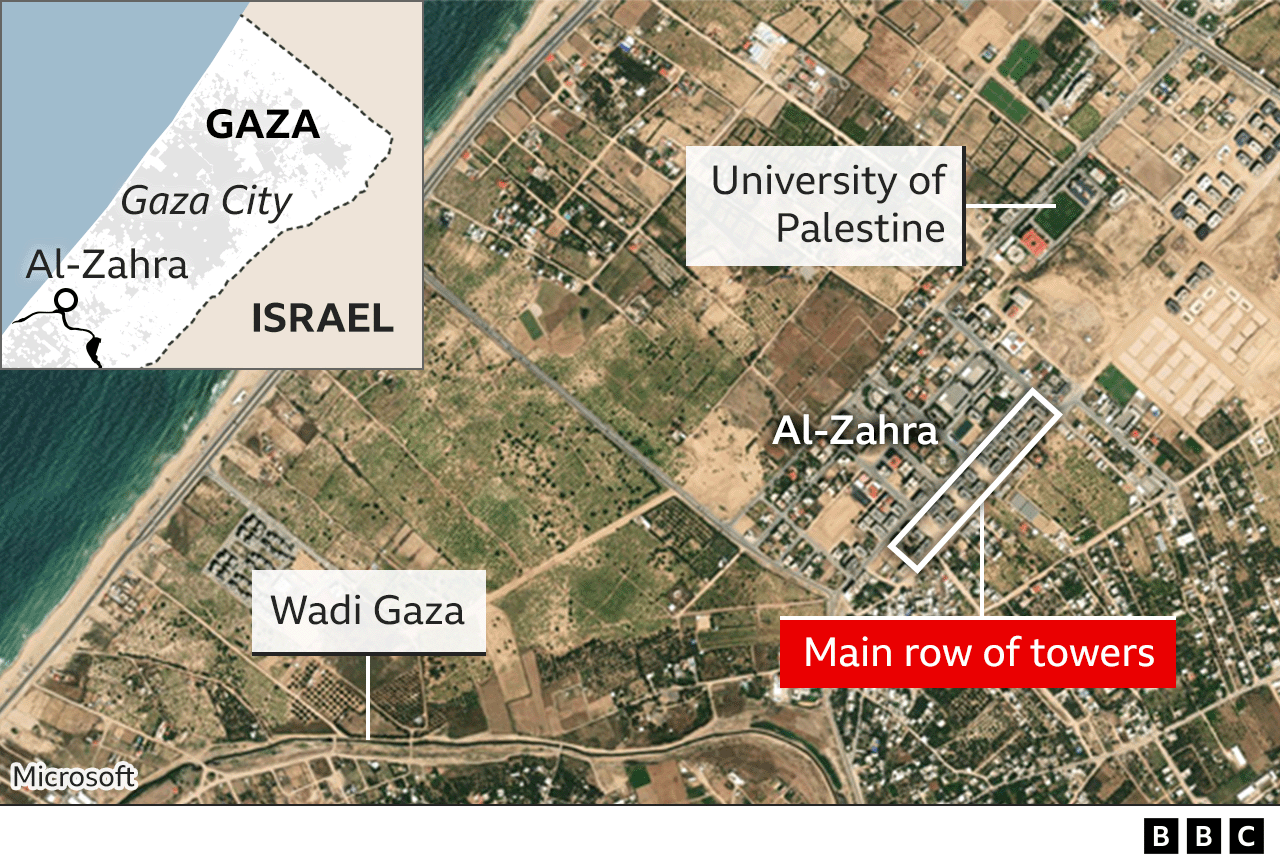
Mahmoud could not understand why his neighbourhood had become a target. “I tried my best to stop him. I asked, ‘Why do you want to bomb?’
“He said, ‘There are some things that we see that you don’t see.'”
The man did not explain what he meant.
“It is an order from people bigger than me and you, and we have an order to bomb,” the voice added, according to Mahmoud.
When the areas around the buildings were clear the man informed Mahmoud that the bombing would begin.
Mahmoud panicked – what if they bombed the wrong building by mistake? “Wait a bit,” the man told him, he says.
An Israeli aircraft circled overhead.
Mahmoud stared at the three towers that neighboured his own apartment block. Then one of them was bombed.
“This is the tower that we want, stay away,” the man on the phone said as the building fell, according to Mahmoud.
The two other blocks were then destroyed.
Images taken in al-Zahra that morning show rubble in the place of those three apartment blocks, while a video shows residents wandering around in shock and bewilderment as they view the immediate aftermath of the strikes. A post on the community Facebook group at 08:28 local time says three towers had been “wiped out completely”.
https://emp.bbc.co.uk/emp/SMPj/2.50.8/iframe.htmlMedia caption,
Watch: The strikes that followed the phone call to Mahmoud Shaheen
When the bombing stopped, Mahmoud remembers the voice telling him: “We’ve finished… you can go back.”
Mahmoud didn’t understand what he had just witnessed. He had lived in this Gaza neighbourhood for 15 years, running a busy dental practice and bringing up his children there.
“I told him al-Zahra is a civilian area. No one is a stranger here… I tried to make him understand. It is not a border area, we have not had previous clashes. It was always an area outside of trouble,” he says.
A post that morning on the community Facebook group urged neighbours to offer beds, food and water to those made homeless.
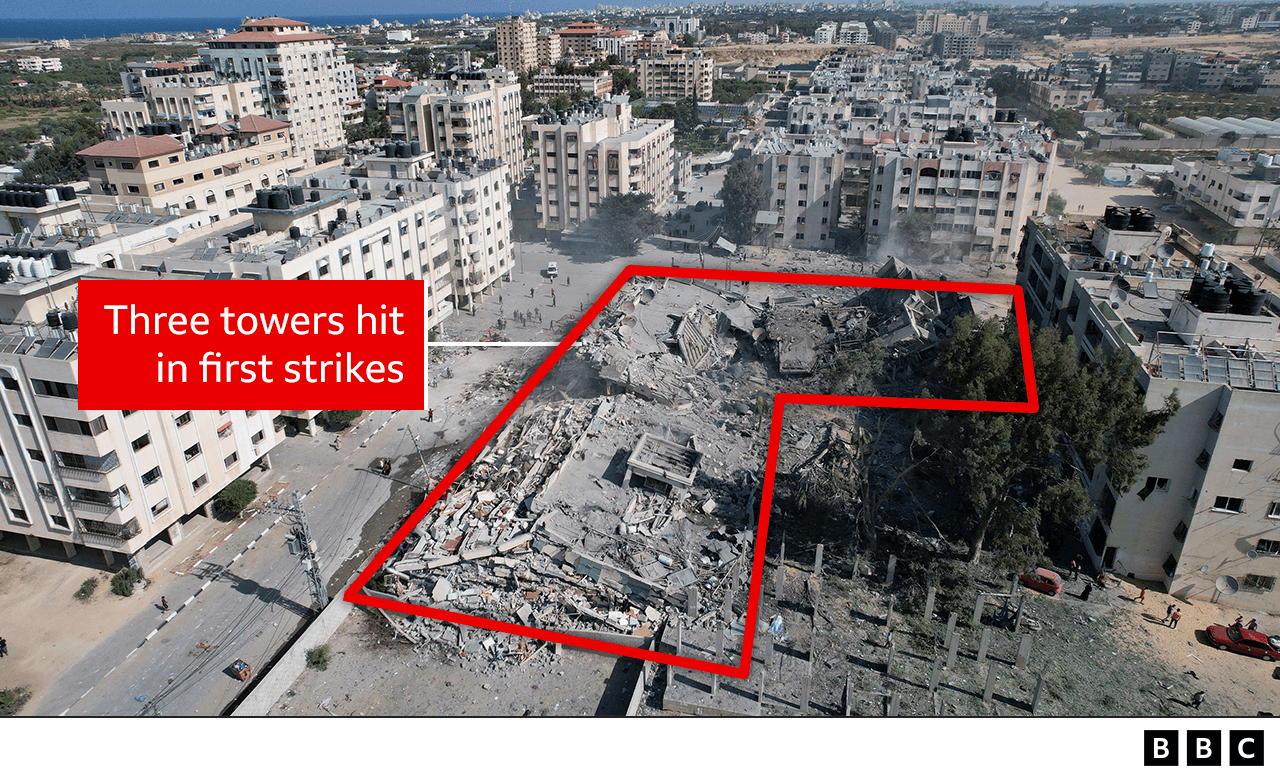
People searched for shelter or places to flee to. Local authorities started clearing the debris from the roads, and putting out fires in the rubble.
Those whose homes remained intact returned. Some people felt a sense of security.
“We went back [home], thinking they won’t bomb again,” one told us.

A missed call from a private number
Later that day, Mahmoud had just finished his Isha, or night-time prayers, at his flat when he saw a missed call from a private number on his phone.
His heart sank. “Immediately I understood there would be an evacuation and bombing, but I didn’t know what the target would be. I thought it might be my home, it might be the home next to me,” he says.
His phone soon rang again. A different man was on the line.
The voice said they had realised Mahmoud was a “wise man” after the events of that morning, which is why they were calling him again.
The man introduced himself as Daoud.
Mahmoud was unnerved by the level of detail the man had about his life – by the familiar way the man addressed him and referred to his son’s name.
According to Mahmoud’s account, this man then made some attempt to explain what was happening in Gaza.
“He started telling me: ‘Did you see how they [Hamas] slaughtered those children with knives?’…
“I told him that according to our Islamic religion, this is forbidden,” Mahmoud recalls.
He urged the voice against “mass punishment”, but Mahmoud knew it was hopeless.
Mahmoud says the man told him more buildings would be destroyed that night, and the dentist would need to order his neighbours to evacuate once again.
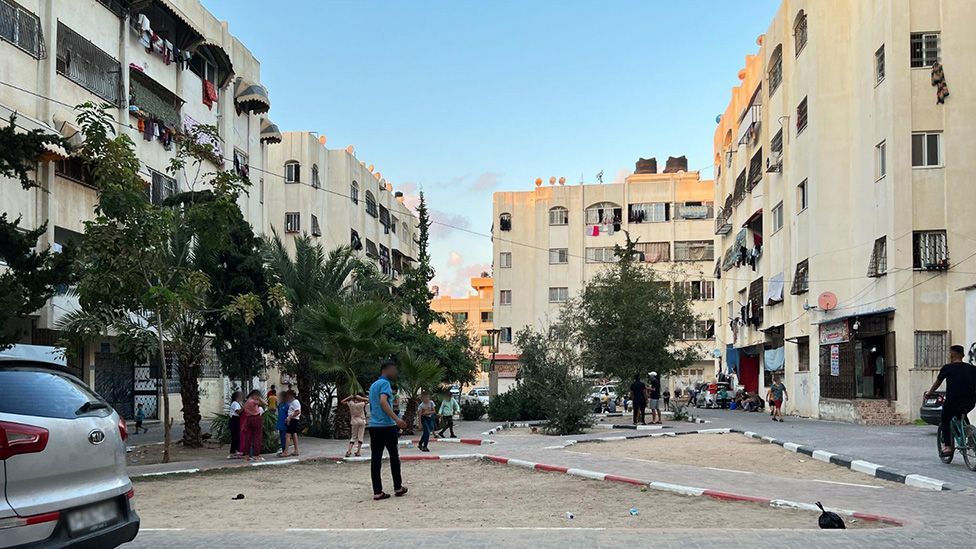
At first, he was told the targets were two buildings next to the three that had been destroyed that morning, as well as a second block of towers.
“He said to me, ‘We want you to inform people to evacuate the area,’ and I said, ‘You need to give me time.'”
He got to work. “We evacuated all the people and even evacuated a third block because it was so close to the second one,” Mahmoud says.
At this point al-Zahra was largely in darkness. Residents say electricity had gone and they were using phones and torches for light as they filled the streets. Some had time to grab pre-packed bags as they left their homes, with items like spare clothing, water, phones and first aid kits. Others did not.
“It was absolute horror,” one resident, Abdullah al-Khatib, says. “We didn’t know where to go. We literally just ran out, taking nothing.”
“Can’t see clearly. Just evacuate,” another says by WhatsApp message, recalling the events of that night. “I just focus on being safe with family.”
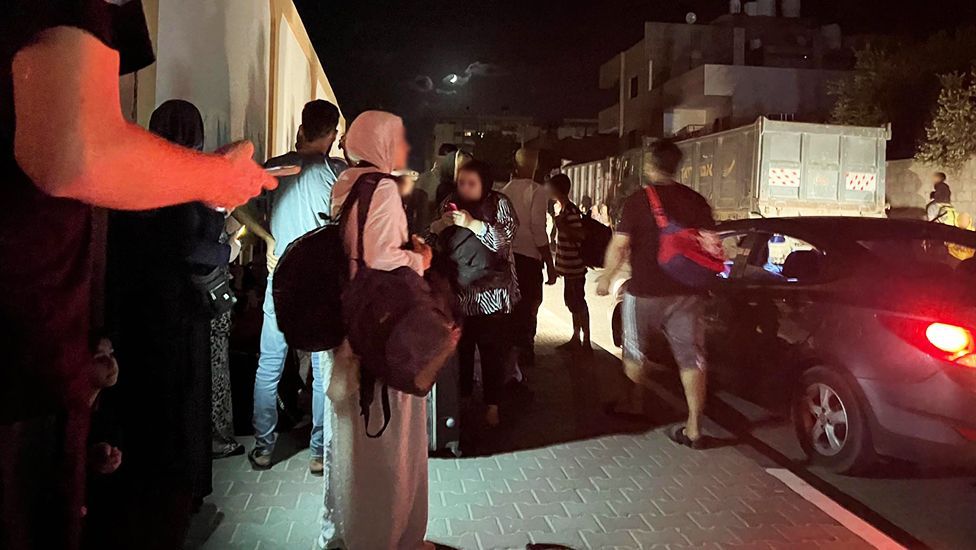
Mahmoud continued trying to buy as much time as he could, talking to the man who called himself Daoud until everyone was clear of the area and had been able to get into their cars if they wanted to drive away.
Three buildings were destroyed. As Mahmoud watched the destruction, the man on the phone said three more buildings would be bombed and then the residents would be allowed to return.
But a change of orders came suddenly.
They would bomb the full row of apartment blocks on the eastern side of the street, Mahmoud recalls being told.
This was more than 20 tower blocks, and hundreds of homes.
“There were people we hadn’t evacuated yet because there was no warning about those buildings. I told him, ‘At least give us until morning, in night time, where will the people go?’
“The answer was, ‘The orders have been received, and we will bomb all towers within two hours.'”
Mahmoud screamed at people to clear the area, running from block to block.
Residents describe chaotic scenes of adults shouting and children weeping. Some parents and children lost one another in the melee.
Despite the panic, Mahmoud stayed on the phone the whole time, trying his best to delay the bombing.
The voice on the other end of the phone continued, without emotion.
“He even told me, ‘Take your time. I won’t bomb unless you give me permission.’
“I said ‘No, it’s not my permission. I don’t want you to bomb anything. If you want me to evacuate, I will evacuate for the safety of the people, but if you want to bomb, don’t tell me you need my permission.
“‘It’s not Mahmoud Shaheen who will bomb al-Zahra.'”
An elderly disabled woman lived in the last block of apartment buildings. Mahmoud and those around him told locals to “drive like crazy” to reach her and get her out.
He and others also worried about a local elderly care home. But the man on the phone said “he’d just destroy the residential buildings”, according to Mahmoud.
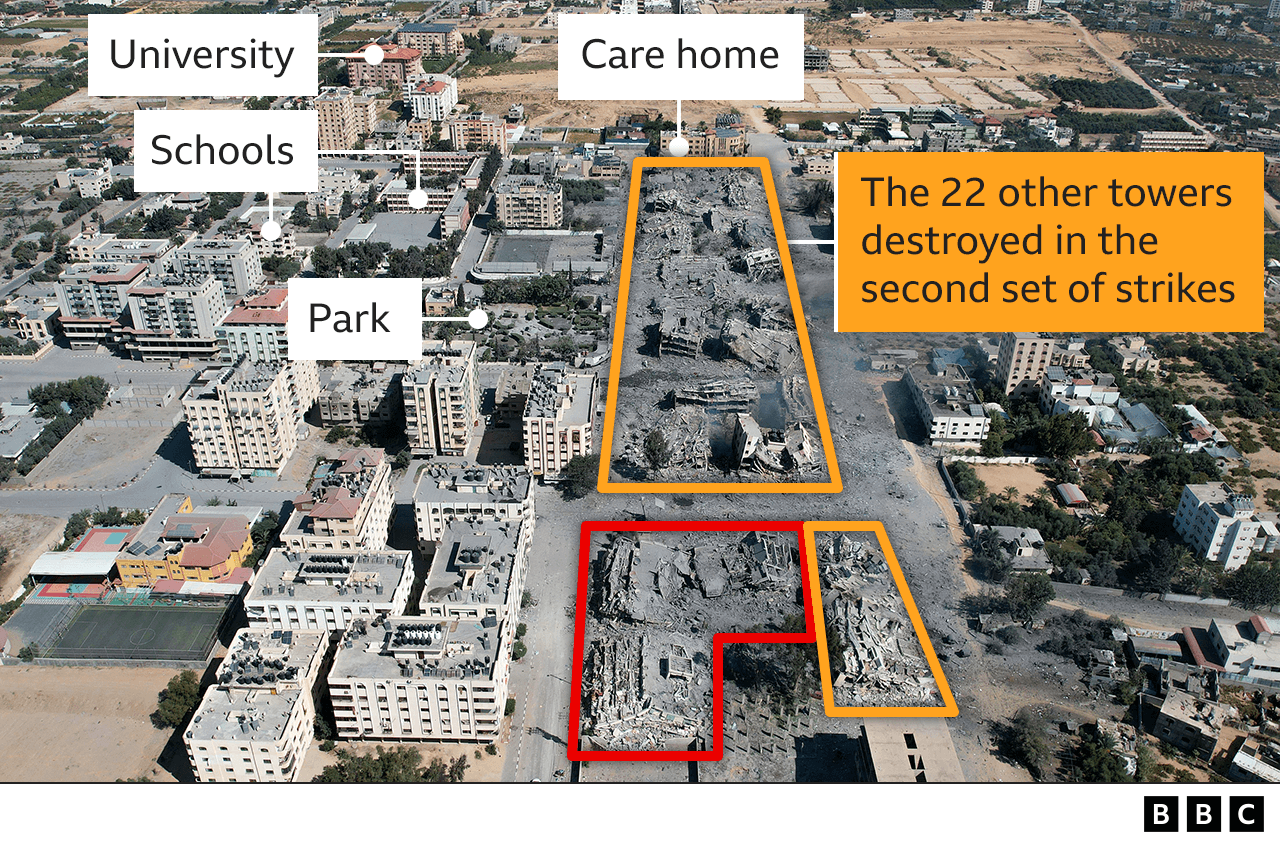
Mahmoud says what he and his neighbours witnessed that night “wasn’t a small bombing” but the “complete destruction of buildings”, as the residential blocks were levelled one by one.
“It was a very hard night for all the people of al-Zahra.”
Photos and video footage posted by residents of the community show the aftermath of the evening bombing.
A post on the Facebook group at 21:11 local time says: “Al-Zahra towers are being bombed right now. God have mercy.”
https://emp.bbc.co.uk/emp/SMPj/2.50.8/iframe.htmlMedia caption,
Watch: The second wave of strikes to hit buildings in al-Zahra, in the evening
One resident speaking to the BBC via WhatsApp message recalled the confusion in the streets. “We didn’t know where we should go – some said we must go to schools, some said we should go to Al Nuseirat [a refugee camp south of the neighbourhood]. During that [time] came cruel bombs.”
Mahmoud asked the man on the phone where he should take his neighbours.
“He said, ‘Either take them east or west’. I said, ‘To take them east will be hard, because to the east of al-Zahra is Al Mughraqa – an already unsafe area. People were already scared to go there.’
“He told me, ‘Take them west to Palestine Street’. I suggested the University of Palestine and he said yes.”
Mahmoud led the crowd, which included not just residents of the tower blocks, but also other displaced people who had sought shelter in al-Zahra after fleeing their own homes elsewhere in northern Gaza.
Other residents have confirmed that they went to the university, and a video posted on the Facebook group shows people walking and driving in that direction, as the person behind the camera prays.
Mahmoud hangs up – but a neighbour’s phone rings
Mahmoud says people waited at the university in fear, listening to the drumming of explosions outside. Frightened dogs in the street tried to find a spot to lie down between women and children.
At one point, Mahmoud says the voice on the phone asked him how much battery he had left. He had 15%. They told him to hang up to preserve it and that they would call back again.
Frequent calls followed.
“They would ring to tell me, ‘Now we will bomb another building,’ ‘Now we will bomb another one.’ They said, ‘We will keep calling until we finish,'” Mahmoud says.
At one point a neighbour’s phone rang, with the voice asking for Mahmoud Shaheen.
Mahmoud had been keeping his distance from his wife and five children all day – both because he was busy evacuating people and because he feared that his contact with Israeli intelligence made him a target.
At the university, he checked they were OK, and then left them again.
The residents of al-Zahra endured a sleepless night. The crowd looked to Mahmoud for updates and answers.
“[They were] saying ‘Hey doctor, did they call you so we can go back? Did they tell you where they will hit?'”
Dawn broke. A post on the community Facebook group at 08:53 local time said: “The bombing is still going on up to this moment.”
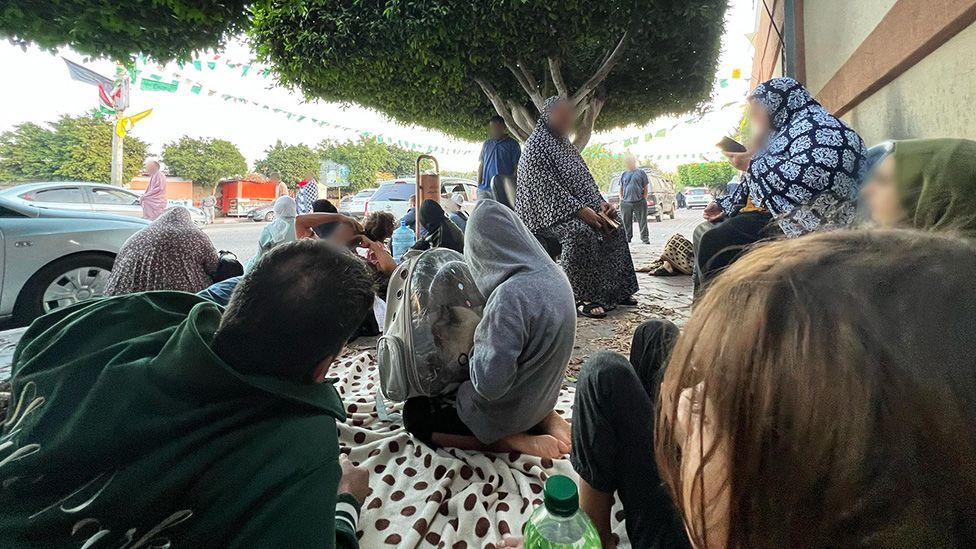
Videos shared overnight captured flashes of orange in the night sky. Others shot in the morning show plumes of grey smoke rising with the sun over the city.
Mahmoud and the man who called himself Daoud kept speaking until the streets went quiet. Then the calls abruptly stopped without any further instructions for the people of al-Zahra.
“They didn’t tell us to go back to our homes, or to evacuate or leave the area. So people waited until noon, and then they started to move,” Mahmoud says.
In the hours and days that followed, the community of al-Zahra, like many in Gaza, disbanded.
“Even for the people whose homes were still standing, there are no services left… the sewage systems are damaged, there is no bakery, there is no supermarket, there is no water, no electricity,” Mahmoud says.
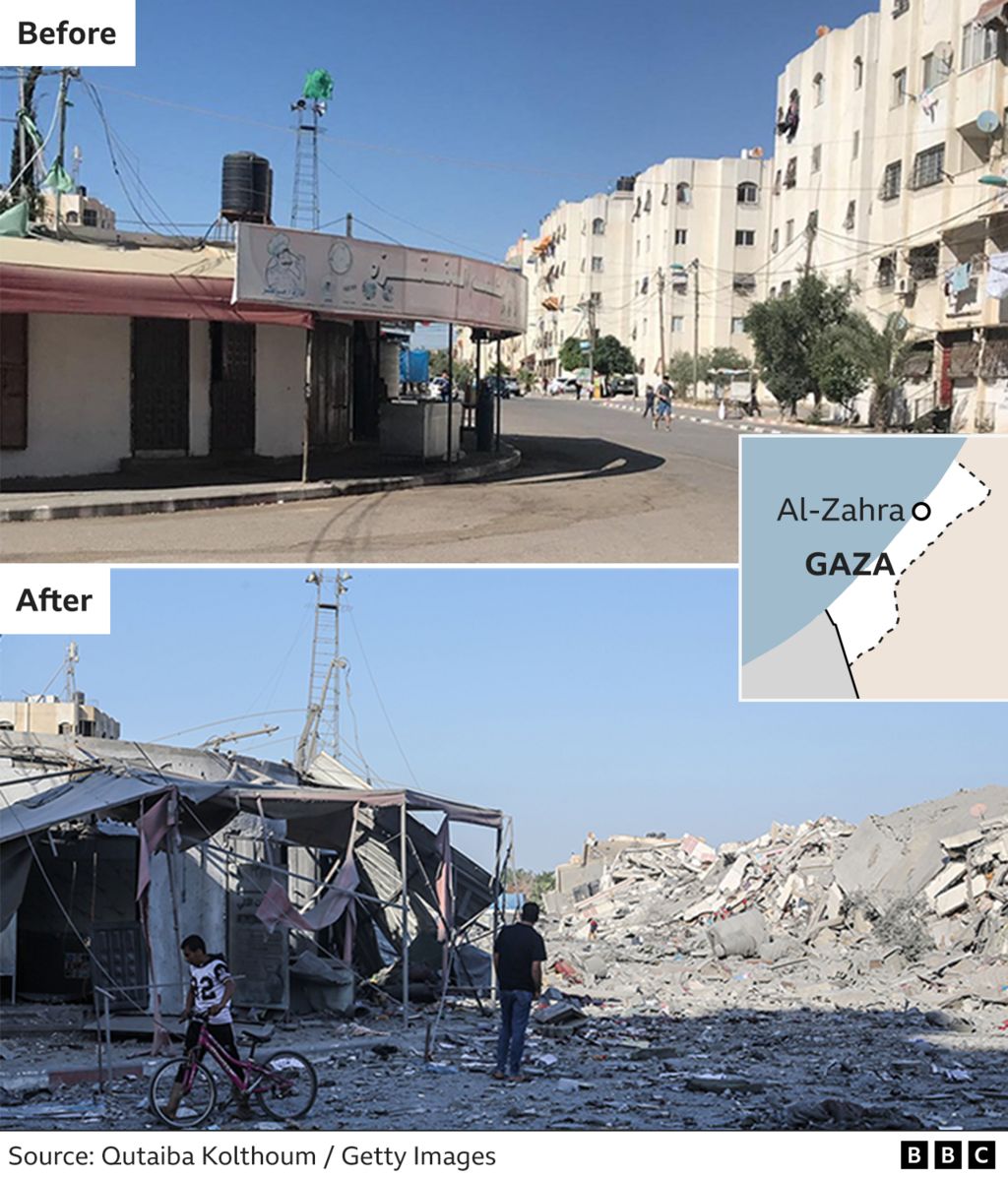
Mahmoud’s block was not destroyed, although it was severely damaged. The neighbourhood where he built up his dental practice over 15 years, and became a linchpin of the community, is now gone. There is nothing left for him in al-Zahra.
He has taken his family to another region of Gaza, where he is staying in a friend’s house that is crowded with people.
“I don’t think about my clinic or my house, I just pray that I survive and stay alive,” he says.
“Material things are nothing, you could die at any second right now. We don’t think about anything else.”
Israel is known to have warned Gazans by calling them, texting them and dropping leaflets before bombing. But in some cases, civilians say they have not been warned ahead of time.

Both sides must protect civilians in Gaza, UN’s human rights chief says

The UN High Commissioner for Human Rights has warned again of serious violations, amounting to war crimes, being committed by both sides in Gaza.
Volker Türk urged Israel and Hamas to seek peace and to stop punishing civilians.
Quote Message: Any use by Palestinian armed groups of civilians and civilian objects to shield themselves from attack is in contravention of the laws of war. But such contact by Palestinian armed groups does not absolve Israel of its obligation to ensure civilians are spared, that the principles of distinction, precaution in attack, and proportionality are respected.” from Volker Türk
Any use by Palestinian armed groups of civilians and civilian objects to shield themselves from attack is in contravention of the laws of war. But such contact by Palestinian armed groups does not absolve Israel of its obligation to ensure civilians are spared, that the principles of distinction, precaution in attack, and proportionality are respected.”Volker Türk
Türk said the “atrocious attacks by Hamas against Israel on 7 October should outrage each and every one of us”. The hostages must be released, the rockets attacks must stop, he said.
“But it is clear that enduring peace and security cannot be delivered by the exercise of fury and pain against people who have no responsibility for the crimes that were committed.”
Where Ignorance Is Bliss – by R J Cook
Comment This will have resulted from U.S pressure and may be necessary, but it will probably prolong the agony. No concessions should have been made until the war crime hostages are released. Until Palestine puts religion into the private zone and recants on the dogma of destroying Israel, electing a government to take these people out of the medieval era their will be no progress or harmony. Israel does not fit the western liberal elite’s highly selective model of a modern diverse society.
Meanwhile the BBC espouses the liberal left’s anxiety that Israel will annex Gaza. If we are going to be teleological about who owns the land, Greeks settled this land before the Jews. Both ethnic groups were there long before the nomadic Arabs moved up from the Gulf States taking the region by force. They are not native to the Mediterranean and have not progressed intellectually or socially since taking Islam on board. However, as my late mother used to tell me “Where ignorance is bliss it is folly to be wise.” She also warned me “Rob, your mouth will hang you.” That stark warning has never been nore relevant to modern life in the west.
R J Cook
November 9th 2023
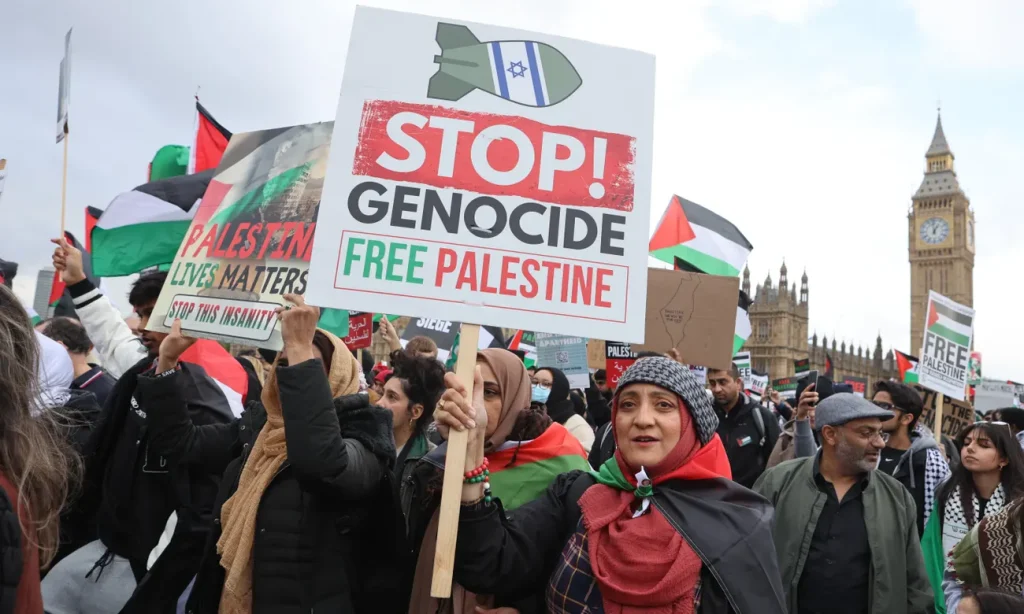
Archie Bland |
| Good morning. Claims that a pro-Palestine march planned in London for Armistice Day this weekend poses a threat to the Cenotaph just won’t go away. Yesterday, the justice secretary, Alex Chalk, said that even those with no malicious intent risked supporting extremists at “an extremely important time in our calendar”, and called for the march to be postponed. “The police must stop any odious behaviour at the Cenotaph,” the Conservative MP James Sunderland said. “But far better for the government to ensure that no protest goes near it in the first place.”Sunderland’s demand may be perplexing to the protesters: the march on Saturday is intended to run from Hyde Park to the US embassy, nowhere near the war memorial in Whitehall.Even so, the government has been pressing the police to apply for a ban on the protest, which the home secretary, Suella Braverman, has described as a “hate march”. (Her Labour counterpart Yvette Cooper declined to say whether she thought a march should be banned yesterday; now a shadow minister, Imran Hussain, has resigned from the front bench in order to advocate for a ceasefire.)Last night, the Metropolitan police commissioner, Sir Mark Rowley, said that the threshold for a ban had not been met. But he is likely to come under significant pressure to change his mind in the next few days. With no march this big having ever been banned before, that would be an extraordinary development.So why is Rowley reluctant – and what is the evidence for the claim that the protests are extremist in nature? Today’s newsletter takes you through what we know. Here are the headlines. |
 |
| Five big stories |
| 1Israel-Hamas war | Israeli forces are “in the heart of Gaza City”, Israel’s defence minister Yoav Gallant said, as Palestinian families waving white flags streamed away from the capital on Tuesday. Meanwhile, after Benjamin Netanyahu said Israel would take indefinite “security responsibility” for the territory, the White House said that it would oppose any reoccupation of Gaza. For the latest, head to the live blog.2Fossil fuels | The world’s fossil fuel producers are planning expansions that would blow the planet’s carbon budget twice over, a UN report has found. Petrostates’ plans would lead to 460% more coal production, 83% more gas, and 29% more oil in 2030 than would be possible under the internationally agreed 1.5C target, the report said.3Vaping | UK ministers are considering a new tax on vapes in a significant expansion of moves to create a “smoke-free generation” that also includes the gradual introduction of a total ban on smoking for children. The move to tax vapes was one of the few surprise measures in a king’s speech that appeared largely designed to create dividing lines with Labour. Read a summary of measures in the bill.4Covid inquiry | The government body set up to coordinate Covid policy had no warning about Rishi Sunak’s “eat out to help out” scheme and felt “blindsided” by the Treasury over it, the inquiry into the pandemic has been told.5Childcare | Poorer families are being “locked out” of expanded free nursery hours, experts have warned, as Guardian analysis reveals that the number of not-for-profit nurseries in England’s most-deprived areas has fallen sharply. Close to a third of not-for-profit nurseries closed their doors or were taken over by private companies, including private equity firms, in the poorest parts of the country from 2018-2022. |
 |
| In depth: ‘Being horrified by what’s happening in Gaza is not a fringe position’ |
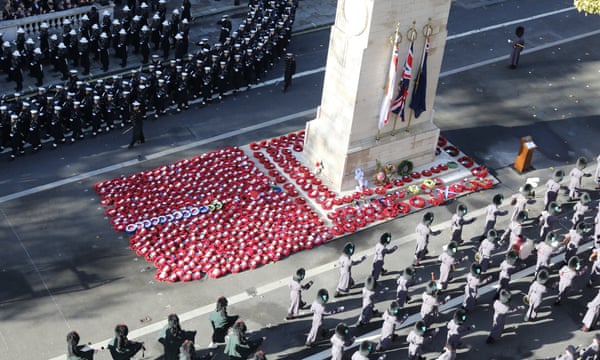 |
| Every Saturday since the 7 October attack by Hamas that killed more than 1,400 Israelis, pro-Palestinian protesters have demonstrated in London and around the UK to voice their opposition to the devastating impact of Israel’s response on Palestinian civilians, thousands of whom have died. At the biggest of these rallies, organisers estimated that half a million people attended; police put the figure at 70,000. But the most urgent disagreement has been over the nature of the demonstrations: whether they have been violent, intimidating, or driven by antisemitism.Many media reports on the protests have accused marchers of condoning Hamas’s horrific attack, and pointed to incidents of racism or violence. And in the context of a huge spike in reported antisemitic incidents since 7 October, some British Jews have said that they find the marches intimidating.But that is not a monolithic view, and leftwing Jewish groups like Na’amod are among those marching. More generally, those who have joined the marches say they have been peaceful, with a clear focus on the demand for protection for ordinary Palestinians. Asked about Suella Braverman’s “hate marches” comment, Sir Mark Rowley said: “I wouldn’t use one phrase to characterise 100,000 people”.“Of course, there are occasionally people who say something outrageous,” one activist who has marched twice told me. “But that’s been true on every march I’ve ever been on, for any cause – that’s the nature of a mass political event – and there is no sense that it’s being condoned. The anxiety about how this is being represented is making people angry, but it’s also making them very focused on rooting that kind of stuff out. Being horrified by what’s happening in Gaza is not a fringe position, and it’s not antisemitic.”All of this is likely to come to a head on Saturday, when the weekly march coincides with Armistice Day.Why is the next march so contentious?As any witness to the annual British poppy paroxysm knows, Armistice Day – 11 November – is a deeply sensitive moment in the UK. Critics of the marchers claim that a pro-Palestine protest that coincides with the commemoration of the end of the first world war is a deliberately provocative act, presumably seeing a peace rally as disrespectful of the military: Suella Braverman has suggested the timing will “give offence to millions of decent British people”.Organisers counter that the timing is coincidental, that a march calling for a ceasefire can hardly be said to run against the spirit of remembrance events, and that the march is due to start two hours after the 11am two-minute silence, with remembrance commemorations largely happening the following day. They note that the planned route for the march does not run past the Cenotaph; the police claim there is a risk of “violence and disorder linked to breakaway groups” and that no protest is “appropriate” this weekend.Besides the specific claims, there is a less tangible sense that the marches have become a focal point for some of the same culture wars that have long attached themselves to Armistice Day and, for instance, whether it is acceptable not to wear a poppy.In the Sun, the rightwing political scientist Matthew Goodwin was pretty explicit: he wrote about a picture showing “three bewildered poppy sellers surrounded by hordes of pro-Palestinian protesters”. The image, he said, represents a clash between “a calm, dignified, patriotic and older Britain” and “a new, younger, radical, far more diverse Britain”, and claimed that a nebulous “cultural inheritance” was being undermined by “radical Islamism”.What evidence is there for the ‘hate marches’ claim? |
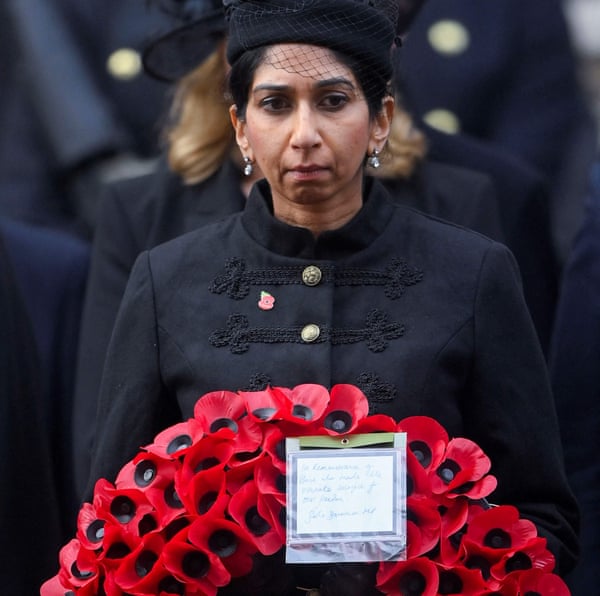 |
| If Suella Braverman (above in 2022) needs a demonstration that the views of an extreme minority are not always met by the support of the group they have attached themselves to, she might look to the cabinet, where Rishi Sunak and other ministers have carefully backed away from her “hate marches” claim since she made it last week.A more concrete measure might be an examination of the arrests on the pro-Palestine marches so far. While police powers around protest have been significantly strengthened in recent years, the number of arrests appears in line with what you might expect at a protest about such an emotive subject: there have been 160 at London events, the Met said, which – if it refers to the four days of action organised under the banner of the Palestine Solidarity Campaign – works out at 40 arrests at each.Nor does an arrest necessarily mean racist behaviour or threats to the wider public: while two of the five charges that resulted from the biggest march were for racially aggravated offences and another was for assaulting a police officer, another related to verbal abuse of police, and the fifth involved throwing a beer can at a protester.Anindya Bhattacharyya, an activist and veteran of protests going back to the Iraq war who has been working with the Free Palestine Coalition, said he had seen a much more focused intent among those marching than in previous years. “People are incredibly on message and ideologically disciplined in a way that mass movements frequently aren’t,” he said. “There is a sense that you need to be precise – that we aren’t just here to scream and shout at the government – we’re here to build a wave of solidarity for Palestinians.”Those who broke with that approach, he said, were isolated. “If we see kids with slogans that are wrong, it’s our job to reach those kids and explain why. And there are those people who are antisemitic, but when they realise that’s not what this is about, in my experience they slink off and don’t come back, because that’s all they’re interested in.”So could Saturday’s march still be banned?In a statement setting out his reasons for letting the march go ahead, Rowley poured cold water on the more serious claims about the march. “The organisers have shown complete willingness to stay away from the Cenotaph and Whitehall and have no intention of disrupting the nation’s remembrance events,” he noted. And, pointing out that it is “incredibly rare” for the power to ban marches to be used – the last time was over a set of English Defence League events in 2012 – Rowley said that “at this time, the intelligence surrounding the potential for serious disorder this weekend does not meet the threshold to apply for a ban”.But “at this time” is important. This morning’s headlines – like “Pray they don’t end up with a riot at the Cenotaph” in the Daily Mail – suggest that pressure is likely to continue to come from the right over the next few days, and Rowley has specifically reserved the right to change his mind “if the intelligence evolves”.The question is whether, if the Met does eventually make that call, it will do anything to reduce the numbers of people who attend, or simply set up a more confrontational situation on the ground. Rowley also noted that there he does not have the power to prevent a static protest: all he can do is stop them marching.If Saturday’s event becomes a test of the demonstrators’ determination to oppose the government as well as Israel’s actions in Gaza, the kind of tensions that Braverman says she is concerned about seem only likely to grow. Meanwhile, Tommy Robinson, the EDL leader, has tweeted: “Saturday 11/11/11 London, your country needs you”. The likes of Robinson don’t need the home secretary’s help in stoking up hatred, but there will be those who feel that she has made his mission easier among the police and protesters alike. |
BBC Biased Broadcasting Corportation – a comment by R J Cook
The following report reminds me of how the authroties handled the so called Capitol Riots & Insurrection along with the terrible fate of disappeared war crimes whistle blower Julian Assange, Jack Teixeira, a 21-year-old member of the Massachusetts Air National Guard, posted sensitive materials in an online chat group, and Ashli Babbitt , who was shot dead during the Capitol Hill riot. Her memory has become as polarizing and as politicized as the day .
Suspicious Police spotters marked and had arrested anti monarchy protestors before they had a chance to protest at the U.K’s 2023 Coronation proecession. I offer this by way of introduction to the following cliched pience about Belarus protesting performers in a counrty infested by western secret service looking for for covert means of regime change so as to further enlighten how it’s better to live as a global capitalist lackey.
I had a promotion blocked for a song I had written about the dangers of Nuclear Power Stations , written in the wake of Chernobyl in 1986 broadcast by the BBC. It was used to hold back my teaching career because it was deemed politicising at a time when Thatcher’s cruel government was closing coal mines while planning more dangerous nuclear sites.
Try performing real protest songs in Britain’s pubs and clubs as I have done. I got beaten up pn the pavement after performing in a bar heavily frequented by off duty London policmen. I had my performed my song about the blatant police killing, recorded on many cameras, of innocent penniless news paper seller by London Riot Squad officer Ian Tomlinson. The police surgeon said he was going to die at that moment, on the street and that the police officer, Stephen Harwood’s violent unprovoked violent assault had nothing to do with it. Police pulled the usual smear tactics that Ian was a drunken alcoholic. Harwood was acquitted.
That is life in Police State Nazi Britain where injustice is a foregone conclusion and people like me get arrested for stating what should be said by the BBC if it really was unbiased. I have done BBC live radio many times and it is like treading on eggshells. I took the briefing notes, wrote myself a script of acceptable responses to what we were going to talk about. I had ambition then but police destroyed that, so the only script I am working on now is for my inevitable suicide. I can’t handle living on this planet of greed, lies , hypocrisy and corruption for much longer.

R J Cook
Belarus musicians behind bars in Lukashenko’s crackdown on dissent
Related Topics
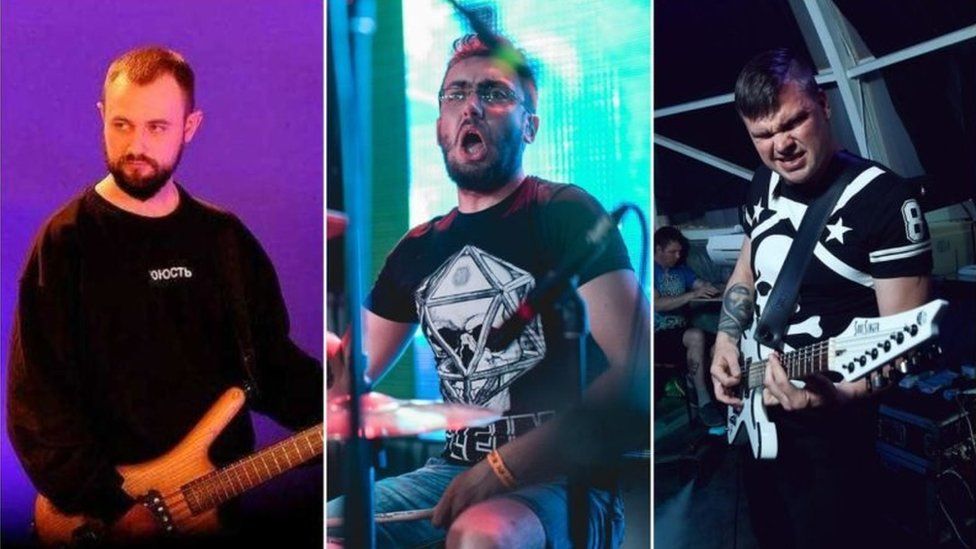
Alina Isachenka
BBC News Russian
The songs of Tor Band have become a symbol of mass protests that spread across Belarus like wildfire when authoritarian leader Alexander Lukashenko remained in power after 2020 elections condemned by the West as fraudulent.
Now, three of the band’s members have been given long jail terms as part of his internal crackdown on dissent.
Tor Band leader Dzmitry Halavach has been given nine years in prison, Yauhen Burlo was jailed for eight years, and Andrei Yaremchyk for seven and half years.
Human rights groups speak of blacklists carrying the names of musicians, bands and artists banned from performing.
Those deemed “disloyal” to the Lukashenko government are often replaced with artists from Russia, says PEN Belarus, part of a worldwide association of writers which focuses on freedom of expression.
“Independent culture has literally returned to the practices of the Soviet era – it went underground,” said the group’s head, Tatyana Nyadbai.
The musicians of Tor Band were convicted in the southern city of Gomel last week of multiple criminal charges, including creating an “extremist formation” and insulting the Mr Lukashenko.
- Belarus declares 19th Century nationalist poems ‘extremist’
- Belarus isolates political prisoners to break their spirit
Their sentences have been condemned as “an unprecedented prison sentence for creativity” by Pavel Sapelka of the Viasna Human Rights Centre.
Belarus’s exiled opposition leader, Svetlana Tikhanovskaya, whose own husband is currently serving an 18-year jail sentence, wrote on social media: “Lukashenka’s regime shows its fear. Music can be silenced in courts, but never in our hearts.”
The band members were arrested in October 2022 after the biggest crackdown on protests under Lukashenko’s 30-year rule.
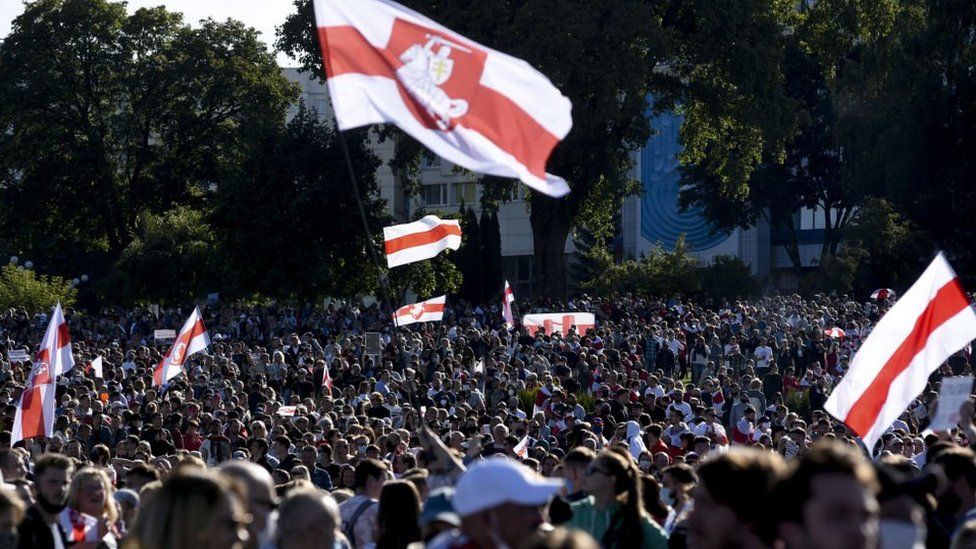
Many Belarusians have fled fearing for their lives, after thousands were arrested, assaulted and thrown in jail.
Mr Burlo was on crutches and unable to stand up to hear the verdict, Radio Free Europe’s Belarus Service reported.
It quoted a source saying the trio’s relatives “were crying during the verdict, one of them fainted”.
“They were recognised as an ‘extremist formation’ solely for the lyrics of their songs, but those who listened to these songs know there is nothing there that calls for violence or incites hatred,” Mr Sapelka told the BBC.
Tor Band are but the latest from the culture scene to be targeted since 2020, according to PEN Belarus. Between January and June of this year there have been 925 cases of human rights violations, it has reported. These include censorship and denying the right to a fair trial.
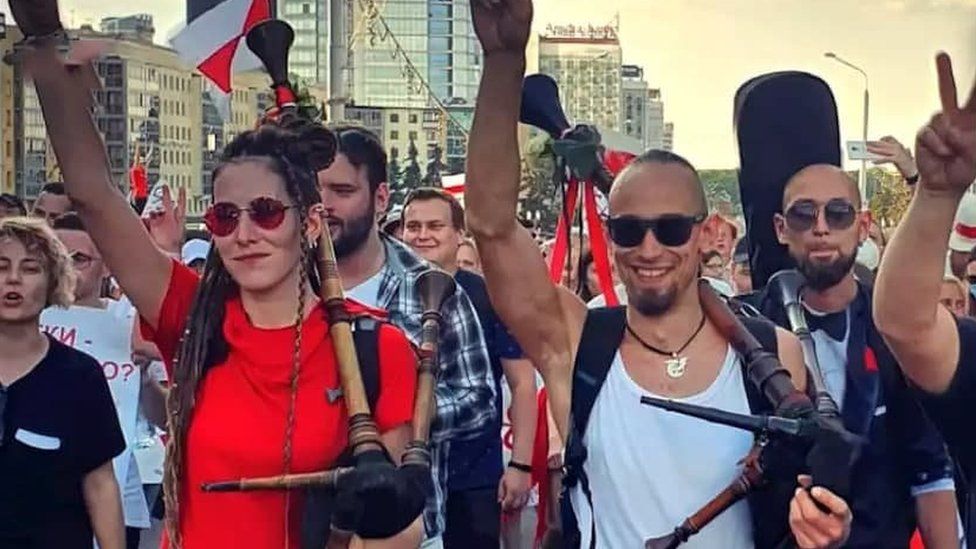
Last week, well-known singer and TV host Larisa Gribaleva was detained, the Viasna Human Rights Centre reported.
Ms Gribaleva spoke out against violence in 2020, and Viasna says she was included in a “secret list of 80 performers who are prohibited from performing”.
Who else is on the list is unknown.
The artist later wrote on Facebook she was safely back home.
“When the authorities detain yet another cultural figure, they want to send a message to those performers who are still free in Belarus and have not yet expressed their loyalty to the regime,” Mr Sapelka said.
Earlier this year two musicians of the Belarusian band Irdorath left the country after serving two-year jail sentences for participating in the protests.
There was no such escape for artist Ales Pushkin, who died in prison in July while serving his five-year sentence for inciting hatred and “desecration of state symbols”.
November 6th 2023
Israel – An Anglo U.S Bodged Job – by R J Cook

Britain’s national broadcaster, the BBC, has shifted the Israel Gaza issue emphasis well away from the HAMAS October 7th 2023 hideous medieval attack on innocent Israelis of all ages, including babies. The barbaric nature of these crimes against humanity is not discussed. It is difficult to find words to describe a culture that has so called soldiers cutting open a pregnant woman’s stomach, ripping out her baby then stabbing the newborn in front of her – then they shot her in the head before killing the rest of her family in the Kibbutz. As if that was not sick enough, babies were cooked alive in family ovens in front of screaming parents. Then they killed the families.
Thus I am not surprised that Israel has simply had enough. BBC spares the world the details of the pop festival HAMAS massacre of young people. Mobile phone footage showed large bearded HAMA soldiers ( sic ) bundling a screaming Jewish girl being bundled between two of these disgusting perverted brutes on to a motorcycle. The girls skull was found by IDF soldiers just across the Gaza border.
HAMAS have been very clear that they are working to annihilate Israel . Like Londom’s protestors, they cry out for Jihad and the global caliphate. Western media does not want us to know about that, with one elite upper middle class journalist noting that the word also meant self improvement. I guess taking other people’s lands and racist massacres might be their idea of self improvement. Islam is another world. Faced with criticism they trot out the racism mantra because they are highly sensitive and easily take offence. This they are offended that Israel is upset by the vile unprovoked attack on October 7th. The BBC is keen to publish their pain with all the ongoing images of desperation and ranting. But at no stage have I seen or heard any of these so called victims ever denigrate the HAMAS Government that they nearly all voted for. I am not aware that BBC or Sky has even asked for their opinion because very few of Gaza’s population would argue with Hamas.
Poor little GAZA has 80% dependency on foreign aid. Gaza also relies on Israel for water and energy. There are different types of Muslim and Egypt as had issues with Islamic extremists who flourish in and express the dogma which has caused massive problems in the Sinai. That is why Egypt is so reluctant to open the Sinai and why the Scottish Regional Government has issued them a welcome instead.
This is the type of mechanism that is inflating Britain and Europe’s population. It is also an emergent issue in the U.S. This is why western leaders are treading very carefully in the wake of massive pro Palestinians in London, Washington and Paris to name just a few. It is interesting that Arab countries are allowed monoculture but western whites have to accept the disingenuous multi culture – where even a person’s sexuality or sexual identit is defined as a different culture. For sure Muslims will have none of that.
Islamic political influence is rapidly increasing in the western world in line with massive population growth and their international identity. Those of us who rejoiced at developing secularism are seeing the clock turned back to the Dark Ages.
The most interesting difference between Jews and Muslims is that the former have never been content with living on foreign aid or in the past. Ignorant PC history teachers do not want any one to know that the Jews were in Israel when Jesus lived. Jews, who unlike Muslims, do not have any infidels to ostracise or make a spectacle of their religion, went through hell in the 1930s and 1940s. Jealousy and scapegoat-ism was rife and still is. Britain’s Prime Minister Disraeli suffered from anti Semitism. The British elite refused Hitler’s offer of accepting Jewish refugees so signing their death sentence. World War Two was never about saving them and their post war role in creating the State of Israel with the U.S was expedience gone mad and a bodged job accident waiting to happen.
R J Cook
Six charged after London pro-Palestinian protest
Related Topics
- Israel-Gaza war
- Britain’s national broadcaster, the BBC, has shifted the Israel Gaza issue emphasis well away from the HAMAS October 7th 2023 hideous medieval attack on innocent Israelis of all ages, including babies. The barbaric nature of these crimes against humanity is not discussed. It is difficult to find words to describe a culture that has so called soldiers cutting open a pregnant woman’s stomach, ripping out her baby then stabbing the newborn in front of her – then they shot her in the head before killing the rest of her family in the Kibbutz. As if that was not sick enough, babies were cooked alive in family ovens in front of screaming parents. Then they killed the families.
- Thus I am not surprised that Israel has simply had enough. BBC spares the world the details of the pop festival HAMAS massacre of young people. Mobile phone footage showed large bearded HAMA soldiers ( sic ) bundling a screaming Jewish girl being bundled between two of these disgusting perverted brutes on to a motorcycle. The girls skull was found by IDF soldiers just across the Gaza border.
- HAMAS have been very clear that they are working to annihilate Israel . Like Londom’s protestors, they cry out for Jihad and the global caliphate. Western media does not want us to know about that, with one elite upper middle class journalist noting that the word also meant self improvement. I guess taking other people’s lands and racist massacres might be their idea of self improvement. Islam is another world. Faced with criticism they trot out the racism mantra because they are highly sensitive and easily take offence. This they are offended that Israel is upset by the vile unprovoked attack on October 7th. The BBC is keen to publish their pain with all the ongoing images of desperation and ranting. But at no stage have I seen or heard any of these so called victims ever denigrate the HAMAS Government that they nearly all voted for. I am not aware that BBC or Sky has even asked for their opinion because very few of Gaza’s population would argue with Hamas.
- Poor little GAZA has 80% dependency on foreign aid. Gaza also relies on Israel for water and energy. There are different types of Muslim and Egypt as had issues with Islamic extremists who flourish in and express the dogma which has caused massive problems in the Sinai. That is why Egypt is so reluctant to open the Sinai and why the Scottish Regional Government has issued them a welcome instead.
- This is the type of mechanism that is inflating Britain and Europe’s population. It is also an emergent issue in the U.S. This is why western leaders are treading very carefully in the wake of massive pro Palestinians in London, Washington and Paris to name just a few. It is interesting that Arab countries are allowed monoculture but western whites have to accept the disingenuous multi culture – where even a person’s sexuality or sexual identit is defined as a different culture. For sure Muslims will have none of that.
- Islamic political influence is rapidly increasing in the western world in line with massive population growth and their international identity. Those of us who rejoiced at developing secularism are seeing the clock turned back to the Dark Ages.
- The most interesting difference between Jews and Muslims is that the former have never been content with living on foreign aid or in the past. Ignorant PC history teachers do not any one to know that the Jews were in Israel when Jesus lived. Jews went through hell in the 1930s and 1940s. Jealousy and scapegoat-ism was rife and still is. Britain’s Prime Minister Disraeli suffered from anti Semitism. The British elite refused Hitler’s offer of accepting Jewish refugees so signing their death sentence. World War Two was never about saving them and their post war role in creating the State of Israel with the U.S was expedience gone mad and a bodged job accident waiting to happen.
- R J Cook
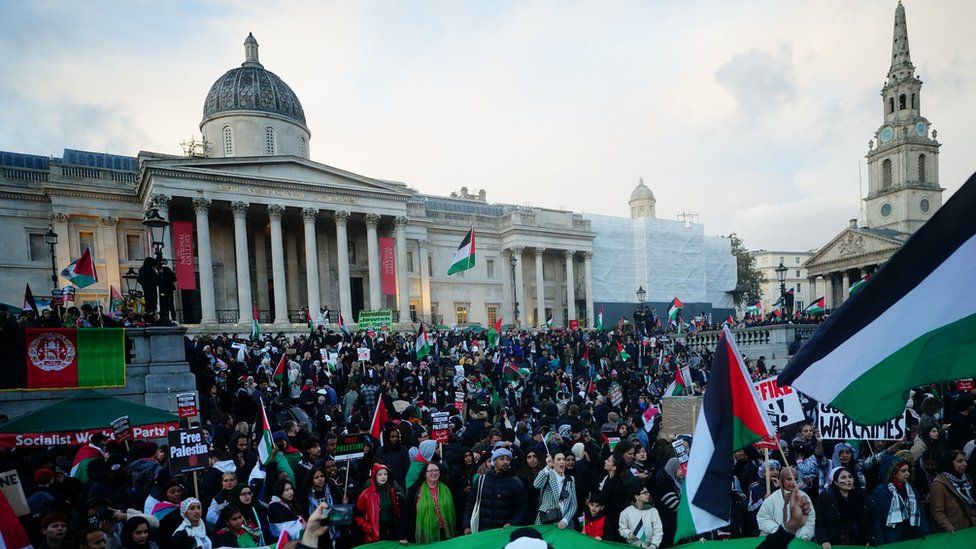
Six people have been charged following a pro-Palestinian march in central London on Saturday.
In total, 29 people were arrested by the Met Police, on suspicion of public order offences, racially motivated crimes and assaulting a police officer.
The force said fireworks were thrown at officers and a pamphlet reported to support Hamas was on sale.
Cdr Karen Findlay said the Met would take action “at every opportunity” regarding crimes fuelled by hate.
- Israel-Gaza war: When can protesting be illegal?
- Met cuts ties with adviser after chant video emerges
- Met Commissioner wants clarity on extremism
“While the vast majority of people demonstrated peacefully, there were various breakaway groups whose behaviour was completely unacceptable.
“More than 1,300 officers were on duty on Saturday, intervening where necessary to prevent further disruption. Sadly we saw an increase in violence against them, most significantly when four officers were injured when fireworks were thrown in their direction. All bravely carried on in their duties.
“We will continue to be sharper in our response and take action on any placards being carried at protests which are inflammatory and incite racial hatred, or purport to be supporting a proscribed organisation. These are offences and any such banners or material will be assessed by the Met’s Counter Terrorism Command.”

More on Israel-Gaza war
- Follow live: Latest updates
- Watch: Video said to show Al-Quds hospital after nearby blast
- Israel: Could ground invasion of Gaza meet its aims?
- Explained: What is happening in Israel and Gaza, and why now?
- History behind the story: The Israel-Palestinian conflict
BreakingHamas-run health ministry says more than 10,000 now killed in Gaza
The number of people killed in Gaza since Israel began bombing the territory has now reached 10,022, according to the Hamas-run health ministry in Gaza.
The figure comes after a night of intense Israeli strikes, with the Israeli military saying they hit hundreds of targets including a Hamas military compound.
The director of the largest hospital in Gaza City told the BBC earlier that some 200 people were killed.
A group of UN humanitarian agencies and charities have said the “horrific killings” of civilians in Gaza are an “outrage”. Thousands of children are believed to be among the dead.
Some politicians, including US President Joe Biden, have questioned the accuracy of the Gaza health ministry’s figures.
When asked about this, the World Health Organization said they believed the numbers were reliable. Like other government agencies in Gaza, the health ministry is controlled by Hamas, a proscribed terror group in the UK, US and EU.
Israel launched its attacks on Gaza after Hamas killed more than 1,400 people in Israel and kidnapped more than 200 others on 7 October. The Israeli military says its operation is aimed at destroying Hamas completely.
Our talks covered what we can do to bring lasting peace – Blinken

We heard from US Secretary of State Antony Blinken earlier as he left Turkey, ending his tour of the Middle East.
He said his talks in the region have been focusing on three things – how to expand humanitarian assistance, how to stop the conflict from spreading and also “what we can do to set the conditions for a durable, sustainable, lasting peace of Israelis and Palestinians”.
Speaking after talks with Turkish Foreign Minister Hakan Fidan in Ankara, Blinken also said:
- Aid: The US is working “very aggressively” and in “very concrete ways” to get additional aid into Gaza. He told reporters he’d made “good progress in working to expand that” and they’ll see assistance expand significantly “in the days ahead”. He said the US shared the concern over the “terrible toll” on the Palestinians in Gaza
- Hostages: We remain “very focused” on the hostages held by Hamas and “making sure we’re doing everything possible to bring them home”, he said
- Gaza deaths: Blinken said “we’ve engaged the Israelis on steps they can take to minimise humanitarian casualties”
- Has he accomplished his goal? Asked whether he felt he had accomplished his mission, Blinken told reporters: “All of this is a work in progress.” And pressed again, Blinken replied: “Sometimes the absence of something bad happening may not be the most obvious evidence of progress, but it is”
November 5th 2023
Top stories
News about US air base, Turkey

Pro-Palestinian crowds try to storm air base housing U.S. troops in Turkey

Turkish police tear gas pro-Palestinian protesters at air base

‘Freedom convoy’ to US military base in Turkey calls for Gaza ceasefire

Turkish police tear gas pro-Palestinian protesters at air base used by US forces

Pro-Palestinian protesters try to storm US military base in Turkey
Turkish police tear gas pro-Palestinian protesters at air …

The Times of Israelhttps://www.timesofisrael.com › turkish-police-tear-ga…
2 hours ago — Hundreds march on Incirlik Air in southeast of country to protest US secretary of state’s visit to Ankara; officers use water cannon to keep …
Turkish police tear gas pro-Palestinian protesters at air base

France 24https://www.france24.com › France 24 › Live news
8 hours ago — The protest outside the Incirlik Air Base in southeastern Turkey was organised by the IHH humanitarian relief fund, which in 2010 led a …
Pro-Palestinian protesters try to storm US military base in …

Metrohttps://metro.co.uk › News › World
5 hours ago — Pro-Palestine protesters clashed with Turkish police outside a US airbase in Adana amid the arrival of Anthony Blinken in Ankara.
Hezbollah steps back from all-out war on Israel over Gaza – for now
Related Topics
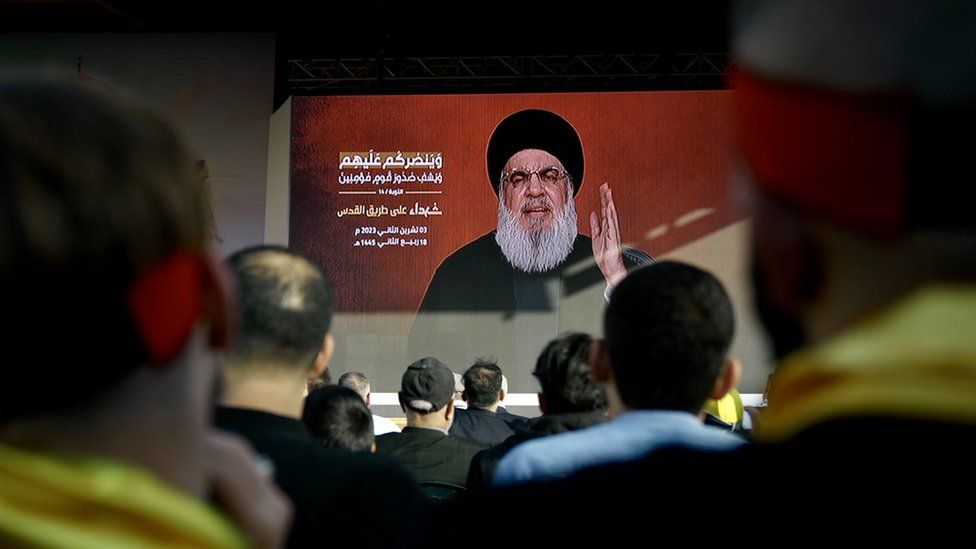
By Orla Guerin
BBC News, Beirut, Lebanon
The Hezbollah leader took his time to respond to the past month of bloodletting which has turned the Middle East into a tinder box.
And when Hassan Nasrallah spoke, what he did not say was as important as what he said.
There was no declaration of all-out war on Israel. At least, not now.
Few in Lebanon had expected one.
Nasrallah knows there is little appetite in this country for another war with its powerful neighbour. The last one was in 2006.
Lebanese have troubles enough, with a shattered economy and a bankrupt political system.
That is a powerful deterrent, along with the two American aircraft carriers recently deployed to the eastern Mediterranean.
Hassan Nasrallah addressed the segregated rally – thousands strong – by video link from an undisclosed location.
It was not just his supporters who were hanging on his every word. His speech was required listening in Tel Aviv and in Washington. What Hezbollah does – or does not do – could be crucial now.
The Hezbollah leader declared that “all options are open,” adding that “the situation could escalate militarily at any time”.
That would depend, he said, on Israel’s actions in Gaza, and its approach towards Lebanon.
Hezbollah is already stepping up the pressure on Israel with an escalation in cross-border attacks, which has forced the Israeli army to divert troops to the area.
But Hamas wants more from its ally.
‘100% Palestinian operation’
At times, the fiery cleric sounded almost defensive about what his fighters have done so far.
“What’s taking place on our front is very important and significant,” he said.
“Those who claim that Hezbollah should engage swiftly in an all-out war with the enemy might see what is taking place on the border as minimal. But if look objectively, we will find it sizeable.”
He said 57 Hezbollah fighters had been killed in recent weeks.
Predictably, he left the door open for a further escalation.
“I assure you this will not be the end,” he said, “this will not be sufficient.”
Hassan Nasrallah insisted that the 7 October attacks by Hamas were a “100% Palestinian operation”, carried out in great secrecy, concealed even from Hamas’s allies.
“It has no relation to any regional or international issues,” he said, in effect claiming he did not know and neither did Iran.
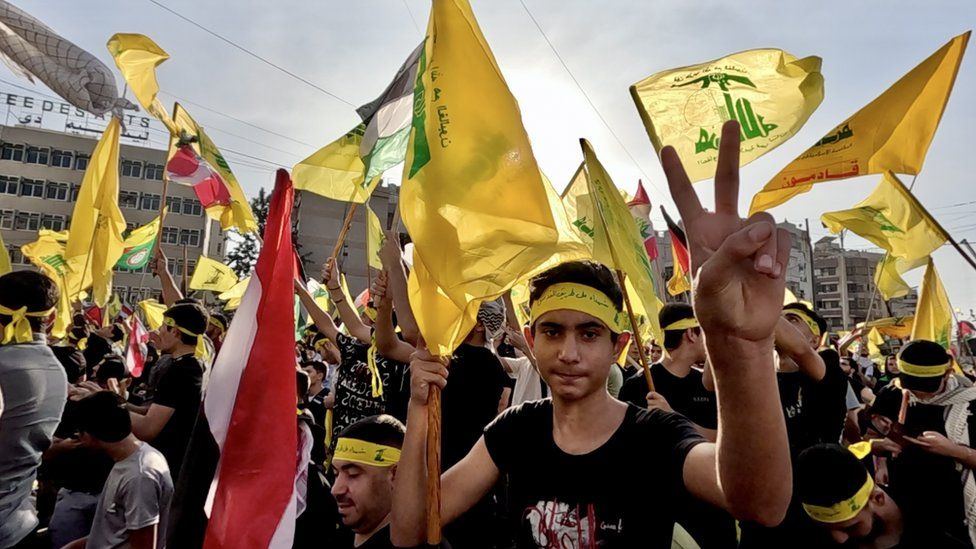
Crowds chanted, “We are with you Nasrallah” as they waited under a hot sun at a rally in southern suburbs of Beirut.
On a rooftop overlooking the gathering, a masked man kept watch, with a bulky jamming device to block drones.
This is Hezbollah heartland, where many are devoted to the Islamist group, which – like Hamas – is classed as a terrorist organisation by the UK and the US, and many other governments.
“I don’t think he [Nasrallah] is going to bring war to the whole country,” said Fatima, a 17-year-old journalism student with gold rimmed glasses, “but whatever he decides, I am fine with it. If it is war, I am not afraid. I don’t think there is anything better than dying for a good cause. We are standing with our Palestinian brothers and sisters.”
The indications are that Hezbollah plans to leave the war in Gaza to Hamas, for now.
But that calculus could change quickly if Hamas comes close to defeat.
If Israel achieves a victory in Gaza, the cost could be a much bigger war – with Hezbollah.

Hamas hostages: Who are the people taken from Israel?
- Published
- 3 days ago
Related Topics
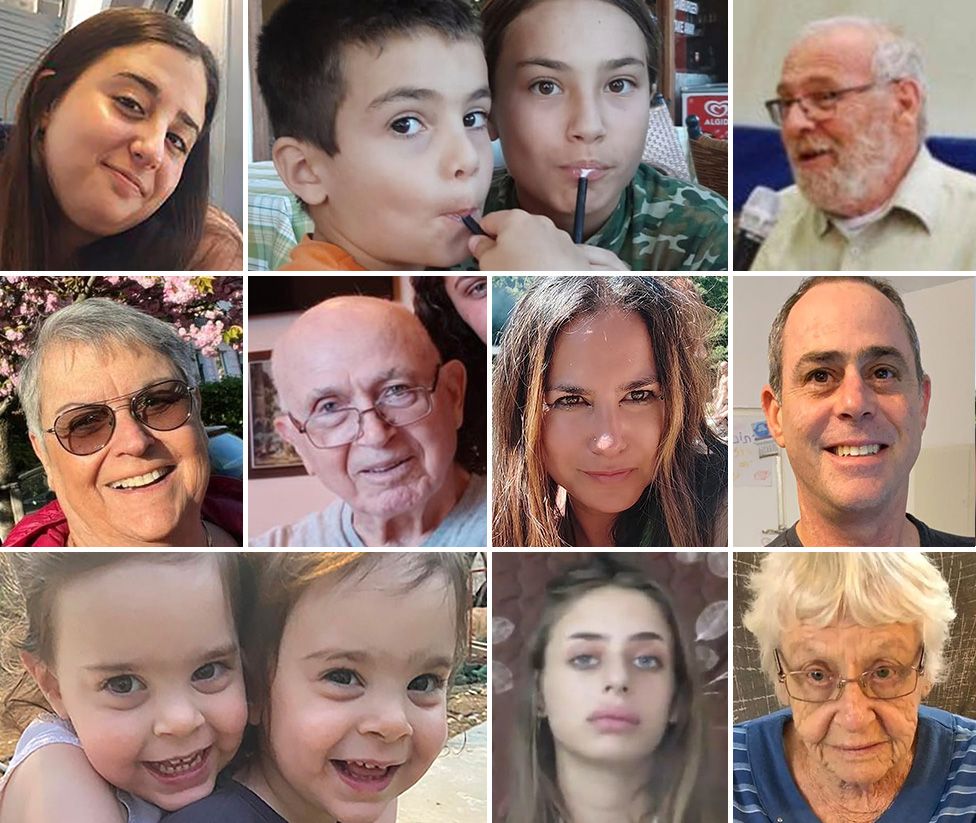
The Israeli military says that 242 people are being held hostage by Hamas.
Four hostages have been released and another was freed by Israeli forces. Ori Megidish, an Israeli solider, was freed during ground operations in Gaza on 29 October. Two women, Nurit Cooper and Yocheved Lifschitz, were freed on Monday 24 October. On Friday 20 October, two US hostages – a mother and daughter – were also freed.
Hamas says it has hidden the hostages in “safe places and tunnels” within Gaza. Israel Defense Forces (IDF) have previously said the hostages include 20 children and between 10 and 20 over-60s.
The IDF have notified some families that their loved ones are being held hostage, while other families – whose relatives remain unaccounted for – believe they have been taken.
These are the stories of hostages taken from Israel on 7 October which have been either confirmed by the BBC or credibly reported.
This list is regularly updated and names may change, as some people feared kidnapped are confirmed to have been killed or released.
Last updated on 2 November 2023 at 11:24 GMT

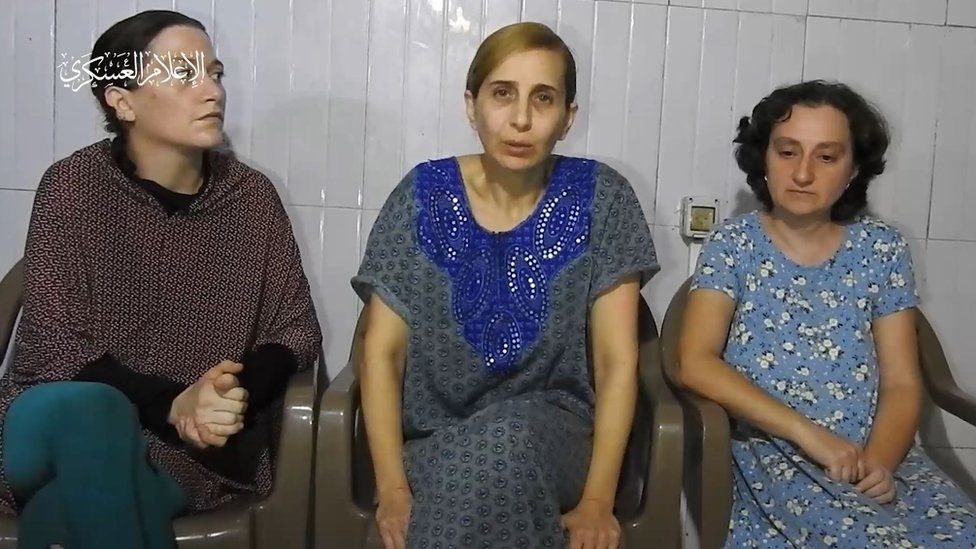
Rimon Buchshtab Kirsht, 36, Daniele Alony Mevneh, 44, and Lena Trupanov, 50, appeared in a hostage video released by Hamas on 30 October.
Daniele Alony Mevneh is being held with her daughter Amelia Mevneh, five; Daniele’s sister Sharon Alony Cunio, 34, her husband David Cunio, 33, and their three-year-old twin daughters Emma and Julie. They were kidnapped from a kibbutz in southern Israel, Sharon and Daniele’s brother Moran told CNN. Moran said he was told by a witness that the family had taken shelter in a safe room but Hamas had then set fire to the house – they were taken hostage after leaving to escape the flames.
Elma Avraham, 84, had lived at Nahal Oz kibbutz for nearly 50 years prior to her kidnap, a spokesperson for the community said. The spokesperson added that she was filmed being driven away by hostage-takers.

Keith Seigel, 64, and his wife Adrienne – often known as Aviva – Seigel, 62 were taken from their home in Kibbutz Kfar Aza, Keith’s brother Lee Seigel told the BBC.
Amiram Cooper, 85, and his wife Nurit, 80, were taken from their home in Kibbutz Nir Oz, a kibbutz in southern Israel close to Gaza, their daughter-in-law Noa told the BBC. The family last spoke to the couple during the Hamas attack, Noa said, when the couple were in their safe room. The family later traced Amiram’s phone to Gaza. On Monday 23 October, Nurit was one of two women to be released.
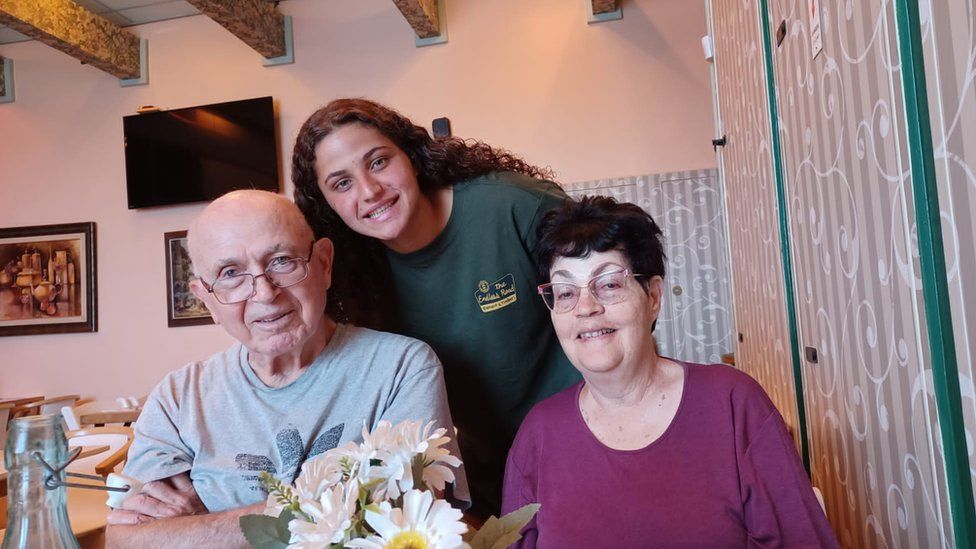
Oded Lifshitz, 83, and his wife Yocheved, 85 were taken hostage from Kibbutz Nir Oz. On Monday 23 October, Yocheved was one of two elderly women to be freed. After hearing the news of her mother’s release, their daughter Sharone – a London-based artist – said: “While I cannot put into words the relief that she is now safe, I will remain focused on securing the release of my father and all those – some 200 innocent people – who remain hostages in Gaza.”
Ohad Munder-Zichri, 9, his mother, Keren Munder, 54, and his grandparents Ruthi and Avraham Munder, both 78, were kidnapped from Kibbutz Nir Oz, Israeli officials say. The Associated Press reported that a phone signal has been traced to Gaza.
Clara Marman, 62, her partner Louis Har, her siblings Fernando Simon Marman and Gabriela Leimberg, and Gabriela’s teenage daughter Mia Leimberg are believed to have been taken from Kibbutz Nir Yitzhak. The group of five Argentinian-Israelis had been hiding in their safe room, according to Louis Har’s daughter who was texting with him. The last message came at 11:04, the Times of Israel reported. Clara’s daughter Maayan Sigal-Koren said they had been told by the Israeli army that their phones had been tracked to Gaza, according to Vatican News.

More on Israel-Gaza war
- Follow live: Latest updates
- Analysis: Jeremy Bowen’s five new realities after four weeks of war
- From Gaza: Stories of those killed in Gaza
- Watch: Breaking down videos from Gaza’s secret tunnels
- Explained: Ros Atkins on… Calls for a ceasefire in Gaza
- History behind the story: The Israel-Palestinian conflict
November 3rd 2023
Germany: Illegal migration rise prompts border crackdown
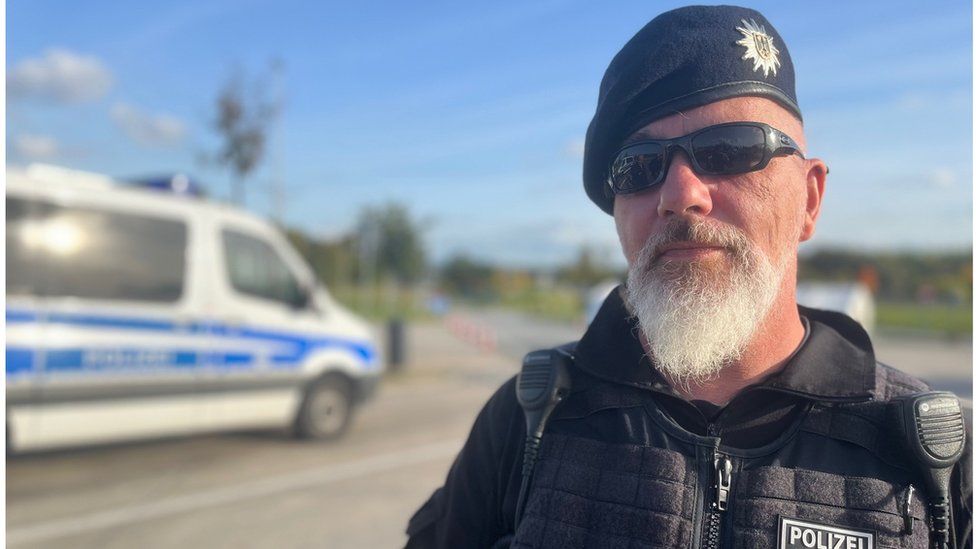
By Jessica Parker
BBC Berlin correspondent, Saxony
Armed police officers wave cars off the motorway going from Poland to Germany.
They’re searching for people-smugglers and their desperate cargo.
This is the German government’s latest bid to show it is getting a grip on rising levels of irregular migration.
But, as we found in a rural border district, there’s little sense of control.
Altenberg is a small town in Saxony, right by the Czech Republic.
Families race down a toboggan run that weaves through the forest and, when winter’s here, there’s even a small ski resort.
The local mayor, Markus Wiesenberg, says that – in this area alone – smugglers drop off people as often as once a day.
“The trafficker disappears and probably picks up the next load.”
New arrivals put a strain on local services, he says, as well as local people.
“Sometimes they find sleeping bags and campfires in the woods and they are worried for their children.”
Migration is looming large in the national debate after the far right is seen to have capitalized on the issue, fuelling recent gains in regional elections.
Ministers ordered “temporary” checks last month on Germany’s land borders with Poland, the Czech Republic and Switzerland.
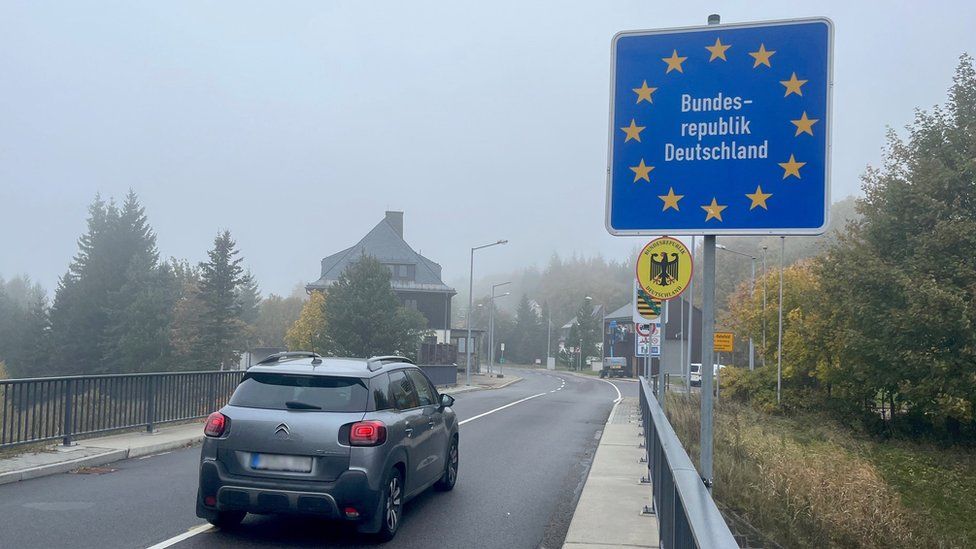
The controls were renewed this week, as they have been for years on the border with Austria, and they are all within the EU’s supposedly border-free Schengen Zone.
Registered illegal entries into Germany this year are set to be their highest since 2016.
The country remains a top destination for asylum seekers.
In August, it received around 30 per cent of the 100,000 applications lodged within the EU, Norway and Switzerland.
Inside an old youth hostel in rural Saxony, more than 50 men are waiting for their future to begin.
Thirty-three-year-old Muhammad Abdoum, from Syria, has successfully applied for asylum and hopes soon to find work.
He’s adopted a leadership role at this migrant housing centre and seems naturally upbeat.
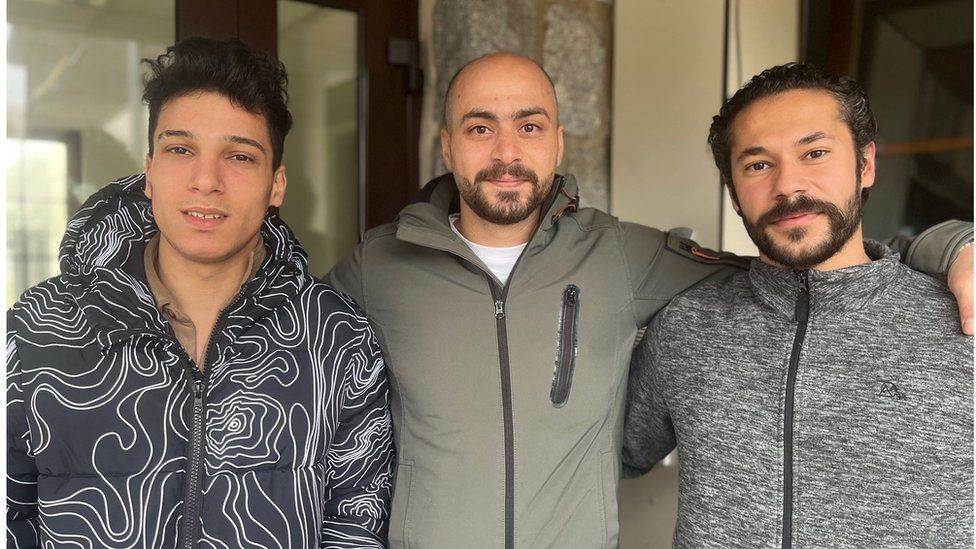
However, he becomes tearful when recounting a “lost” decade in his life with the prospect of starting again from “zero.”
“I lost too much [many] friends. I lost 10 years. What did I make for myself?”
A long journey, he tells me, took him from war-torn Syria to Turkey, through the Balkans and eventually here; to what feels like a remote outpost, just metres from the Czech border, surrounded by pine trees and a heavy morning mist.
Passing through other EU nations, the last leg of his travels was on a train from Prague.
Now he dreams of having a life, maybe even a family, in Germany.
That evening, just ten minutes’ drive from the hostel, a small crowd of forty to fifty people gathers in the village square of Hermsdorf.
They’re protesting about the possibility that nearby apartments might be used to house migrants.
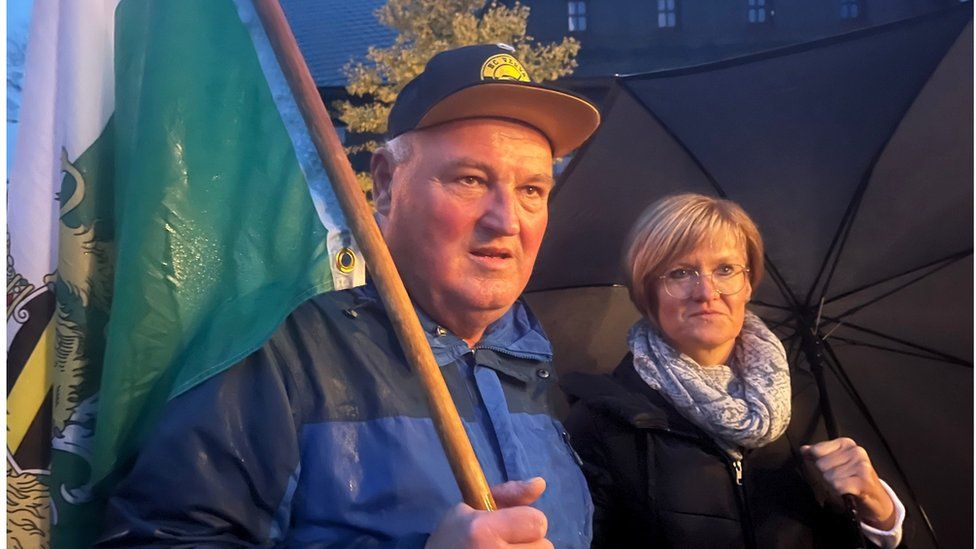
A speaker, playing anti-establishment songs, blares out from the back of a van.
Thomas clutches a damp, sagging flag of Saxony as he tells me that while an Iraqi family has integrated well into his village, “If hordes of young men arrive… we fear for our safety.”
“I’m here for the children,” chimes in Anja. “For me the young migrants who come here, they are armies – and when the order comes for them to take action, then we’re done. Then Germany is done.”
The group eventually marches off into the night to do a loop of the village.
You might think, tucked away amongst forests and hilltops, that no one can hear them – but you’d be wrong.
Polls that put the far-right, anti-immigration Alternative für Deutschland (AfD) party ahead of the three governing parties appear to have spooked Berlin into action.
Plans to speed up deportations of failed asylum seekers are being introduced while Chancellor Olaf Scholz was in Nigeria this week to try and boost the number of returns.
The German leader has denied that recent AfD state election successes have forced his hand.
But a “sense of fear” has led to fresh, serious discussions in government according to Gerald Knaus, chair of the European Stability Initiative think tank in Berlin.
He’s dismissive of border checks and EU plans to fast-track asylum applications, describing them all as “fake solutions.”
Mr Knaus was the brains behind the contentious 2016 deal which saw Turkey promised aid and visa-free travel in return for stemming the flow of migrants into the EU.
He believes this kind of agreement should be revived and expanded to countries such as Senegal, Morocco and Rwanda.
Some senior political figures in Germany, including from within the three-party governing coalition, are also calling for third-country deals.
One idea, which has not been endorsed by ministers, could see asylum claims processed in nations that migrants pass through on their way to the EU.
“We must prevent people with no prospect of asylum to start the dangerous route across the Mediterranean,” Christian Dürr, the Free Democrats Bundestag group leader, told Süddeutsche Zeitung.
Successful claimants would then proceed to Germany whereas the UK’s deal with Rwanda, which is being contested in the courts, would see refugees remain in the Central African country.
On Monday Chancellor Olaf Scholz will meet with Germany’s regional leaders where migration is expected to top the agenda.
A collision of factors are present in the current migration debate in Germany.
Attempts to tackle irregular migration are running in parallel with efforts to plug labour shortages by attracting skilled foreign workers.
Germany’s also taken more than a million people from Ukraine – mainly women and children – following Russia’s full-scale invasion.
Increased backing for the AfD comes as elected leaders are accused of ducking the debate.
BBC
It seems we didn’t learn the lesson of 2015… We are as unprepared as then
Markus Wiesenberg
Mayor of Altenberg
Mayor Markus Wiesenberg, who’s a member of Angela Merkel’s Christian Democrat party, says there is a perception that the federal government is failing.
All the while, the rise in irregular migration appears to feed gains by the far right as elected leaders are accused of ducking the debate.
“It seems we didn’t learn the lesson of 2015,” he says – referring to the apogee of Europe’s migration crisis.
“We are as unprepared as then.”
Related Topics
Today’s D Brief: Biden seeks ‘pause’ in Gaza; Ukraine general’s grim assessment; US, China set nuke talks; USMC’s Smith ‘stable’ in hospital; And a bit more…
By Ben Watson and Bradley Peniston
U.S. President Joe Biden was speaking at a fundraiser in Minnesota Wednesday evening when he was interrupted by a man who shouted, “As a rabbi, I need you to call for a ceasefire right now.” The man was referring to the ongoing Israeli counteroffensive in the Hamas-held Gaza Strip, which has killed more than 8,800 Palestinians since October 7, when Hamas terrorists killed 1,400 Israelis in a surprise attack of almost unspeakable brutality.
“I think we need a pause,” Biden replied to the heckler. “A pause means give time to get the prisoners [more than 200 hostages held by Hamas] out” of Gaza, the president said.
John Kirby of the White House’s National Security Council elaborated a bit on this apparent new goal of the administration while speaking to reporters earlier Wednesday. “We’re just not at that point now where we think a general ceasefire is the right approach,” he said.
“We continue to support the idea of temporary pauses in the fighting so that aid can get in, people can get out, we can get our hostages out,” he added. However, he cautioned, “there are many factors and many players in being able to put pauses in place, and we’re working at that very, very hard.”
Pause or not, Kirby said, “Hamas can’t be the future of governance in Gaza…Now, what comes next after the conflict, we don’t have all the answers to that. But we are working with our partners in the region to explore what governance in Gaza can and should look like over the long term. Whatever it is,” he said again, “it can’t be Hamas.” After all, Kirby explained, a Hamas official by the name of Ghazi Hamad told a Lebanese news outlet just this week, “Israel is a country that has no place on our land. We must remove that country.”
“Hamas is willing to continue this fight and will continue to try to slaughter innocent Israelis,” Kirby warned reporters Wednesday. “Those are chilling comments,” he said. “We all ought to pay attention to them, and we need to take them seriously.”
But Israel seems to be losing some international support after an airstrike on a refugee camp in Gaza Tuesday. Officials there say 195 people were killed and 120 are still missing after bombs cratered the Jabalia refugee camp and leveled entire apartment buildings. Israel says it killed a top Hamas commander and ruptured portions of the group’s tunnel system underneath Gaza.
UN flags apparent disproportionality: The United Nations’ top human rights officer said Wednesday that given “the scale of the destruction following Israeli airstrikes on Jabalia refugee camp, we have serious concerns that these are disproportionate attacks that could amount to war crimes.”
UN Secretary-General Antonio Guterres said he’s “appalled over the escalating violence in Gaza,” including “the killing of Palestinians, including women and children, in Israeli air strikes in residential areas of the densely populated Jabalia refugee camp,” he said in a statement through his spokesman Stephane Dujarric on Wednesday.
The king of Jordan, too, is growing increasingly upset over Israel’s Gaza invasion, and his Foreign Ministry Wednesday summoned its ambassador to Israel while also instructing Israel’s ambassador to Jordan to stay away due to Israel’s “raging” war on Gaza.
“The world seems unable, or unwilling, to act,” Martin Griffiths, the UN humanitarian chief, said in his own statement Wednesday. “This cannot go on,” he warned. “We need the hostages to be released immediately and unconditionally…Repeated humanitarian pauses would allow us to provide more aid to those in need across Gaza, thus alleviating people’s suffering and reducing the risk of civil disorder.”
The White House, meanwhile, is pushing for the evacuation of foreigners from Gaza, including about 500 who were able to depart for Egypt on Wednesday. “596 more are expected to exit on Thursday,” al-Jazeera reports, citing the Gaza Borders and Crossings Authority. “Some injured Palestinians have also been allowed to leave for medical treatment,” AJ added.
But the U.S. is not advocating for the expulsion of Palestinians from Gaza, Kirby told reporters Wednesday. “We want to make sure that the people of Gaza, should they want to go back home, can go back home,” he said. “But if they want to get out in the interim, they should be able to get out. There is no U.S. policy or endorsement for some sort of permanent settlement” outside of Gaza.
There are also “no plans or intention to put U.S. military troops on the ground in Gaza now or in the future,” said Kirby, a day after the U.S. ordered 300 troops to the Middle East. But White House officials “are talking to our partners about what post-conflict Gaza should look like,” Kirby continued. “If that means some sort of international presence, then that’s something we’re talking about. But there’s been no decisions about that at this point.”
Spillover watch: Hezbollah militants say they shot down an Israeli drone again this week over the Israel-Lebanon border; if true, it would be the second time that’s happened this week, according to al-Jazeera.
And in case you missed it, Iran-backed Houthi militants in Yemen are trying to attack Israel with missiles and drones, too. So far, those projectiles have been shot down by U.S. Navy and Israeli interceptors. Reuters has more on why the Houthis would want to widen this conflict, reporting Tuesday, here.
Can the U.S. defense industry keep up with the need to arm allies Israel and Ukraine at the same time? The NSC’s John Kirby was asked this Wednesday while the new speaker of the House changed his tone on simultaneous military support for Ukraine and Israel more akin to what the White House is asking for in its $105 billion supplemental aid bill.
“As [Defense Secretary Lloyd Austin] said [at a senate appropriations hearing Tuesday], he’s confident that the defense industrial base will be up to that task to improve and accelerate the production of munitions that we need not only to help Ukraine and now Israel but to replenish our own stocks,” Kirby told reporters. “And as you saw in the supplemental, there is a significant chunk of funding in there designed to do that—to be able to replenish our own shelves.”
About House Speaker Mike Johnson’s change of tone on Israel and Ukraine, Senate Republicans say Johnson told them Wednesday that he would support more military aid to Ukraine—but (at least right now) it has to come in a separate bill from additional aid to Israel, according to Politico. Speaker Johnson also said he’s interested in a funding bill that lasts through only Jan. 15; the current stopgap funding bill, passed hours before a shutdown deadline in late September, is set to end on Nov. 17. NBC News has more from the budget debates dividing the GOP-led House from the Democrat-led Senate, here; ABC News has similar coverage, here.
Additional reading:
- “The Ukraine-Israel Test for U.S. Democracy,” via the Wall Street Journal’s editorial board, which encourages “Washington’s factions [to] rise above their parochial interests and compromise to help two U.S. friends fighting for their national survival”;
- “German minister announces complete ban on Hamas activities,” Reuters reported Tuesday from Berlin;
- “How a Campaign of Extremist Violence Is Pushing the West Bank to the Brink,” via the New York Times, reporting Thursday on location; Reuters has similar non-paywalled coverage, here;
- “What caused the explosion at the Gaza hospital?” asked Stefan Schmitt of Florida International University; “Without an independent, credible investigation, it will be hard for everyone to agree,” he argues at Defense One.
Welcome to this Thursday edition of The D Brief, brought to you by Ben Watson with Bradley Peniston. If you’re not already subscribed, you can sign up here. On this day in 1917, the British government issued its “Balfour Declaration” (named for its author Foreign Secretary Arthur Balfour), as the Ottoman Empire was crumbling during the latter half of the First World War. The declaration conveyed Britain’s support for an eventual “national home for the Jewish people” in Palestine, and would eventually lead to a British administration of post-war Palestine following the Versailles Treaty of 1919.
Ukraine’s top military officer shared a particularly grim outlook for the ongoing Russian invasion of Ukraine. “Just like in the first world war we have reached the level of technology that puts us into a stalemate,” said Valery Zaluzhny, Ukraine’s commander-in-chief, in an interview this week with the Economist.
General Zaluzhny’s assessment is sobering: “[T]echnology has its limits,” the Economist writes. “Even in the first world war, the arrival of tanks, in 1917, was not sufficient to break the deadlock on the battlefield: it took a suite of technologies, and more than a decade of tactical innovation, to produce the German blitzkrieg in May 1940. The implication is that Ukraine is stuck in a long war—one in which [Zaluzhny] acknowledges Russia has the advantage. Nevertheless, he insists that Ukraine has no choice but to keep the initiative by remaining on the offensive, even if it only moves by a few metres a day.”
- More behind the paywall, here; Reuters has its own coverage here, as does the New York Times, here; or read over a nine-page assessment penned by Zaluzhny himself (PDF), here.
Meanwhile, Russian invasion forces attacked 118 Ukrainian towns and villages in a 24-hour window this week, the BBC reported Wednesday. That total was “more than on any other day this year, says Ukrainian Interior Minister Ihor Klymenko.”
Russian drones also struck the Kremenchuk oil refinery in central Ukraine on Tuesday
despite Ukraine claiming to have shot down 18 of 20 drones and missiles launched overnight.
Elsewhere, some 40,000 Russian troops are allegedly encircling the contested town of Avdiivka, “which is now a political, rather than a tactical, aim,” one analyst wrote this week, according to Reuters reporting Wednesday from Kyiv.
New: Two purchases of Swiss ammunition for Ukraine appear to violate Geneva’s prohibition on such transfers, while other Ukrainian arms deals have been concluded at exorbitant prices. That’s according to Ukrainian import records that illustrate Kyiv’s desperate hunt for defense materiel for its fight against Russian invaders, Defense One’s Sam Skove reported Wednesday.
Extra reading:
- “Senior US Republicans urge long-range missiles for Ukraine,” Reuters reported Thursday;
- “Italian leader Meloni talks of Ukraine fatigue in call with Russian pranksters,” CNN reported Wednesday; “Mercenaries or Volunteers? Economic Pain Pushes Colombian Veterans to Ukraine,” the New York Times reported Thursday from Colombia;
U.S. Mission to International Organizations in Geneva
15 MINUTE READ
October 20, 2023
Remarks by President Biden on the Unites States’ Response to Hamas’s Terrorist Attacks Against Israel and Russia’s Ongoing Brutal War Against Ukraine
The White House
October 20, 2023
THE PRESIDENT: Good evening, my fellow Americans. We’re facing an inflection point in history — one of those moments where the decisions we make today are going to determine the future for decades to come. That’s what I’d like to talk with you about tonight.
You know, earlier this morning, I returned from Israel. They tell me I’m the first American president to travel there during a war.
I met with the Prime Minister and members of his cabinet. And most movingly, I met with Israelis who had personally lived through horrific horror of the attack by Hamas on the 7th of October.
More than 1,300 people slaughtered in Israel, including at least 32 American citizens. Scores of innocents — from infants to elderly grandparents, Israelis, Americans — taken hostage.
As I told the families of Americans being held captive by Hamas, we’re pursuing every avenue to bring their loved ones home. As President, there is no higher priority for me than the safety of Americans held hostage.
The terrorist group Hamas unleashed pure, unadulterated evil in the world. But sadly, the Jewish people know, perhaps better than anyone, that there is no limit to the depravity of people when they want to inflict pain on others.
In Israel, I saw a people who are strong, determined, resilient, and also angry, in shock, and in deep, deep pain.
I also spoke with President Abbas of the Palestinian Authority and reiterated that the United States remains committed to the Palestinian people’s right to dignity and to self-determination. The actions of Hamas terrorists don’t take that right away.
Like so many other, I am heartbroken by the tragic loss of Palestinian life, including the explosion at a hospital in Gaza — which was not done by the Israelis.
We mourn every innocent life lost. We can’t ignore the humanity of innocent Palestinians who only want to live in peace and have an opportunity.
You know, the assault on Israel echoes nearly 20 months of war, tragedy, and brutality inflicted on the people of Ukraine — people that were very badly hurt since Putin launched his all-out invasion.
We’ve have not forgotten the mass graves, the bodies found bearing signs of torture, rape used as a weapon by the Russians, and thousands and thousands of Ukrainian children forcibly taken into Russia, stolen from their parents. It’s sick.
Hamas and Putin represent different threats, but they share this in common: They both want to completely annihilate a neighboring democracy — completely annihilate it.
Hamas — its stated purpose for existing is the destruction of the State of Israel and the murder of Jewish people.
Hamas does not represent the Palestinian people. Hamas uses Palestinian civilians as human shields, and innocent Palestinian families are suffering greatly because of them.
Meanwhile, Putin denies Ukraine has or ever had real statehood. He claims the Soviet Union created Ukraine. And just two weeks ago, he told the world that if the United States and our allies withdraw — and if the United States withdraw, our allies will as well — military support for Ukraine, it would have, quote, “a week left to live.” But we’re not withdrawing.
I know these conflicts can seem far away. And it’s natural to ask: Why does this matter to America?
So let me share with you why making sure Israel and Ukraine succeed is vital for America’s national security. You know, history has taught us that when terrorists don’t pay a price for their terror, when dictators don’t pay a price for their aggression, they cause more chaos and death and more destruction. They keep going, and the cost and the threats to America and to the world keep rising.
So, if we don’t stop Putin’s appetite for power and control in Ukraine, he won’t limit himself just to Ukraine. He’s — Putin has already threated to “remind” — quote, “remind” Poland that their western land was a gift from Russia.
One of his top advisors, a former president of Russia, has called Estonia, Latvia, and Lithuania Russia’s “Baltic provinces.” These are all NATO Allies.
For 75 years, NATO has kept peace in Europe and has been the cornerstone of American security. And if Putin attacks a NATO Ally, we will defend every inch of NATO which the treaty requires and calls for.
We will have something that we do not seek — make it clear: we do not seek — we do not seek to have American troops fighting in Russia or fighting against Russia.
Beyond Europe, we know that our allies and, maybe most importantly, our adversaries and competitors are watching. They’re watching our response in Ukraine as well.
And if we walk away and let Putin erase Ukraine’s independence, would-be aggressors around the world would be emboldened to try the same. The risk of conflict and chaos could spread in other parts of the world — in the Indo-Pacific, in the Middle East — especially in the Middle East.
Iran is — is supporting Russia’s U- — in Ukraine, and it’s supporting Hamas and other terrorist groups in the region. And we’ll continue to hold them accountable, I might add.
The United States and our partners across the region are working to build a better future for the Middle East, one where the Middle East is more stable, better connected to its neighbors, and — through innovative projects like the India-Middle East-Europe rail corridor that I announced this year at the summit of the world’s biggest economies. More predictable markets, more employment, less rage, less grievances, less war when connected. It benefits the people — it would benefit the people of the Middle East, and it would benefit us.
American leadership is what holds the world together. American alliances are what keep us, America, safe. American values are what make us a partner that other nations want to work with. To put all that at risk if we walk away from Ukraine, if we turn our backs on Israel, it’s just not worth it.
That’s why, tomorrow, I’m going to send to Congress an urgent budget request to fund America’s national security needs, to support our critical partners, including Israel and Ukraine.
It’s a smart investment that’s going to pay dividends for American security for generations, help us keep American troops out of harm’s way, help us build a world that is safer, more peaceful, and more prosperous for our children and grandchildren.
In Israel, we must make sure that they have what they need to protect their people today and always.
The security package I’m sending to Congress and asking Congress to do is an unprecedented commitment to Israel’s security that will sharpen Israel’s qualitative military edge, which we’ve committed to — the qualitative military edge.
We’re going to make sure Iron Dome continues to guard the skies over Israel. We’re going to make sure other hostile actors in the region know that Israel is stronger than ever and prevent this conflict from spreading.
Look, at the same time, President [Prime Minister] Netanyahu and I discussed again yesterday the critical need for Israel to operate by the laws of war. That means protecting civilians in combat as best as they can. The people of Gaza urgently need food, water, and medicine.
Yesterday, in discussions with the leaders of Israel and Egypt, I secured an agreement for the first shipment of humanitarian assistance from the United Nations to Palestinian civilians in Gaza.
If Hamas does not divert or steal this shipment — these shipments, we’re going to provide an opening for sustained delivery of lifesaving humanitarian assistance for the Palestinians.
And as I said in Israel: As hard as it is, we cannot give up on peace. We cannot give up on a two-state solution.
Israel and Palestinians equally deserve to live in safety, dignity, and peace.
You know, and here at home, we have to be honest with ourselves. In recent years, too much hate has been given too much oxygen, fueling racism, a rise in antisemitism and Islamicphobia [Islamophobia] right here in America.
It’s also intensified in the wake of recent events that led to the horrific threats and attacks that both shock us and break our hearts.
On October 7th, terror attacks have triggered deep scars and terrible memories in the Jewish community.
Today, Jewish families worried about being targeted in school, wearing symbols of their faith walking down the street, or going out about their daily lives.
You know, I know many of you in the Muslim American community or the Arab American community, the Palestinian American community, and so many others are outraged and hurting, saying to yourselves, “Here we go again,” with Islamophobia and distrust we saw after 9/11.
Just last week, a mother was brutally stabbed, a little boy — here in the United States — a little boy who had just turned six years old was murdered in their home outside of Chicago.
His name was Wadea — Wadea — a proud American, a proud Palestinian American family.
We can’t stand by and stand silent when this happens. We must, without equivocation, denounce antisemitism. We must also, without equivocation, denounce Islamophobia.
And to all of you hurting — those of you who are hurting, I want you to know: I see you. You belong. And I want to say this to you: You’re all America. You’re all America.
This is in a moment where there’s — you know, in moments like these, when fear and suspicion, anger and rage run hard, that we have to work harder than ever to hold on to the values that make us who we are.
We’re a nation of religious freedom, freedom of expression. We all have a right to debate and disagree without fear of being targeted at schools or workplaces or in our communities.
And we must renounce violence and vitriol, see each other not as enemies but as — but as fellow Americans.
When I was in Israel yesterday, I said that when America experienced the hell of 9/11, we felt enraged as well. While we sought and got justice, we made mistakes. So, I cautioned the government of Israel not to be blinded by rage.
And here in America, let us not forget who we are. We reject all forms — all forms of hate, whether against Muslims, Jews, or anyone. That’s what great nations do, and we are great nation.
On Ukraine, I’m asking Congress to make sure we can continue to send Ukraine the weapons they need to defend themselves and their country without interruption so Ukraine can stop Putin’s brutality in Ukraine.
They are succeeding.
When Putin invaded Ukraine, he thought he would take Kyiv and all of Ukraine in a matter of days. Well, over a year later, Putin has failed, and he continues to fail. Kyiv still stands because of the bravery of the Ukrainian people.
Ukraine has regained more than 50 percent of the territory
Russian troops once occupied, backed by a U.S.-led coalition of more than 50 countries around the world all doing its part to support Kyiv.
What would happen if we walked away? We are the essential nation.
Meanwhile, Putin has turned to Iran and North Korea to buy attack drones and ammunition to terrorize Ukrainian cities and people.
From the outset, I have said I will not send American troops to fight in Ukraine.
All Ukraine is asking for is help — for the weapons, munitions, the capacity, the capability to push invading Russian forces off their land, and the air defense systems to shoot down Russian missiles before they destroy Ukrainian cities.
And let me be clear about something: We send Ukraine equipment sitting in our stockpiles. And when we use the money allocated by Congress, we use it to replenish our own stores — our own stockpiles with new equipment — equipment that defe- — that defends America and is made in America: Patriot missiles for air defense batteries made in Arizona; artillery shells manufactured in 12 states across the country — in Pennsylvania, Ohio, Texas; and so much more.
You know, just as in World War Two, today, patriotic American workers are building the arsenal of democracy and serving the cause of freedom.
Let me close with this. Earlier this year, I boarded Air Force One for a secret flight to Poland. There, I boarded a train with blacked-out windows for a 10-hour ride each way to Kyiv to stand with the people of Ukraine ahead of the one-year anniversary of their brave fight against Putin.
I’m told I was the first American [president] to enter a warzone not controlled by the United States military since President Lincoln.
With me was just a small group of security personnel and a few advisors.
But when I exited that train and met Zelenskyy — President Zelenskyy, I didn’t feel alone. I was bringing with me
the idea of America, the promise of America to the people who are today fighting for the same things we fought for 250 years ago: freedom, independence, self-determination.
And as I walked through Kyiv with President Zelenskyy, with air raid sirens sounding in the distance, I felt something I’ve always believed more strongly than ever before: America is a beacon to the world still. Still.
We are, as my friend Madeleine Albright said, “the indispensable nation.”
Tonight, there are innocent people all over the world who hope because of us, who believe in a better life because of us, who are desperate not be forgotten be- — by us, and who are waiting for us.
But time is of the essence.
I know we have our divisions at home. We have to get past them. We can’t let petty, partisan, angry politics get in the way of our responsibilities as a great nation.
We cannot and will not let terrorists like Hamas and tyrants like Putin win. I refuse to let that happen.
In moments like these, we have to remind — we have to remember who we are. We are the United States of America — the United States of America. And there is nothing — nothing beyond our capacity if we do it together.
My fellow Americans, thank you for your time.
May God bless you all. And may God protect our troops.
News, President of the United States
What’s the 14th Amendment and can it block Trump’s 2024 presidential bid?
Scholars say the US Constitution could bar the ex-president from holding public office again for engaging in insurrection.

By Ali Harb
Published On 8 Sep 20238 Sep 2023
Washington, DC – The growing list of criminal charges against Donald Trump does not prevent the former United States president from seeking the White House in 2024.
But some activists and legal scholars are looking to a provision in the 14th Amendment of the US Constitution to bar Trump from holding public office ever again.
Keep reading
list of 3 itemslist 1 of 3
Trump adviser Peter Navarro guilty of contempt for dodging Jan 6 subpoena
list 2 of 3
Biden hits out at Trump in Labor Day speech focused on US jobs, economy
list 3 of 3
Trump liable for defamation in writer Carroll’s second lawsuit: US judge
end of list
Ratified in 1868 after the US Civil War, the 14th Amendment is mostly known for ensuring equal protection under the law.
But it also includes a seldom-used “disqualification clause” — formally known as Section Three — which can be enforced to bar current and former officials from public office if they “engaged in insurrection or rebellion”.
Critics say Section Three’s language should make Trump ineligible to run for president, as his efforts to overturn the 2020 presidential election are tantamount to an insurrection.
Their push has raised legal, political and practical questions about the applicability and possible enforcement of Section Three, particularly as Trump leads the race for the Republican presidential nomination in 2024.
Here’s all you need to know.
What is the 14th Amendment?
An amendment is a change to the Constitution — known as “the law of the land” — that then becomes part of the document.
Tom Ginsburg, a professor of international law and political science at the University of Chicago, said the 14th Amendment was ratified after the Civil War to “deal with various aspects of the conflict”.
The Civil War started in 1861, when southern states seceded from the Union and formed the Confederacy, primarily to preserve slavery.
Sign up for Al Jazeera
Americas Coverage Newsletter
US politics, Canada’s multiculturalism, South America’s geopolitical rise—we bring you the stories that matter.
Please check your email to confirm your subscription
By signing up, you agree to our Privacy Policy
Ginsburg said the 14th Amendment advances racial justice by ensuring equality under the law and extending the constitutional order and the protections it provides to the states.
https://imasdk.googleapis.com/js/core/bridge3.600.0_en.html#goog_1739635814
Video Duration 02 minutes 14 seconds 02:14US Capitol riot: Former Proud Boys leader gets 22 years in prison
What is Section Three about?
Section Three also relates to the Civil War. It originally aimed to prevent former Confederate leaders from holding public office after rebelling against the US government.
It disqualifies people who took an oath to support the Constitution but then “engaged in insurrection or rebellion against the same” or gave “aid or comfort to the enemies thereof”.
Does it apply in a modern context?
Yes. Although Section Three originally sought to limit the influence of former Confederate officials, legal scholars say it is a general statute that remains applicable.
Kimberly Wehle, a law professor at the University of Baltimore, said Section Three is “broadly worded”: It is not specific to Confederates, nor does it mention them by name.
“The theory behind Section Three is that it’s really a problem to have people in office who are committed to dismantling the current government. The spirit of Section Three seems to apply in 2023,” Wehle told Al Jazeera.
https://imasdk.googleapis.com/js/core/bridge3.600.0_en.html#goog_1739635816
Video Duration 01 minutes 29 seconds 01:29What is RICO, the anti-mafia law being used against Trump?
What is an insurrection?
The Merriam-Webster dictionary defines insurrection as “an act or instance of revolting against civil authority or an established government”.
The US Constitution, however, offers no explicit guidelines on what exactly constitutes an insurrection.
“It’s not — for constitutional purposes — clearly defined,” University of Chicago’s Ginsburg said. “To my mind, it involves significant acts of violence that are directed at important governmental operations.”
Why is the Disqualification Clause gaining attention now?
With Trump comfortably leading the race for the Republican nomination, advocates and law experts have invoked the 14th Amendment to push for his disqualification from the 2024 elections.
Discussions around the amendment have been picking up steam in recent weeks.
On Wednesday, Citizens for Responsibility and Ethics in Washington (CREW), a group that promotes government accountability, filed a lawsuit in a Colorado state court on behalf of six voters to remove Trump’s name from the ballot in any future election.
And in August, a lawyer in Florida also filed a legal complaint in federal court to stop Trump from running.
Earlier that same month, two renowned conservative law professors also said that they had concluded in a forthcoming scholarly paper that Trump cannot seek public office over his “participation in the attempted overthrow of the 2020 presidential election”.
Before Donald Trump has a chance to spread lies about the 14th Amendment, here are the facts: pic.twitter.com/lU4hdMHiGb
— Citizens for Ethics (@CREWcrew) September 7, 2023
What has Trump done to be accused of insurrection?
After his loss in the 2020 election to President Joe Biden, Trump falsely claimed that the vote was swayed by widespread election fraud.
From there, he tried to convince the US Department of Justice and various state officials to intervene on his behalf. He also urged then-Vice President Mike Pence to use his ceremonial role overseeing the Electoral College vote count to overturn the election.
On the day of that vote count — January 6, 2021 — a mob of Trump supporters stormed the US Capitol in an effort to stop the certification.
Wehle, the University of Baltimore law professor, quoted the congressional committee that investigated the Capitol riot, saying that Trump’s “multi-faceted, multi-tiered efforts to thwart the election” amounted to insurrection.
She also cited the violence at the Capitol and Trump’s attacks on election workers. With the “amount of trauma and damage” that Trump has caused, it is clear that he engaged in insurrection, she said.
What has Trump said?
Trump has denounced efforts to use the 14th Amendment as “another trick” by Democrats to derail his 2024 campaign.
“Almost all legal scholars have voiced opinions that the 14th Amendment has no legal basis or standing relative to the upcoming 2024 Presidential Election,” Trump wrote in a social media post earlier this week.
Trump is facing four indictments — including two sets of charges over his efforts to overturn the 2020 elections — but legal experts say the criminal cases do not directly relate to whether the 14th Amendment can be applied. After all, defendants can still run for president even if they are convicted and jailed.

Who can enforce Section Three?
This is where things get tricky for those who want to disqualify Trump: Section Three does not spell out how it should be enforced, meaning it is not clear who would ban candidates from office.
Theoretically, top state election officials could reject Trump’s application to be on the ballot in the same way they would disqualify someone who does not meet other requirements, according to Ginsburg.
But he added that the issue is complex.
“It’s not as simple as saying someone is 25 years old and is therefore disqualified. This language requires interpretation. What’s ‘an insurrection’? What’s ‘aid and comfort to the enemies’?”
Moreover, Trump’s campaign is likely to sue if he is removed from the ballot, raising the possibility of widespread court battles.
In the case of Wednesday’s lawsuit, the government accountability group CREW hopes to block the Colorado secretary of state “from taking any action that would allow” Trump to access the ballot.
Has Section Three been applied before?
Throughout history, Section Three has been applied against sitting and former officials fewer than 10 times — mostly in the immediate aftermath of the Civil War.
But there is a recent precedent.
Last year, a New Mexico judge used the 14th Amendment to order the removal of then-Otero County Commissioner Couy Griffin for participating in the January 6 riot.
New Mexico has a so-called “quo warranto” law that allows private citizens to file legal complaints to assess whether an official is constitutionally authorised to hold public office. Not all states have such laws.
Earlier in 2022, a judge in Georgia ruled in favour of Congresswoman Marjorie Taylor Greene, a right-wing Trump ally, after a lawsuit aimed to ban her from seeking reelection under the 14th Amendment.
https://imasdk.googleapis.com/js/core/bridge3.600.0_en.html#goog_1739635815
Video Duration 23 minutes 58 seconds 23:58After the first US Republican debate: Who’s up, who’s down? | The Bottom Line
What have state election officials said?
At least two secretaries of state have said they would not unilaterally keep Trump off the ballot.
Arizona’s Adrian Fontes cited a state supreme court ruling that he said bars him from enforcing Section Three.
Georgia’s Brad Raffensperger said it should be the people who decide whether to elect Trump or not. “Denying voters the opportunity to choose is fundamentally un-American,” he wrote in a Wall Street Journal column this week.
For her part, Colorado Secretary of State Jena Griswold said she will keep an eye on the recent lawsuit in the state, adding that the legal case could provide guidance to election officials.
“This is an unprecedented situation. We’ve never had a president incite an insurrection and attack our democracy like this,” Griswold told Politico.
Source: Al Jazeera
Related
- Trump’s White House chief of staff pleads not guilty in Georgia caseMark Meadows joins Trump and other co-defendants in waiving formal arraignment hearings in US election subversion case.Published On 5 Sep 20235 Sep 2023
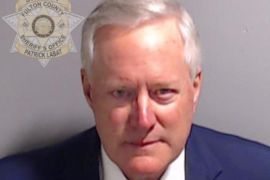
- Trump pleads not guilty in Georgia election caseFormer US president waives formal arraignment in case accusing him and 18 others of subverting 2020 election.Published On 31 Aug 202331 Aug 2023

- Trump indictments: Key court dates set in Georgia, federal election casesFormer US president will be arraigned in Georgia next week while judge sets March 2024 start for federal trial.Published On 28 Aug 202328 Aug 2023

More from News
- Telegram restricts access to Hamas channels on Google, Apple stores
![Telegram has restricted a number of Hamas-linked channels without explanation [File: Dado Ruvic/Reuters]](https://www.aljazeera.com/wp-content/uploads/2023/11/2023-02-21T215159Z_1462417187_RC2UFZ9DCIP4_RTRMADP_3_TECH-TELEGRAM-1698986977.jpg?resize=270%2C180&quality=80)
- New US sanctions over Russia-Ukraine war target Lancet drones
![A suspected Russian Lancet drone in Ukraine [File: Defence Ministry of Ukraine via Reuters]](https://www.aljazeera.com/wp-content/uploads/2023/11/2023-06-28T080028Z_1234231378_RC27S1AKV27E_RTRMADP_3_UKRAINE-CRISIS-LANCET-1698985112.jpg?resize=270%2C180&quality=80)
- The Take: Inside the West Bank’s surging settler violence
![Mourners at a funeral carry the body of a 16-year-old Palestinian teen killed in clashes with Israeli forces, near Hebron in the Israeli-occupied West Bank on October 12, 2023 [Mussa Qawasma/Reuters]](https://www.aljazeera.com/wp-content/uploads/2023/11/2023-10-12T082744Z_1798300906_RC2WQ3AS2FJQ_RTRMADP_3_ISRAEL-PALESTINIANS-WESTBANK-FUNERALS-1698978794.jpg?resize=270%2C180&quality=80)
- Israel’s military says Gaza City surrounded, rejects ceasefire calls
![Israel has bombarded Gaza for nearly a month in response to Hamas's October 7 attacks on southern Israeli communities [File: Mohammed al-Masri/Reuters]](https://www.aljazeera.com/wp-content/uploads/2023/11/2023-10-30T144927Z_1474022910_RC2N24AZX1AN_RTRMADP_3_ISRAEL-PALESTINIANS-1698975895.jpg?resize=270%2C180&quality=80)
Most Read
- Battles rage in Gaza; Israeli forces kill several Palestinians in West Bank
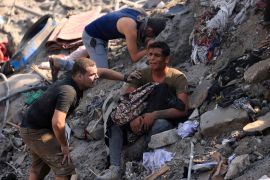
- Analysis: Houthis declare war on Israel, but their real target is elsewhere
![A Houthi fighter fires a rocket-propelled grenade during a military manoeuvre near Sanaa, Yemen on October 30, 2023 [Houthi Media Center/Handout via Reuters]](https://www.aljazeera.com/wp-content/uploads/2023/11/2023-10-31T151712Z_1433239229_RC2Q34AW2BW5_RTRMADP_3_ISRAEL-PALESTINIANS-HOUTHIS-1698937818.jpg?resize=270%2C180&quality=80)
- Israel-Hamas war updates: Israel says its forces surround Gaza City
![Palestinians search for casualties at the site of Israeli strikes on houses, in Jabalia refugee camp [Anas Al-Shareef/Reuters]](https://www.aljazeera.com/wp-content/uploads/2023/11/2023-11-02T105238Z_843146960_RC2T44AJQ3B1_RTRMADP_3_ISRAEL-PALESTINIANS-1698923716.jpg?resize=270%2C180&quality=80)
- Lebanon-Israel border fighting picks up before Hezbollah leader’s speech
![An Israeli artillery unit fires during a military drill in the annexed Golan Heights near the border with Lebanon on November 2, 2023 [Jalaa Marey/AFP]](https://www.aljazeera.com/wp-content/uploads/2023/11/golan-1698955171.jpeg?resize=270%2C180&quality=80)
November 2nd 2023
A Matter of U.S Priorities
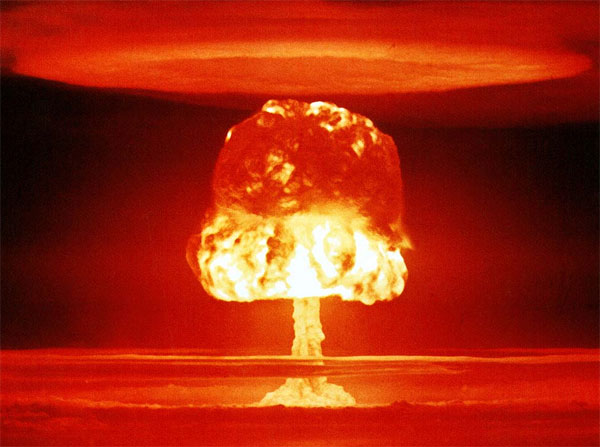
Maybe Zelensky believes that the United States has been funding what he seems to believe is his democratic ( sic ) war on Russia or is just in it for the money. The words flowing from Joe Biden’s old and well practiced political mouth have to be considered in the context of an election year. The fake liberal Democratic Party, like U.K’s Labour, thrive on virtue signalling, but Biden has to appease both the extremist Palestine Muslims and the U.S domestic powerful Jewish lobby. With an HAMAS spokesman declaring on TV that HAMAS would commit the same atrocities against all Jewish civilians again and again until Israel is obliterated, even the utra feminsied PC U.K Labour Party is upsetting smug preaching National Media for not backing a ceasefire.
If the rules and laws of war do not apply to HAMAS, then they cannot be rigorously applied to Israel which, like Russia, is fighting an existential war. The difference is – regardless as to whether Russia and Iran stirred it all up to create Biden’s nightmare – that Anglo U.S led NATO started Ukraine’s existential war on Russia for territory, elite cultural and material gain. It was a gamble which looked like favouring the west as far as their arrogant elite strategists and arms makers were concerned. But as priorities go, the U.S has to favour Israel where there are real moral issues and an incredible worldwide uprising of Muslim extremists. That is why Egypt has been desperate to keep they crossing closed from these rabble rousing lunatics.
They support a medieval caliphate, fired by a hate filled medieval religious obsession with their right to worldwide supremacy and top table in the afterlife. The fact that the majority of world wide Muslims live in poverty on foreign aid never noticing that they have their own pampered ruthless so called Islamic leaders opressing them with bigotry, is never noticed. Their poverty, religious mania and lack of worthwhile education makes fuel for the caliphate.
Nice western commentators have been preocuupied with fears that Vladimir Putin would act like one of these semi civilised primitive people and drop the nuclear bomb. Maybe he has outwitted all the western spies and traitors, conming up with something potentially more subtle and devastating – but as yet with no apparent fallout.
R J Cook
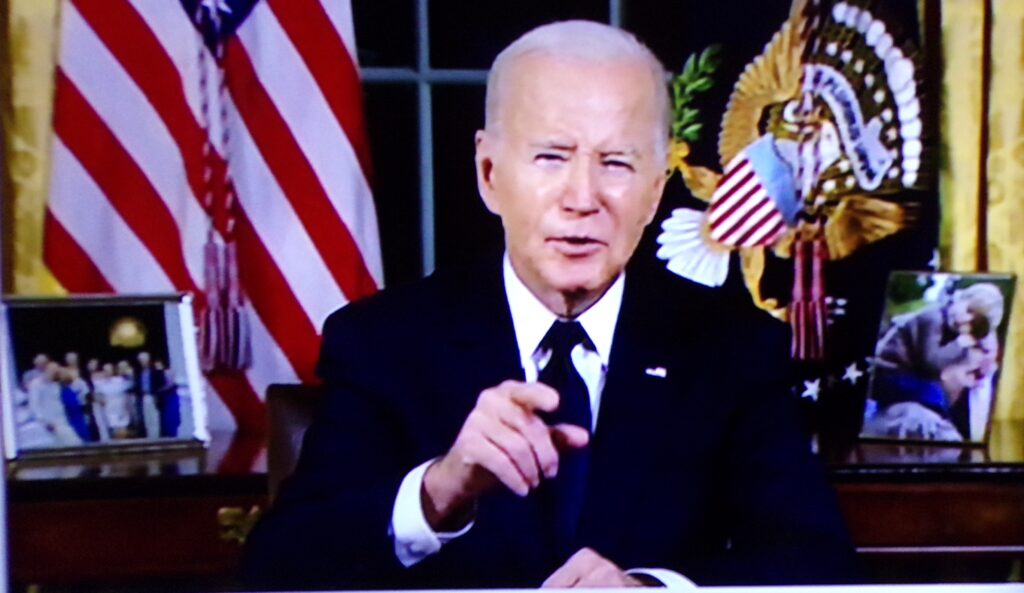
Welcome to Balance of Power, bringing you the latest in global politics. If you haven’t yet, sign up here.These days, President Volodymyr Zelenskiy can barely disguise his frustration.The weather is turning, the political mood is souring and the grinding counter-offensive may stall in spite of Ukraine’s insistence it will fight through the winter.The Israel-Hamas conflict has diverted the world’s attention, and with the hard-right Republicans in charge of the House of Representatives, Ukraine can no longer assume the American military aid it relies on will keep coming, even with President Joe Biden’s assurances to the contrary. He’s got a reelection to fight, and supporting Ukraine is not the top concern for US voters.In an interview with TIME magazine, Zelenskiy acknowledged: “Of course we lose out from the events in the Middle East.” Meanwhile, in one of his nightly addresses he complained how “the modern world quickly gets accustomed to success.”A year ago, Ukraine’s spirited counterattack had won praise. Criticism of its current efforts as underwhelming clearly sting.The US war machine is starting to be spread thin on two fronts. Ukraine is falling behind on artillery shells, the Europeans are unlikely to be able to step up while Russia is reportedly getting ammunition supplies from North Korea.In public, leaders will keep saying how they stand by Ukraine, but the pledges are starting to ring hollow. A pair of notorious Russian pranksters tricked Italian Prime Minister Giorgia Meloni into a phone call where she said Western allies are tired of the conflict.“I see that there is a lot of fatigue, I have to say the truth, from all the sides,” she said in an audio recording from mid-September that was released online. “We’re nearing the moment in which everybody understands that we need a way out.”That’s a cruel truth for Zelenskiy to face but that is now out in the open.— Flavia Krause-Jackson Meloni and Zelenskiy at the Chigi Palace in Rome on May 13. Photographer: Alessia Pierdomenico/Bloomberg Meloni and Zelenskiy at the Chigi Palace in Rome on May 13. Photographer: Alessia Pierdomenico/Bloomberg |
| Global Must Reads |
Biden urged Israel and Hamas to “pause” fighting in order to allow time to free hostages held in the Gaza Strip, while stopping short of supporting a full ceasefire. Progressive groups, as well as Muslim and Arab Americans, have criticized the US president over his support for Israel’s campaign against Hamas that has resulted in thousands of civilian deaths in the Palestinian territory. Evacuees pass through the Rafah border crossing into Egypt yesterday. Photographer: Mohammed Abed/AFP/Getty ImagesPresident Emmanuel Macron plans to strengthen France’s arsenal of strategic tools to protect vulnerable firms against foreign buyers with deep pockets, particularly from the US and China. The finance ministry said the government will lower the threshold for triggering a review and extend the number of protected areas to include critical raw materials, as well as French units of foreign companies.The US and China are set to hold rare nuclear arms control talks next week amid growing concerns over Beijing’s accelerated push to build up its arsenal of atomic weapons, a US administration official says. The discussions will take place ahead of Biden’s planned meeting with Chinese President Xi Jinping during the Asia-Pacific Economic Cooperation summit in San Francisco in less than two weeks.The rhetoric coming out of Washington and Beijing contains a lot of “either you’re with us or against us” kind of talk, but not everyone is picking sides. A deep dive into trade and investment data highlights five nations straddling the new geopolitical fault lines: Vietnam, Poland, Mexico, Morocco and Indonesia.Europe’s worst construction crisis in decades has families seeing their dream of building their own home collapse. Residential building has tumbled as costs soar, while sluggish bureaucracies and increasingly stringent energy-efficiency regulations add to the headwinds. With housing already tight, the situation threatens to weigh on economic growth and further stoke political tensions.Latin America’s leftist leaders are reevaluating their relations with Israel over its offensive in the Gaza Strip, highlighting the diplomatic risks posed by Prime Minister Benjamin Netanyahu’s bid to eradicate Hamas.Fellow New York Republicans failed yesterday to expel Representative George Santos, who has been indicted on fraud charges, from the US House.Ugandan activists demonstrating against a $4 billion oil pipeline have been threatened and detained as President Yoweri Museveni’s administration scrutinizes non-governmental organizations, Human Rights Watch said. Evacuees pass through the Rafah border crossing into Egypt yesterday. Photographer: Mohammed Abed/AFP/Getty ImagesPresident Emmanuel Macron plans to strengthen France’s arsenal of strategic tools to protect vulnerable firms against foreign buyers with deep pockets, particularly from the US and China. The finance ministry said the government will lower the threshold for triggering a review and extend the number of protected areas to include critical raw materials, as well as French units of foreign companies.The US and China are set to hold rare nuclear arms control talks next week amid growing concerns over Beijing’s accelerated push to build up its arsenal of atomic weapons, a US administration official says. The discussions will take place ahead of Biden’s planned meeting with Chinese President Xi Jinping during the Asia-Pacific Economic Cooperation summit in San Francisco in less than two weeks.The rhetoric coming out of Washington and Beijing contains a lot of “either you’re with us or against us” kind of talk, but not everyone is picking sides. A deep dive into trade and investment data highlights five nations straddling the new geopolitical fault lines: Vietnam, Poland, Mexico, Morocco and Indonesia.Europe’s worst construction crisis in decades has families seeing their dream of building their own home collapse. Residential building has tumbled as costs soar, while sluggish bureaucracies and increasingly stringent energy-efficiency regulations add to the headwinds. With housing already tight, the situation threatens to weigh on economic growth and further stoke political tensions.Latin America’s leftist leaders are reevaluating their relations with Israel over its offensive in the Gaza Strip, highlighting the diplomatic risks posed by Prime Minister Benjamin Netanyahu’s bid to eradicate Hamas.Fellow New York Republicans failed yesterday to expel Representative George Santos, who has been indicted on fraud charges, from the US House.Ugandan activists demonstrating against a $4 billion oil pipeline have been threatened and detained as President Yoweri Museveni’s administration scrutinizes non-governmental organizations, Human Rights Watch said. |
November 1st 2023
By Paul Kirby
BBC News
Russia bombarded 118 Ukrainian towns and villages in 24 hours, more than on any other day this year, says Ukrainian Interior Minister Ihor Klymenko.
He said 10 of Ukraine’s 27 regions had come under attack and the onslaught had caused deaths and injuries.
Many of the communities hit were near the front lines in the east and south.
Russia has for weeks trained much of its military firepower on Avdiivka, a strategically significant town in the eastern region of Donetsk.
“[Avdiivka] is being erased, shattered. There have been more than 40 massive shelling attacks against the territorial community in the past day,” said local leader Vitaliy Barabash.
He said two civilians had been killed and warned that Russia was building up to a third wave in its offensive. Ukraine says Russia has been pouring reinforcements into the area in a bid to encircle and capture the town.
Twenty attacks in the Avdiivka area alone were repelled on Tuesday, Ukraine’s armed forces general staff said.
Russia has also ramped up attacks on the town of Kupyansk in the north-eastern Kharkiv region and sought to stop Ukrainian forces from recapturing territory around Bakhmut.
There were also attacks away from the front lines, on a block of flats, shops and a pharmacy in the southern city of Nikopol on the bank of the Dnipro river, and in Kremenchuk, where a disused oil refinery was set on fire by a Russian drone.
The refinery, in the central region of Poltava, has been targeted several times by Russia and officials said it had come under attack throughout the early hours of Wednesday.
The Kremenchuk refinery was the biggest in Ukraine until Russian attacks put it out of action a few weeks into the full-scale invasion.
Ukraine’s counteroffensive has so far made little headway in recapturing land occupied by Russian forces in the south and east, prompting fears of Western fatigue with the war.
One of the Ukrainian leader’s closest allies, Italian Prime Minister Giorgia Meloni, addressed the issue of fatigue during a hoax call from two Russian pranksters, widely known for targeting Kremlin opponents.
“I see there is a lot of fatigue, if I have to say the truth, from all the sides,” she is heard to tell the pair, Vovan and Lexus. “We’re near the moment in which everybody understands that we need a way out.”
“The counteroffensive of Ukraine is maybe not going as they were expecting. It is going but it didn’t change, I mean, the destiny of the conflict.”
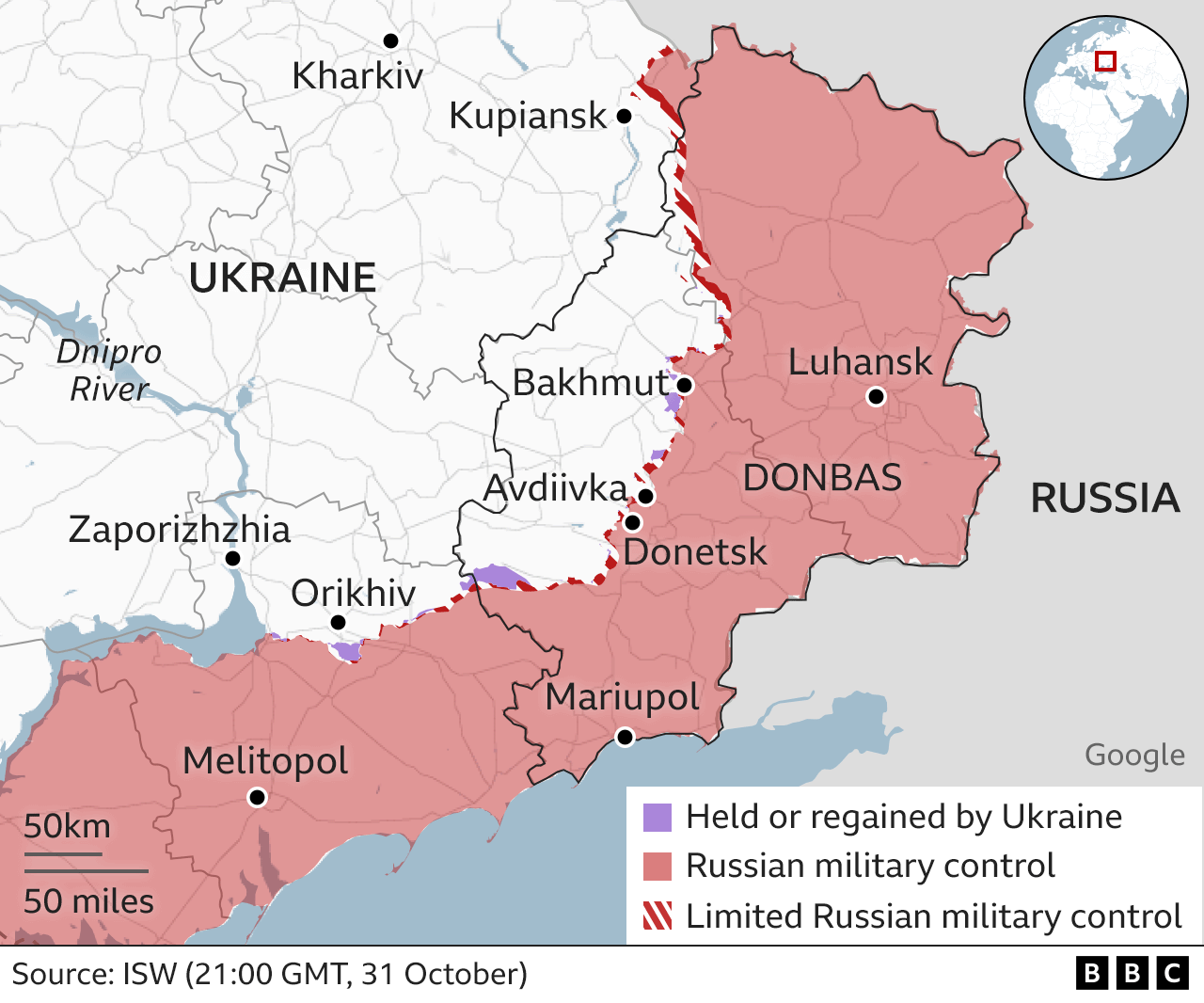
US President Joe Biden’s administration has asked Congress to approve a $106bn package for both Ukraine and Israel. US Defense Secretary Lloyd Austin warned this week: “I can guarantee that without our support [Russia’s Vladimir] Putin will be successful.”
President Volodymyr Zelensky told Ukrainians in an overnight address on Tuesday that “we live in a world that gets used to success too quickly”.
He reserved particular praise for the military’s success in reducing Russia’s control over the Black Sea: “The more protection we have along our coastline and in our sea, the more protection there is in the world.”
Recent Ukrainian attacks have hit the headquarters of Russia’s Black Sea fleet prompting most of its ships to leave occupied Crimea.
Kyiv has tried to create an export corridor safe for civilian vessels to carry grain along Ukraine’s Black Sea coast, via Romanian waters and on to the Turkish coast.
Although at least 700,000 metric tonnes of grain have evaded Russian bombardment in recent months, Ukrainian officials said war planes had dropped “explosive objects” on the expected paths of civilian ships. “However, the functioning of the navigational corridor continues under the aegis of the defence forces,” said Ukraine’s southern operational command.
Russian Defence Minister Sergei Shoigu said on Wednesday that Ukraine was losing the war despite supplies of new weapons from Nato.
He said that Ukraine was taking heavy losses as it tried to push into Russian-held areas of Zaporizhzhia, Kherson and Donetsk and “demoralisation of personnel is growing”. He also claimed Russian units were advancing.
The BBC has no way of verifying such claims.
Biden ‘optimistic’ on returning hostages
The US president also speaks about the 239 people held captive by Hamas in the wake of its unprecedented attack on Israel on 7 October.
We “continue to hold in our hearts hundreds of families and loved ones including small children and elderly grandparents, including American citizens, being held hostage,” he says.
“My administration continues to work around the clock to reunite those families. We’re not going to give up, period.
“I am optimistic but then I am an optimist.”
Summary
- More than 400 people have left Gaza as the Rafah crossing to Egypt opens to civilians for the first time in more than three weeks
- 335 foreign passport holders and 76 injured Gazans have been able to leave so far, Palestinian officials say
- Among those to leave are the first British and American nationals to exit the territory
- US President Joe Biden says the opening of the crossing is the result of “intense and urgent diplomacy”
- In Gaza, phone and internet services are completely cut, the provider Paltel says
- The BBC World Service is launching an emergency radio service for Gaza on MW 639kHz, daily at 1500GMT from Friday
- Israel has been bombing Gaza since the 7 October Hamas attacks that killed 1,400 people with 239 people kidnapped as hostages
- The Hamas-run health ministry in Gaza says more than 8,700 people have been killed since Israel’s retaliatory bombing began
October 30th 2023
Israel’s noose around Gaza City begins to tighten
Paul Adams
BBC Diplomatic correspondent, in Jerusalem
The presence of an Israeli tank on the main north-south highway in the Gaza Strip is surely a sign that Israel’s noose around Gaza City is beginning to tighten.
The tank which fired on a car moving towards Gaza City marks the first appearance of Israeli forces on the road just north of Wadi Gaza.
The tank appears to have moved on, but Wadi Gaza is the line the IDF has repeatedly referred to when telling people living in the northern third of the Gaza Strip – including Gaza City and the surrounding areas – to move south.
It’s clear that as Israeli forces gradually escalate their operations, Gaza City will be a major focus of their efforts.
But with tens – perhaps hundreds – of thousands of people remaining in the north out of fear or determination – it seems the IDF could attempt to cut it off completely.
There are only two north-south roads. Salah-al-Din, where this morning’s incident took place, is the main route. A smaller road, along the coast, can be easily targeted by Israeli warships off the coast.
The area just north of Wadi Gaza is less populated than Gaza City to the north and Bureij and Nuseirat to the south. This would be a logical place for Israel to attempt to sever the Gaza Strip in two.
Summary
- Israeli armoured vehicles have been seen on the main road running from north to south of the Gaza Strip, close to Gaza City
- The Israeli military has said they will not comment on the location of their forces
- But it comes as Israel expands its ground offensive in Gaza, with a military spokesman saying troops killed “dozens of terrorists” during clashes overnight
- Meanwhile, “hundreds and hundreds of patients” are stuck in hospitals in the north of Gaza, the UN agency for Palestinian refugees says
- Doctors say Israel told staff to evacuate Al-Quds hospital in Gaza City on Sunday but that moving patients – many of whom are in intensive care – is impossible
- Israel has been bombing Gaza since the 7 October Hamas attacks that killed 1,400 people and saw 230 people kidnapped as hostages
- The Hamas-run health ministry in Gaza says more than 8,000 people have been killed since Israel’s retaliatory bombing began
October 29th 2023
‘Bye Bye Miss American Pie’ , Problems With BBC & Other Western Elite Media – Comment
By R J Cook.
The difficulty with the following BBC extract of an interview I watched earlier, is that the warning of majpr conflict is true but the concluding advice is nonsense. There can be no doubt that Anglo U.S led NATO has been stirring up hostile forces since the 1990 war on Iraq as a ‘thank you’ for defeating Iran in a vile 7 year war.
International rules of war and humanitarianism do not apply to Britain and America as they are Judge and Jury in these matters which is why Julian Assange is still locked up and forgotten. If International Rules of War applied to them, Amercan and British heads would have fallen. There was so much evidence of war crimes in Iraq -and Afghanistan – including an American helicopter gunship slaughtering innocent Reuters journalists while the pilot sang ‘Bye Bye Miss American Pie’ to the music of his machine gun.
Britain and the U.S have treated Iran with contempt, all the more so because of Iran’s increasing forced alliance with Russia. NATO, with Britain’s then PM Boris Johnson Cheering for war, feigned outrage when Russia responded to the provocation of lining Ukraine up for NATO and EU membership – by reneging on Minsk. The object of provoking this proxy war on Russia for regime change was control of ever more resources, new markets, more asset stripping and control of the Black Sea by taking over the Sevastopol Russian Naval Base to give even better access and control of the Middle East.
The Anglo American elites have always been expert at ‘divide and fool politics’. Britain has pandered to a rapidly growing Islamic population,with vocal liberal lefties offering a welcome to the radical Jihadist Palestiinians that their fellow Egyptian Muslims don’t want because they are riddled with exremists. This is why Israel has an intractable problem that cannot possibly end peacefully if Isarel hopes to survive. Anglo U.S politcians and pundits think the answer is talking this problem, for want of a better word, out of existence.
R J Cook
“We told everybody: support Israel. But you are not supporting Israel by supporting this war,” insisted Jordan’s Deputy Prime Minister and Foreign Minister, Ayman Safadi .
“We recognise the pain of Israel on 7 October,” he said. But he added “you support Israel by supporting peace and only peace will bring support to every Palestinian and every Israeli.”
Asked what Jordan was saying to its allies, including the United States, he said “we’re telling everybody what they need to hear. And we’re telling everybody that if this war continues, it’s dragging the whole region into a regional war whose consequences will be devastating for everyone.”
Lyse Doucet
Chief international correspondent
October 28th 2023
Gaza ‘disconnected from the planet’ but messages of fear still trickle out
Alice Cuddy
Reporting from Jerusalem

A voice note arrives from a journalist in a city in central Gaza, where lines of communication have been almost completely eliminated.
Mid-way through the audio, a loud explosion thuds in the background.
“The situation is very dangerous,” he says, adding that many people don’t know what happened to their relatives overnight.
The WhatsApp voice note, sent from the city of Deir al-Balah, is one of few insights available into what is happening in Gaza – and how civilians are coping since Israel intensified air strikes and expanded its ground operations on Friday night.
Internet monitoring group NetBlocks says there has been a “collapse in connectivity” in the enclave. The blackout means people can’t contact their friends or family – or ambulances to pick up the injured.
Palestinian Minister of Communications Ishaq Sider has said efforts are being made to activate international roaming services in Gaza.
But for now, most people there remain, in the words of one of our contacts, “disconnected from the planet”.
Comment Britain is an increasingly Islamic Country. Crafty elite laws make it illegal to question the increasing influence of the new Islamic ruling religion. People from my generation fought religious bigotry. It is not compatible with science or socio economic progress. It is obviuous that Vladimir Putin et al did the obvious by using friend Iran to open war on a second front. Who can blame him given how NATO set him up for an existential war, with their powers used to renege on Minsk for the purposes of Russian regime change to satisfy their power mania and greed.
The arrogant western elite patronise the far superior Russian culture, acting as if they can dismiss and diminish it as they have done with Iraq – but failing everywhere else excepting an equally religion retarded corrupt Latin America.
Our pampered western elite think they can solve everything with more repressive laws in the name of spurious freedoms and dubious democracy with ever more police and ongoing enhancement of the police state.
The Israel Gaza War will test this to the limit with interesting consequences. U.K’s Labour and U.S psuedo liberal Democrats cannot risk upsetting their massive and rapidly growing Islamic voter populations as they both face elections years. So they are, using so called independent media like the BBC and CNN to tie Israel’s hands in the name of humanitariansm and international war crime laws for which Palestinians have shown no respect. Their excuse is that the Jews stole their land in 1948 when in fact there were no Muslims centuries ago when this land was stolen from the Jews by the Romans.
History has been re written by a new generation of dangerous superficial virtue signalling, not so liberal lefties – which is pumped into young peoples’ heads by brainwashing brainwashed teachers. Life can only get worse and the problem of Islam will never be accepted until it is too late – which it probably is already.
R J Cook
People in Gaza uncontactable and all communication down as Israel intensifies bombing
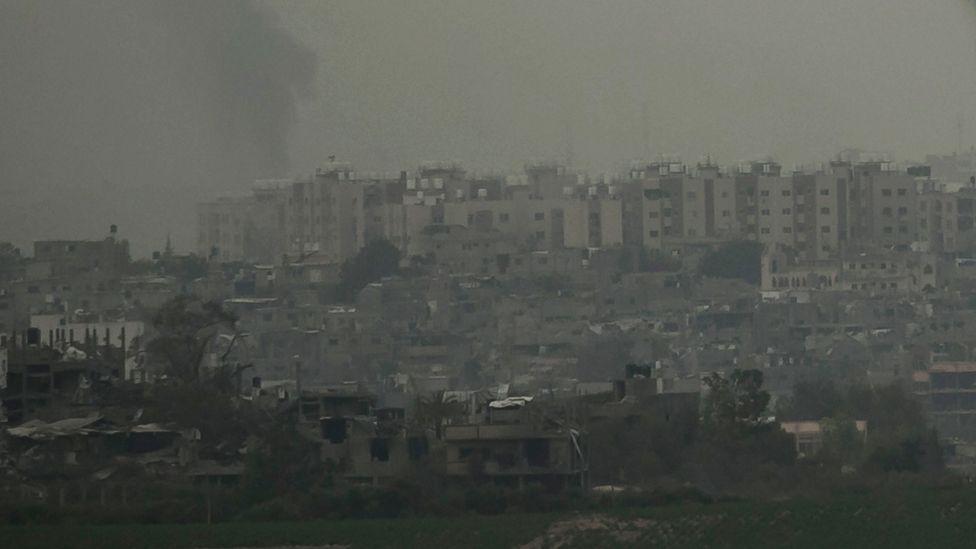
By Tom Bateman & Antoinette Radford
BBC News in Jerusalem and London
There’s been intense Israeli bombardment of Gaza by air, heavier than in previous evenings, while all internet and phone communications appear to be out in the territory.
Israel has confirmed its forces are expanding their ground operations.
The internet monitoring service Netblocks posted on X, formerly known as Twitter, to say there had been a “collapse in connectivity”.
The Palestinian Red Crescent says it cannot speak to its teams in Gaza.
“We are deeply concerned about the ability of our teams to continue providing their emergency medical services, especially since this disruption affects the central emergency number ‘101’,” they wrote in a post on X.
Meanwhile sirens alerted people in southern Israel to rocket fire from Gaza.
On Friday, the Israeli military again told Gaza City citizens to move south after announcing the expansion of its military operation.
In a press conference, spokesman Daniel Hagari said the military had “increased the attacks in Gaza. The air force widely attacks underground targets and terrorist infrastructure, very significantly”.
https://emp.bbc.co.uk/emp/SMPj/2.50.8/iframe.htmlMedia caption,
Watch: The BBC’s Wyre Davies explains the latest developments
“In continuation of the offensive activity we carried out in the last few days, the ground forces are expanding the ground activity this evening.”
Currently we can’t get hold of people in Gaza with communications still down.
For example the BBC tried to send a WhatsApp message at 6.40pm local (nearly three hours ago) – it still just has a single tick meaning it hasn’t been received by the person’s phone.
Mobile phone call attempts just get an unobtainable message.
We’ve had the same for several other call attempts – messages and calls aren’t going through.
BBC Arabic reporter Mehdi Musawi tried to reach journalists and health officials in Gaza all day and could only get short replies on WhatsApp. Eventually, they got through to Gaza’s Al Shifa hospital, but by evening all lines of communication were down.
By then, live footage showed complete darkness across the region. The reporter sent messages to everyone he had spoken to earlier in the day – but they did not deliver.
The panic and anxiety is spreading within the Palestinian diaspora.
For the past 20 days, sporadic, limited exchanges on WhatsApp have brought occasional moments of respite.
However, any extended gap in communication has been met with paralysing anxiety – marked by questions like: “Are they dead, are they alive, was their house bombed too?”
In one WhatsApp group relatives from around the world have been frantically messaging since the blackout.
“Oh my god!!” one wrote.
“It seems a ground offensive may start,” wrote another.
The near-total telecommunications blackout in Gaza risks providing cover for “mass atrocities”, Human Rights Watch said.
“This information blackout risks providing cover for mass atrocities and contributing to impunity for human rights violations,” the group’s senior technology and human rights researcher, Deborah Brown, said in a statement.
The Palestinian telecoms provider Jawwal says there is a “complete interruption of all communication and internet services with the Gaza strip in light of the ongoing aggression,” which it says has cut the “last of the international routes” connecting Gaza to the outside world.
We’ve asked the Israeli military to comment on the communications outage but so far they have not responded.
Additional reporting by Brandon Drenon.
Belfast rally in support of Palestinians hears calls for Gaza ceasefire
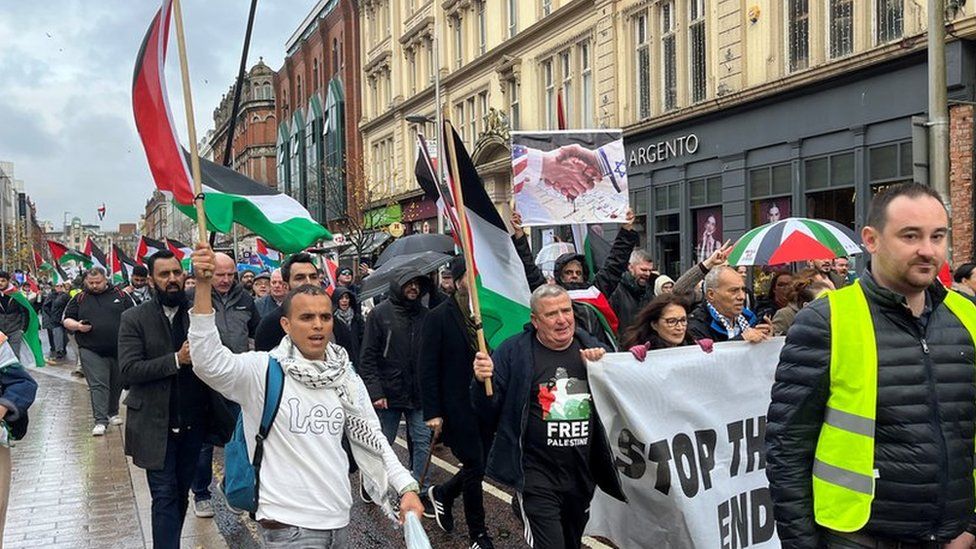
By Mark Simpson
BBC News NI community correspondent
About 3,000 protestors gathered in Belfast city centre for a rally organised by the Ireland Palestine Solidarity Campaign on Saturday.
It follows the upsurge in conflict between Hamas and Israel in the Middle East in the past three weeks.
A number of pro-Palestinian and pro-Israeli demonstrations have been held in Belfast since the violence erupted.
On Saturday protesters gathered at Writer’s Square to show their support for the Palestinian people.
They then walked along Royal Avenue to the City Hall.
Rallies are also taking place in other parts of the UK, including London, Manchester and Glasgow.
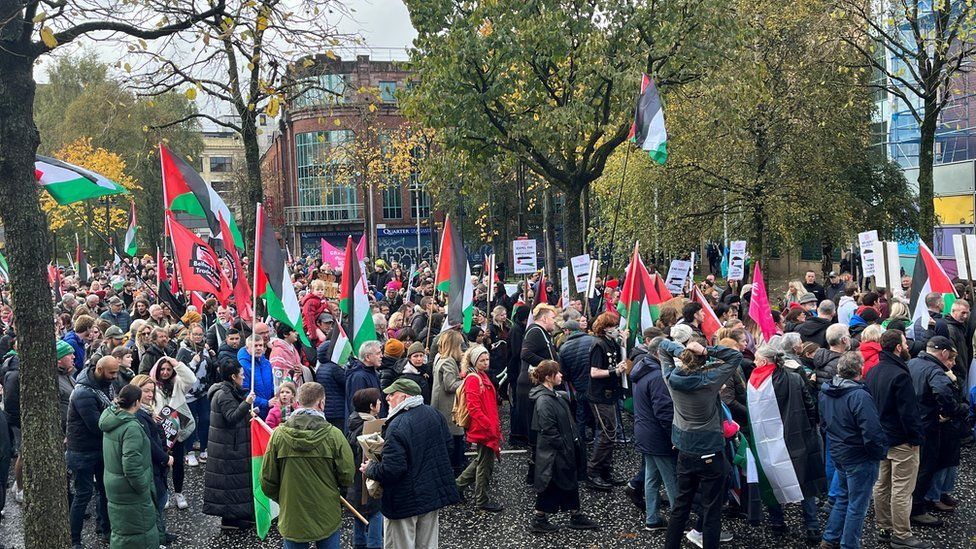
The demos come as Israel expands its strikes, three weeks after Hamas launched an attack on its territory.
Hamas launched a surprise assault on Israel on 7 October, killing more than 1,400 people and taking more than 220 hostages.
Since the attack, Israel has been carrying out strikes in Gaza. The Hamas-run health ministry says the strikes have killed more than 7,000 people.
Speakers at the Belfast rally included Sinn Féin’s Declan Kearney, the SDLP’s Paul Doherty, the Green Party’s Anthony Flynn and Gerry Carroll from People Before Profit.
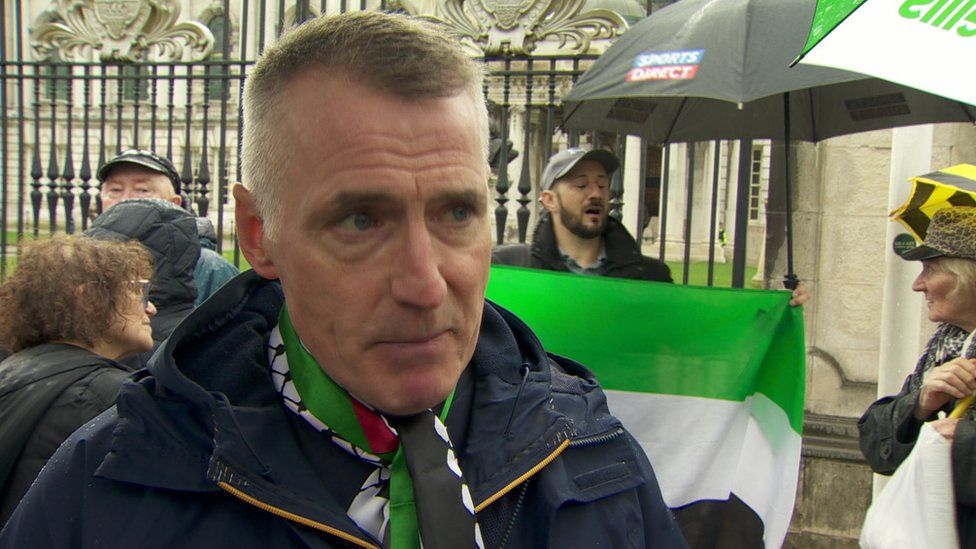
A handful of protesters briefly heckled Mr Kearney, claiming Sinn Féin should be more robustly challenging the US government’s policy on the Middle East.
One man shouted: “This a defining moment for Sinn Féin.”
Stewards asked for respect for all speakers and the heckling stopped.

More on Israel-Gaza war
- Follow live: Latest updates
- Explained: What is happening in Israel and Gaza, and why now?
- History behind the story: The Israel-Palestinian conflict
- Jeremy Bowen: What increased strikes on Gaza could mean
- Hostages: Who are the hostages taken by Hamas from Israel?

Mr Kearney, Sinn Féin’s national chairperson, later defended his party’s policy on the Middle East.
He told BBC News NI: “Sinn Féin’s position is consistent on Palestine and has been for decades. We stand with the Palestinian people, we stand in solidarity with them.
“What the Palestinian people need to hear from Belfast today is an unequivocal assertion that there must be an immediate unconditional ceasefire and an urgent resolution of the humanitarian catastrophe which is taking place.”
His party colleague, North Belfast MP John Finucane, spoke at Saturday’s rally in London.
Calling for an immediate ceasefire and the return of hostages, Mr Finucane said: “The Israeli government must grant access and safety to the UN and other humanitarian agencies to fulfil their duties.”
The first speaker at the Belfast rally was Dr Hani Mahdi, who works in the city and has family in Gaza.
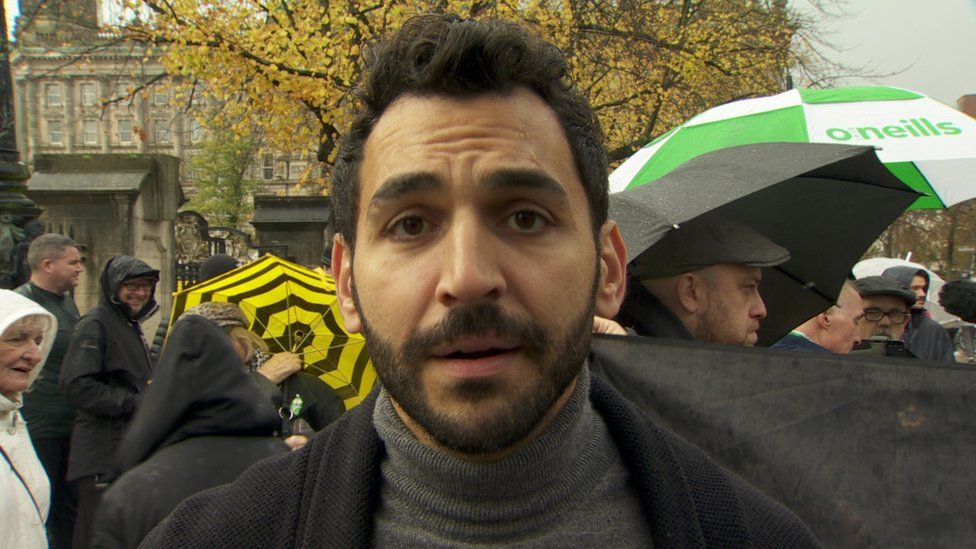
Dr Madhi told BBC News NI that 13 members of his extended family had died in Gaza in recent weeks.
“I don’t know what’s going on with my remaining family members because the communication in Gaza is cut off,” he said.
“We need there to be a ceasefire, we need there to be peace.”
Another speaker was the Rev Bill Shaw, an ordained Presbyterian minister who now leads a community development organisation in north Belfast.
In Dublin, several thousand people gathered beside the United States embassy on Saturday in protest at US support for Israel, accusing it of complicity in Israeli attacks on Gaza, Irish broadcaster RTÉ reports.
The protests follow similar rallies in Britain and Ireland last weekend.

Be the first to comment on "Exceptional Powers – Anglo U.S NATO Elite Tyranny V"